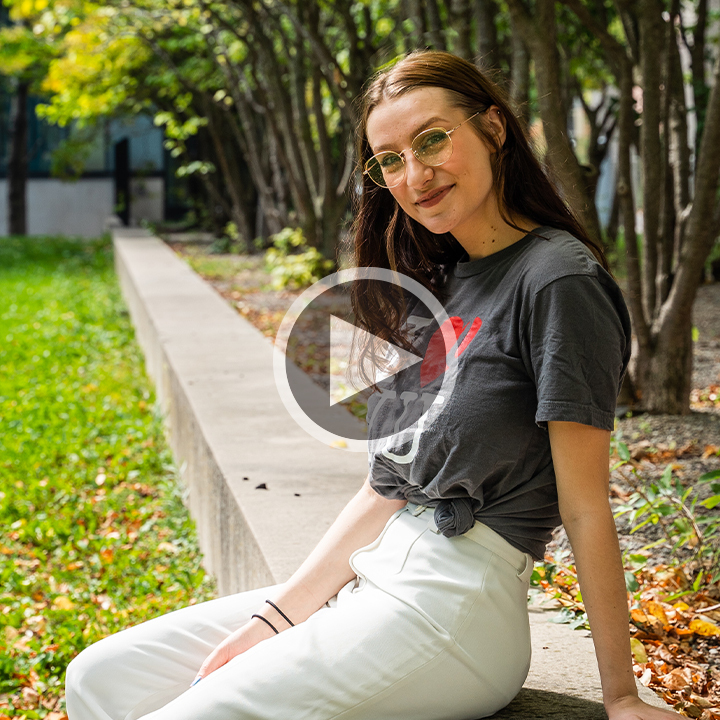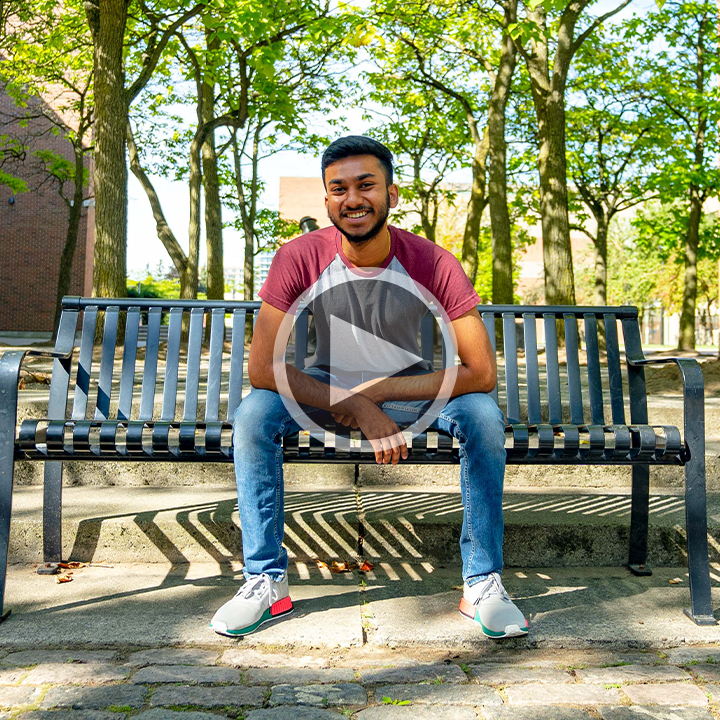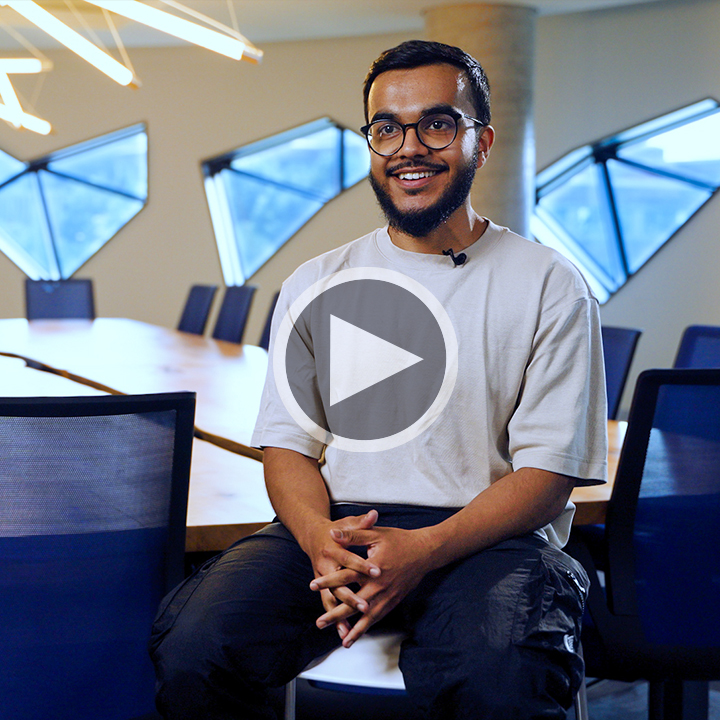
What drives my passion is giving back to the community.
Rayyan Ahmed is a first-year Computer Science student and a recipient of the Lassonde Scholarship. He earned a second-place finish at the Ontario Engineering Competition and went on to represent York nationally. Rayyan aspires to complete a master’s degree at York, specializing in Machine Learning.
Read Rayyan Ahmed's full story
Rayyan Ahmed
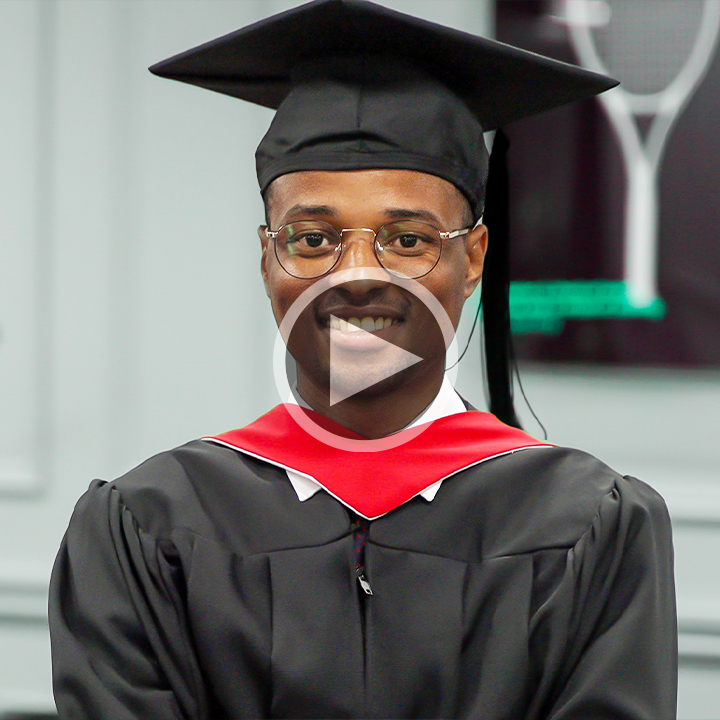
Always follow your dreams. Put in the hard work. Always show up. Never give up.
A remarkable story of resilience, perseverance and passion: From living on streets and in youth shelters where they didn’t feel safe, to working midnight shifts, Mahamat and his brother have overcome many challenges to be where they are now. The brothers arrived in Canada at the age of 18 and 20, in 2016 and decided to start their new chapter in Montreal, a natural choice for the native French speakers.
Read more about Ahmat at News@York.
Ahmat Nokour Mahamat

We have one plant, one health. The health of the planet is our health and there is no planet B.
A long-time York University professor will join the Ivy League this fall, having been awarded a prestigious visiting professorship at Yale University.
Dawn Bazely who was the first in her family to go to University, is now a Professor in the Department of Biology, Faculty of Science, has been named this year’s recipient of the 2024-25 Fulbright Canada Distinguished Visiting Professorship, the foundation’s top Research Chair.
Dawn Bazely
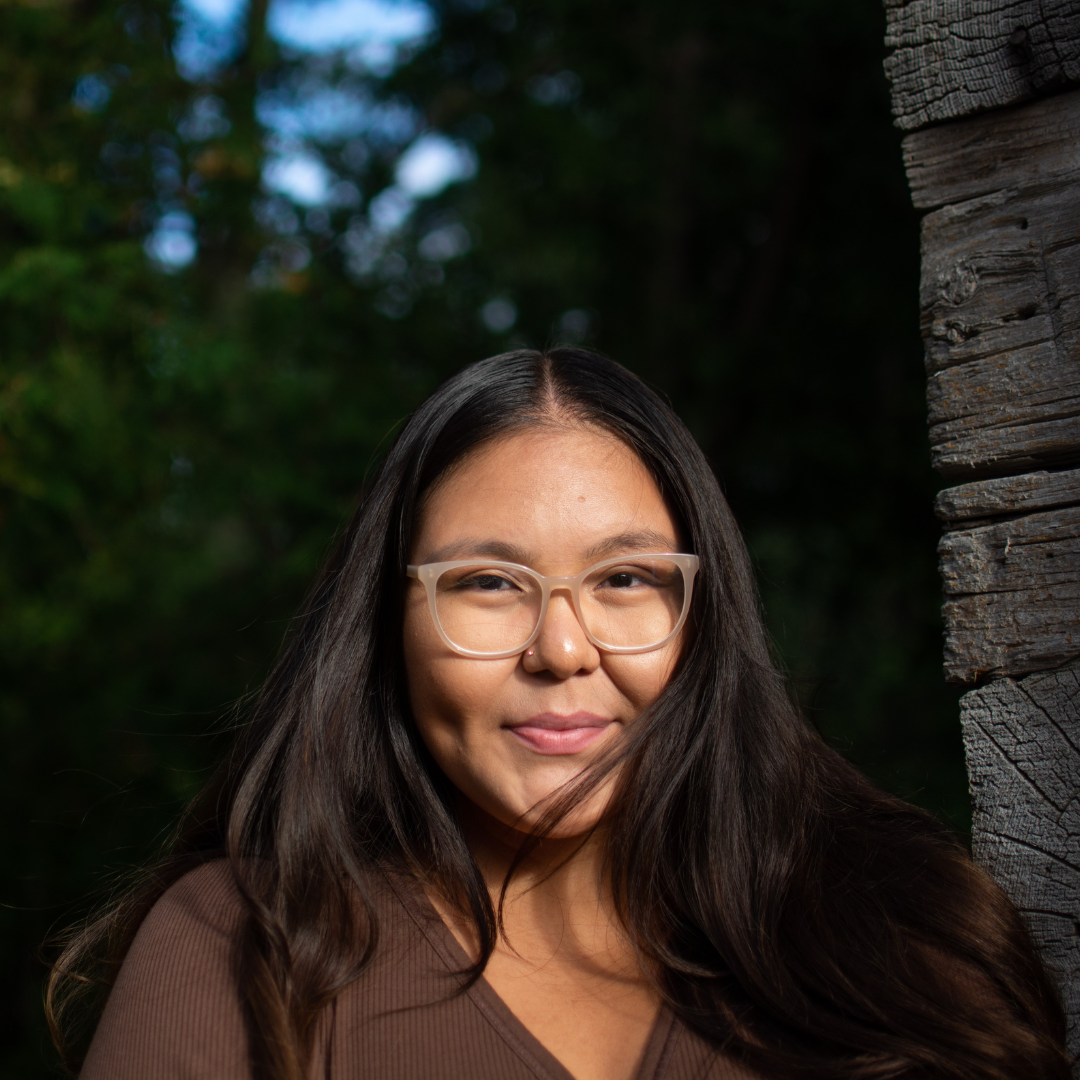
Throughout my life on the reservation, I spent a lot of my youth traveling with my dad all over Turtle Island helping him conduct ceremonies. I love to travel and every time I’m on a plane or in a car, taking a road trip, it just feels like home. I feel my inner child is really happy, just like it was when I was going on a trip with my dad. It brings me a lot of comfort.
I was born and raised in Treaty 6 Territory, otherwise known as Saskatchewan. Specifically, I’m a member of the Sturgeon Lake First Nation in Saskatchewan. My roots come from my father’s ancestry, which is Plains Cree, Sioux, and Dakota, extending from the USA. My mother’s ancestry is Plains Cree.
I’m a current 2nd year Psychology student within the Faculty of Health. I decided to leave my community and my family to access a better education, among other opportunities, at York University. I chose this university when I was doing volunteer work in Peterborough, Ontario with a national experience called Katimavik when I was 18.
I’m really passionate about leadership, activism and helping people; particularly about Indigenous research and Indigenous communities. I got involved with The Centre for Indigenous Knowledges and Languages (CIKL) when I was searching for work study positions. I knew it was a place I wanted to work, so eventually I started a position as a Special Projects Assistant.
My experience working with CIKL has been amazing. My coworkers and associates are fantastic, and I’ve received many opportunities. I was given the freedom to do research on Indigenous communities, such as languages, Indigenous planning systems, and the smudging program. I’ve experienced myself grow more while being within this position than I ever thought imaginable. I’ve also become more interested in research, which wasn’t the case before, and pursuing graduate studies.
The smudging program came to be when I was researching Indigenous medicines and how they were used. I wanted to create a new space and environment for Indigenous students, staff and faculty, including non-Indigenous people to convene, and be able to learn or practice decolonization. The program will hopefully always be there to support and help others, as well as ensure they have a safe space on campus.
I’m using the smudging program to create accessibility for students, staff, and faculty who want a safe space on campus which allows them to have access to traditional medicines. Through my need for helping people and my passion for leadership, especially within my position on CIKL, I’m building a program which I believe is the first of its kind at the University.
In addition to the work I’ve done with CIKL, I’m the Vice-President at the Indigenous Students Association at York, a President’s Ambassador, SHAY Ambassador at the Faculty of Health, and in the Promotions Committee of the Calumet College Council. I’m also a Project Leader at an Indigenous student group and non-for-profit, Learning Spirit Alliance. The goal is to fight food insecurity for students on campus by providing them with educational opportunities about Indigenous food sovereignty.
I’m confident that through everything I am doing, I’m working hard to create a positive change. It’s something that I’ve always dreamt of since I was a little girl living on the reservation in the middle of nowhere. I owe it to myself and my family to create this positive change, especially to help people and help my community.
Now, I’m living in a big city and a lot of, I’ll call them res kids, can’t even imagine that they can do that. I never thought I could. And I guess I’m doing it for all the little kids, showing them that you can actually make change and if you’re committed to something you can obtain it. You can do anything! So that’s something that motivates me, my inner child living on the reserve. My inner girl is always here and that’s beautiful.
Rainingbird Daniels

The key is to stay determined and stay focused on your goals. Stay grounded in your goals.
Mahta Gharaei

Just a few people can have a positive impact in your life. I wanted to also become that person that could make a positive impact in someone else’s life.
Steeve Otoka Eyota
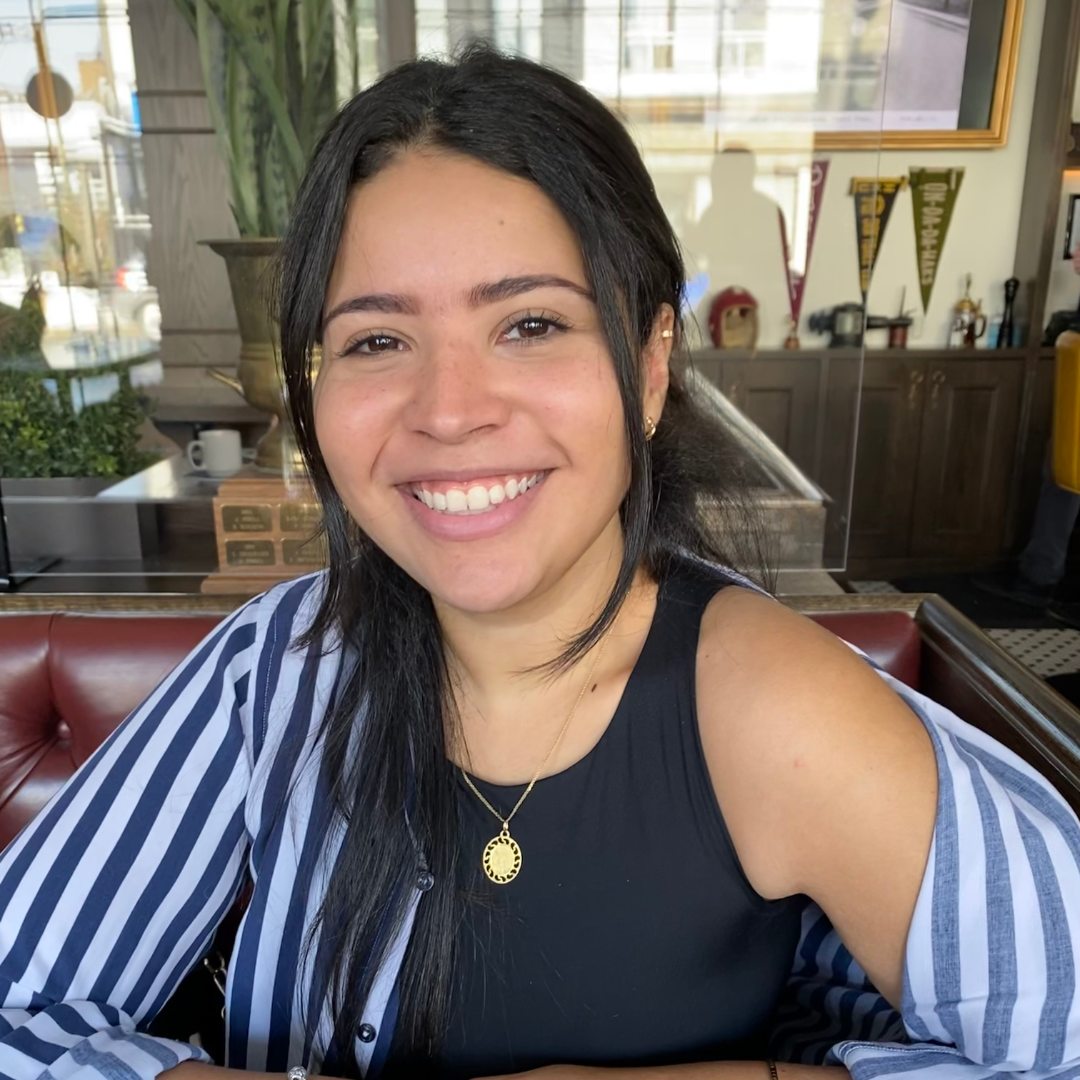
I arrived in Canada in 2017 as an international student with the goal of learning English, that was my goal. I quickly fell in love with Toronto, the people and everything in between, so I decided to stay. Following the English program, I started my studies at Centennial College within their International Business – Business Management program. I graduated from that program in the middle of the pandemic, and directly transferred to York University.
At York, I am currently enrolled in the Commerce program, specializing in marketing. Upon starting my studies, I became involved in the marketing clubs, this was my first introduction to university life. Shortly after, I obtained my first job in the marketing field as there were various options from internships to part-time jobs for students to gain experience in their fields; from content writing to social media. Through Career Education & Development, I applied for a digital marketing position which I successfully obtained and that is where I work today. I am a Communications & Marketing Assistant at Vice-Provost Students, York University.
I love the work that I do at York University. I’ve learned a lot, not just about digital marketing but how to conduct myself in a professional setting. When I first started in this position, I didn’t know much about digital marketing besides what I had learned on my own. To me though, having this job was major because I knew I was going to get an insight of what my career would be like in the real world, from talking to professionals in the field to doing work that made a difference in a professional setting. The Valentina who started this job at York is very different than who I am now, personally and professionally. I know where I want to go and have a stronger and more concise idea of marketing. I recognized that marketing could be practiced in many ways, and this position really helped me narrow down what I’d like to pursue. In the future, I’d ideally like to keep working in marketing within higher education. I hold my experience as a 17-year-old who moved to Canada to learn English very close to my heart, so I’d like to support that side of higher education within my work.
Outside of the academic and professional experience I have gained during my years at York, I really enjoy being back on campus and value the human interaction of the experience; especially after starting my studies when everything was online in 2020. I encourage students to get involved as there are so many opportunities within York. If you do not look for them, you may never know that they are there; and trust me, they are there. Also, because you are a student there are so many people that are willing to open the doors for you. As I pursued the opportunities available, I now have a lot of friends, know my way around campus, and am very involved within the community – these are elements of my experience I’m going to remember with love and affection once I graduate. Through these experiences, I feel like I am an integral part of York’s community.
Valentina Cotes is an international student from Colombia who came to Canada five years ago. After ontaining my International Business Diploma at Centennial College, I decided to transfer to York University to pursure a Bachelor of Commerce Degree and specialize in Marketing. York has given Valentina not only the necessary knowledge, but it has helped her to advance in her career as a young Marketer. Thanks to York University and the opportunities she has found here, she feels more confident about facing any challenges post-graduation.
Valentina Cotes Ebratt

It’s an amazing experience to return to York, and I’m just grateful for everything it’s given me back and, you know, the memories I’ve been able to create, the friendships I have been able to create.
My experience at York University definitely helped shape my career in the way it helped me mature as an individual. I think it definitely helped me understand how important responsibility is. To make sure that you are meeting the standards you’ve set out for yourself.
I’m very excited to be able to represent Canada at a World Cup, and it’s an experience of a lifetime and I’m just grateful to be a part of the historic team that’s brought the country to the World Cup.
Mark-Anthony Kaye is a former York Lion soccer player and midfielder on the New England Revolution team. Mark-Anthony, born in Jamaica, recently represented Canada at the 2022 Fifa World Cup.
Read Mark-Anthony's full story
Mark-Anthony Kaye
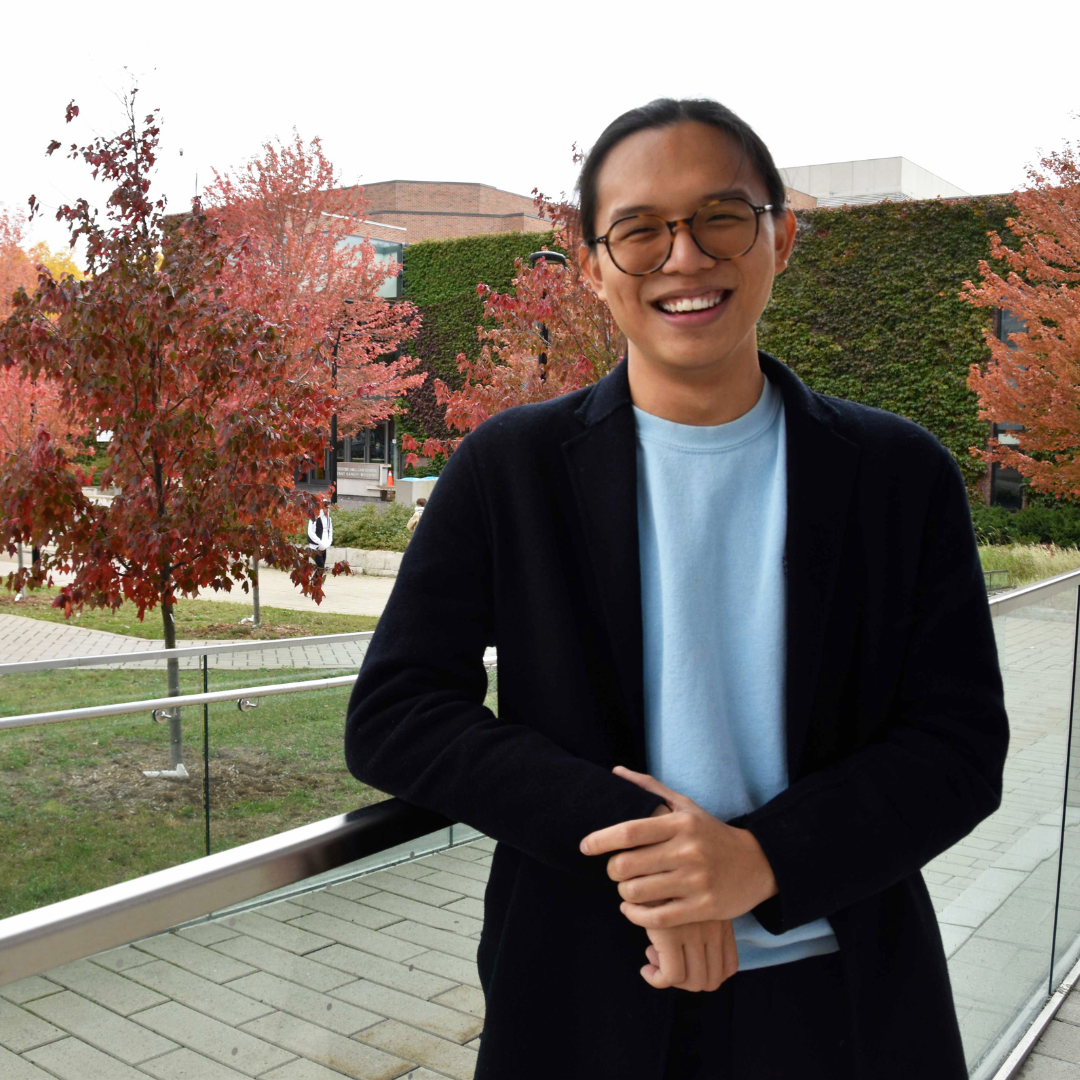
I am an international student from Malaysia, and came to Canada about 4-5 years ago to study one year of English with the goal of transitioning to York University. English is not my first language, so when I came to Canada, I had to learn everything. I only knew the basics. As a result, I experienced a lot of struggles during my first year however, York provided me with a solid support system. I am now in my fourth year of the Commerce program in the Faculty of Liberal Arts and Professional Studies doing an specialization in Accounting.
My first year was a transition period for me. In the beginning, I spent most of my time at home, in lectures or at the library – it was kind of boring. One of my residence dons recommended a few ways to get involved, so I began volunteering at a student club called “Entrepreneurship Development Association” under New College. From there, I built a community of friends, joined orientation, and all the YFS hosted events. I wanted to be there, to be present.
By putting myself out there, I created a community of people I really connected with, and it produced many fond memories. As the years progressed, I achieved executive positions within the student club and during my third year, I became Co-President. This type of involvement laid the foundation for me to network and connect with resources throughout the University. To me, networking is more than solely speaking to professionals in your field or industry, but rather it is about connecting with people who may be going through the same experiences as you. This gives you all the chance to grow together, as well as share experiences and opportunities with each other.
I also started volunteering at various places, such as by being a Peer Mentor at New College and York International. One of the highlights of giving back to the York community was when I helped host a “Women in Entrepreneurship” networking event as it helped bridge the gender and racial gap within industries and empowered students to start their own businesses. As a York student, you can start anything, and the University provides you with a bridge to connect you with like-minded people to mentor and inspire you.
All of the social and community-based experiences I’ve had at York have contributed to my professional and career aspirations. I came into my first year as an Undecided Major and then transitioned into the Commerce – Marketing Specialization program. Between learning English, I didn’t do as well as I could have done. After speaking to my professors and TAs, I realized that Accounting would be a better fit for me. I put myself out there and figured it out, and from that came growth. York University gave me the safe space to learn and grow from my mistakes.
My goal before I graduate from York is to leave an imprint. Through my position at York International, I support students and make a positive impact within their transition period into university and empower them with the knowledge that we are here to support them. I trust that as I do this work and focus on my personal goals, I will leave a legacy and a positive impact on the York community.
Eugene Ting is in his final year at York University studying Accounting, Commerce. Being an international student from Malaysia, I have always felt the pressure of living up to others’ expectations without figuring out the purpose of my work, passions, and goals. Therefore, given a space to create my own path through leading an entrepreneurship club, being a Peer Mentor for New College and York International, Orientation Leader, and my work-study positions as a Student Lead for the Global Peer Program has defined the years of my journey here at York University.
Eugene Ting
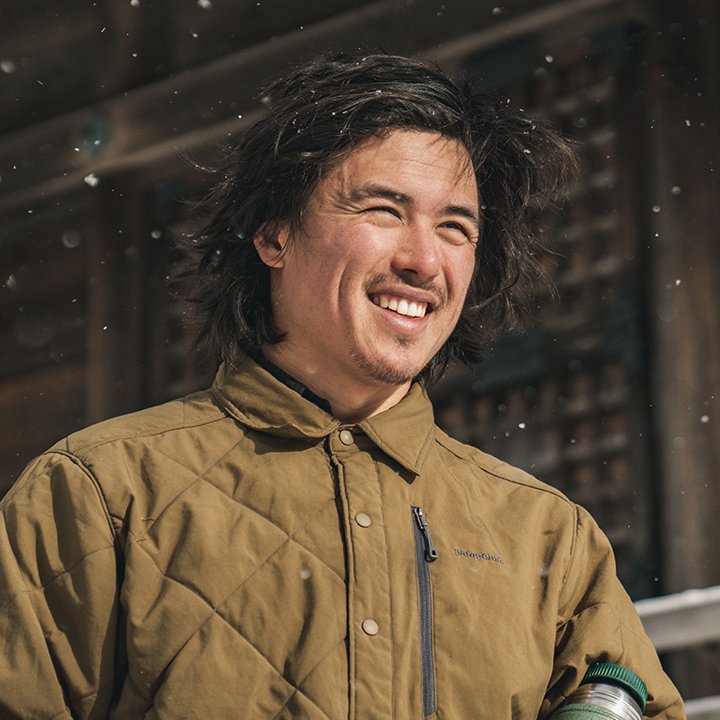
I didn’t plan on being a documentary filmmaker. I didn’t plan on being an activist or community organizer either, but it is funny how things work out. My parents were a big part of sparking my love of being in the mountains and back country skiing. It became an obsession, and I was a total adrenaline junkie. Growing up, we were involved in snowboard movies, and through those experiences of being around cameras, you see how they function, and you also see the power of film as a medium.
I grew up in the Coast Salish territory in Vancouver. But my roots from my dad’s side of the family are from Chile, and my mom’s side of the family is from Kumamoto, Japan. I always joke that those two skinny countries got together and made me. When I was young, my dad passed away, and when something like that happens you reassess what you’re doing, you ask yourself what truly matters, and those type of moments really make life feel finite; it kicks your butt into gear. For me, it was asking myself what am I passionate about? What am I going to do on this short little stint on planet earth? I’ve always been passionate about going down to Chile, snowboarding, and seeing family. The effects of climate change down there, especially with melting snow in the Andes and the droughts, all the impacts that I was seeing first-hand on my travels down there, it was an issue I wanted to get involved with and start organizing around it.
About 11 or 12 years ago, a group of my friends and I got together and started a project called Beyond Boarding. Our goal was to integrate our learnings through organizing and reflect it back to the community that we grew up in and raised us, the outdoor crowd. Beyond Boarding integrated snowboarding into a bigger picture issue, it played a foundational role in people and made a big difference in their life. While we were snowboarders, this transition time was where we found ourselves as community organizers. At Beyond Boarding, we have a non-profit branch which runs some of our youth programs, but it is primarily volunteer based. We also do youth land-based programs and through those filming experiences we’ve been able to connect with Indigenous communities along the coast. Most of our projects stem from friendships and relationships that we build along the way.
Northern Grease was one of the first films we did alongside my friends Jasper Snow-Rosen and John Muirhead. We converted an old school bus to run on waste cooking oil and went on an 8-10 month trip all over BC. We connected with a variety of communities and spoke to people about the social impacts of oil and gas, stemming from the natural gas proposals in Northern BC and tar sands. It changes the local communities; from the violence it brings to communities to the increase in high school drop-out rates.
Our latest film is Klabona Keepers. This film took 7 years to make, and it premiered as an opening night film at the Human Rights Watch Hot Docs event in Toronto. My biggest hope was to share the resilience and the strong heart of the elders and how they pass down these teachings to the next generations, I wanted to make sure those stories were shared and told.
The focus of completing my MES at York University has been on action research within the field of impact producing in so-called Canada. Therefore, I look at how film production integrates into community, movements, and society to create change. So rather than measuring success simply through the number of attendees, we measure success by how likely attendees are to feel activated by the films. Once I’m done with my MES studies, I’m going to double down to launch a campaign for the Klabona Keepers film and expand to another campaign with “No Visible Trauma”, which is a powerful documentary covering police brutality in Calgary, Alberta.
Tamo Campos is a filmmaker, impact practitioner, community organizer and extreme sports athlete. His films include The Klabona Keepers (2022), Ru-Tsu (2020), The Radicals (2018), A Last Stand For Lelu (2016), Northern Grease (2013) & over fifty shorts. Tamo embeds himself in the community wherever he goes and is dedicated to combining social impact with his adventures in sport, activism, and filmmaking. His previous projects have had a strong outreach focus that collaborated deeply with participants within his films. His work has focused on Indigenous land defense, Indigenous health models, climate justice and anti-racism. He is also the co-founder of the nonprofit collective Beyond Boarding, a board member of Rediscovery International, and recently finished his Masters Degree with York University with a focus on Canadian Impact Producing. Campos is also currently an Impact Fellow for StoryMoneyImpact, a Canadian organization growing the field of Impact Producing.
Tamo Campos
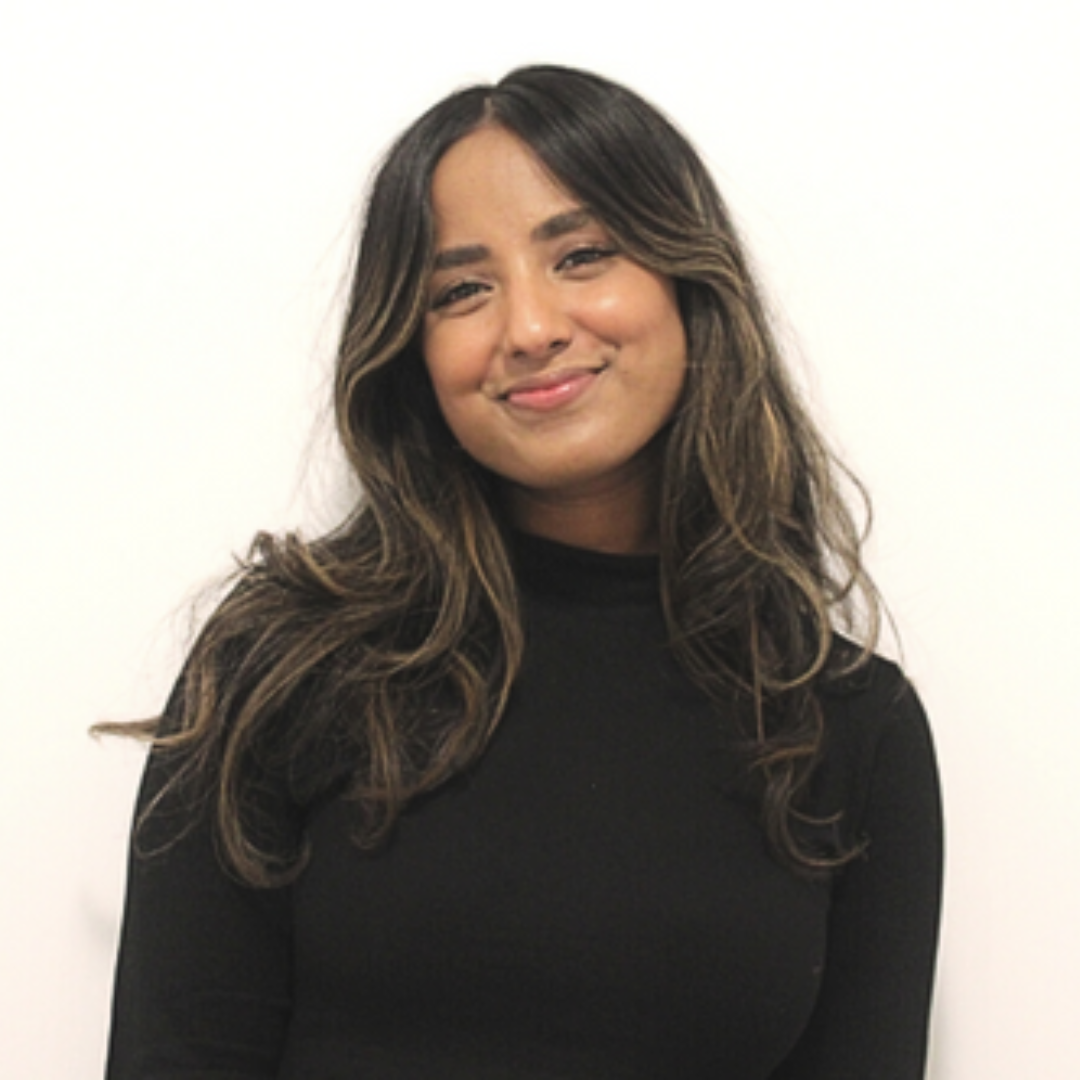
I started studying Financial & Business Economics at York University in 2018 as an international student. One thing that was important to me at the start of my journey was to be involved within the community. Right away I made it a priority to be part of a couple of clubs.
In my second year, right before the pandemic, I learned about the work-study program. I applied to a couple of different options and got accepted in the Faculty of LA&PS. What I loved about the work-study program was how I could balance school, gain professional experience and earn at the same time. As an international student, supporting myself financially was key so having work blend into my day-to-day helped incredibly. I was also able to make a lot of connections, and those are the connections who helped me get to the job I have now. As I wanted to continue working in marketing at York, the job opening at YSpace was an excellent opportunity and fit.
YSpace is the innovation hub of York and it supports entrepreneurs within the York community and fosters partnerships which the University has. As I am the Marketing Coordinator there, my responsibility is to ensure that marketing strategies are streamlined, support various social media accounts and engage audiences within the different groups which YSpace serves.
In addition, I am a fitness influencer and and this came from my involvement in extra-curricular activities while I was a student at York. With my content, I try to be motivational and inspire my audiences to prioritize self-care and their mental health. The University is an integral and foundational place for inspiring this journey, and why Tait McKenzie is really close to my heart. Tait makes it comfortable for students to experience, or give a chance to, their passions and that’s important. It is an open and supportive community, and my favourite thing about York during my studies.
As an international student, I had a hard time in the beginning with giving myself the opportunity to branch out and create my own networks. I gave myself the push to experience new things by setting the goal of trying one new thing a month. It was very scary at first, but I focused on going through with the commitment I made. From there, I made connections and nurtured relationships with every opportunity that came my way. Being part of the community is so important. The connections that you make, and fostering those relationships, help you transition to what you want to pursue after graduation.
Lamisaa Mahmud moved around a lot while growing up, from Bangladesh to Australia and Dubai, finally making her way to Canada to pursue her Bachelor’s Degree. Being an international student came with its challenges, but she used it as my motivation to make an impact in the lives of those around her so that they could have it a little easier. Thus began Lamisaa’s journey to support other international students through their transition as an International Student Success Ambassador at LA&PS, York University. Her desire is to continue making a difference in advocating mental health and living a healthy lifestyle through her personal social accounts. Lamisaa is highly motivated by helping others and hopes to continue doing so in the future through all her endeavors.
Lamisaa Mahmud
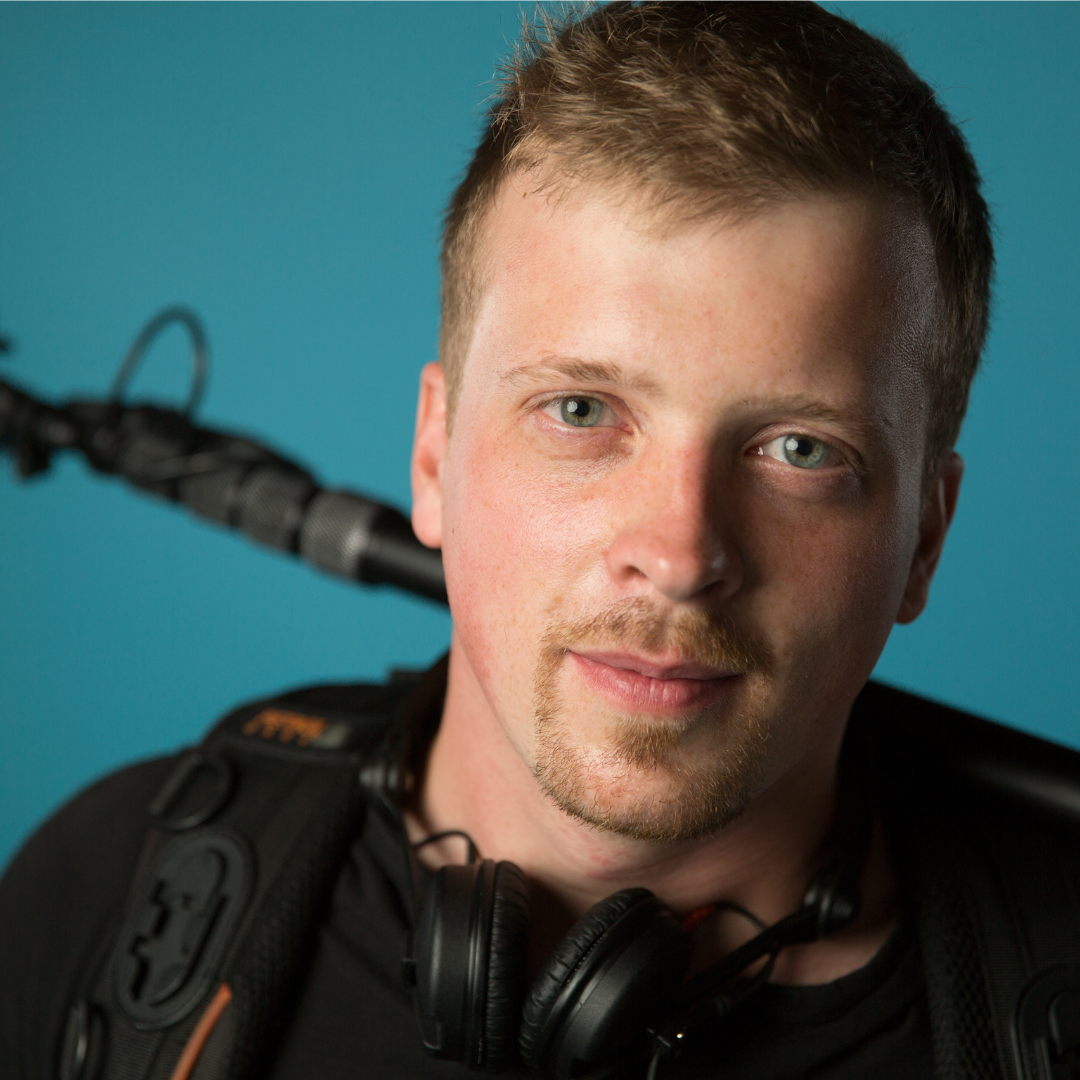
I remember applying to York University during my last year of high school. I had a interest in medieval history and paramedicine, but film was my real passion. When I saw the application pool for the Film program, I was nervous as only 50 get in out of thousands of applicants.
Going through the application process was amazing. Every time I went through to another round within the application process it felt like being on “America’s Got Talent”. When I finally met with professors, I shared with them my love for film, sound and music, among other things, and shortly after I found out that I had been admitted to the program. That day, I was crying and my mom, who supported me through the application process, was also crying – I did it!
During my first year I got involved with Tatum College, frosh week, student counsel and everything in between. When it came to my studies, it became clear I wasn’t going to be a director or cinematographer, but I did like sound from my experience in being in my high school’s band. During my first audio class, I would sit in the sound booth for hours, doing layers, working on music, and more. At York, the Sound Program is run by Professor Steve Monroe and he is an incredible mentor and fantastic professor. Steve really ignited my passion for sound, he would say “I’m here to teach you, I’m here to help you get better, and I want you to succeed in this”.
Through the program, York gave me the tools, training and real-life experience to pursue sound in a professional capacity. As I progressed through the program, others recognized I was good at it. Within the Film program, as soon projects begin filming, you can work on multiple films at various levels; from students in different study years than you to different genres. You get real-life trial and error experience. York also gave me access to top tier equipment, I was working on sound devices equipment and great labs, and I had this entire equipment shop available with instructors and other people to be able to help me with it.
During my time at York I was able to save enough money to purchase my own equipment, and following Steve Monroe’s guidance, I made the decision to launch “Adam Clark Sound”. I had a team of people working with me and it allowed me to gain people management skills, negotiations and other business-related skills. I specialized in digital media, linear with the rise of YouTube marketing. Soon after, I met my now business partner, Aaron, who is a post-sound designer while I am a location sound recordist by trade. We eventually made the decision to formally partner as we complimented each other well professionally, and that’s how Toronto Sound was born.
In the film industry, if you’re good at what you do, and you’re organized, then you can take leaps. At Toronto Sound, we’ve worked on a variety of outstanding projects, from Drake’s music videos to WestJet commercials. Most recently, we worked on a film called Scarborough which lit up the Toronto International Film Festival. My days at York taught me to put my best foot forward regardless of the situation, even when I’m exhausted from a long flight or working a super long day. I recognize that I am a representative, not just being trusted by the University, but in the sense of my own willingness to be positive and passionate about what I do. Since leaving York, I’ve started a scholarship through McLaughlin College, lectured on campus, and am happy and willing to support any way I can when York calls on me. York gave me the opportunity to find out who I was, but more importantly, empowered me to be myself and show the world what I can do. In addition, York lit the passion for it and it is my duty now to keep that passion going and show others all that you can achieve when you pursue your passions.
Adam Clark is a veteran in the film/television/documentary and commercial industry in Toronto. With an honours Bachelor of Fine Arts in Film Production from York University, Adam has more than 10 years of international industry experience under his belt as a location sound recordist and over 1000 credits to his name. Within the industry, Adam has earned a strong identity for excellence within Toronto’s film and sound industry. Adam is the co-founder of one of Toronto’s leading providers of post and location sound — Toronto Sound (www.torontosound.ca).
Adam Clark
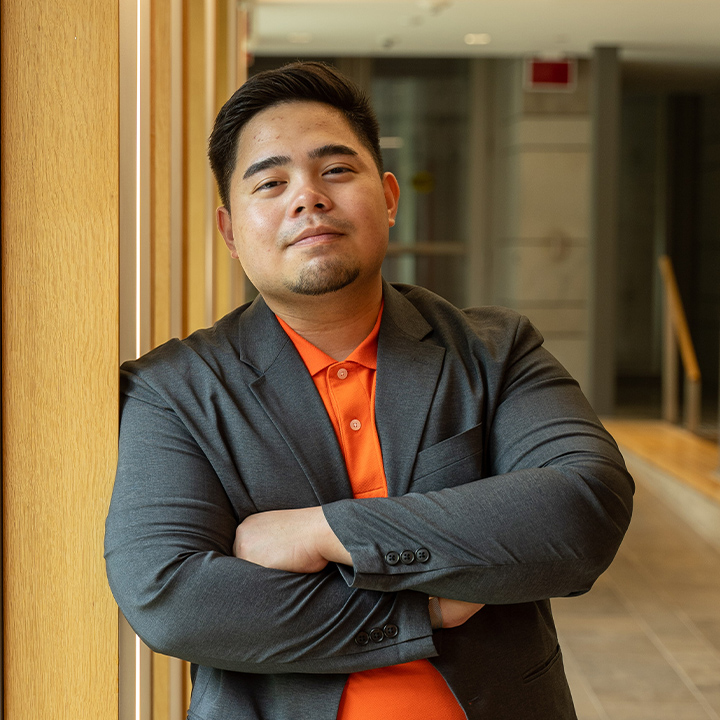
Revill Villanueva is a visual artist whose work investigates the ancestral and cultural aesthetics of his heritage as a Filipino descendant in search of belonging and identity. He examines the consequences of post colonialism in the Philippines and within the Filipino diaspora, which are impacted by the colonial practices and principles of Spain and the United States.
His artwork delves into the themes of labor exportation, immigration, generational trauma, and search for identity; therefore, his art practice is mostly inspired by his experience and the stories of second-generation Filipino youths in Toronto in search of belonging and a sense of community. Revill uses science fiction, futuristic aesthetics, and traditional Filipino semiotics to reimagine the Filipino community in the distant future and convey personal narratives as an immigrant living in Canada and a diaspora artist.
Villanueva’s interest in art began at an early age, and at the age of 9 he participated in editorial cartooning and poster making competitions. He also pursued performance, particularly acting and singing, which led him to the Theatre program at York University. Overtime, he continued to pursue art and explore a variety of mediums, such as oil painting on canvas, sculpture, and photography, and immerse himself in the Toronto art community.
In 2019, during a trip to the AGO on his birthday, he got a calling that would change his academic and career path. A distant friend called him to wish him a happy birthday and their words made Villanueva consider a transfer from Theatre to Visual Arts to pursue his true passion. In addition to following his passion for art, Revill hopes to be the representation for Filipino artists and break stereotypes within the Filipino community.
In the summer of 2022, he participated in the “X Marks the Spot” exhibition at FilipiNext, a conference about Filipinx Studies emerging from Canadian contexts. This is one of the many opportunities which he has participated in guided and facilitated by the faculty at AMPD at York. His professors noticed his work, enthusiasm, and commitment which led to additional opportunities to be immersed among the art community. To highlight how York University has contributed to his journey as an artist, Revill has featured the University in his work; such as a futuristic version of the York University Subway Station in Perlas de Pilipinas (2023).
Following graduation, in June of 2023, Villanueva plans to return to the Philippines to relive his past, immerse himself with the culture, reunite with childhood family and conduct research on aesthetics of the Philippines, particularly in the Visayas region of the Philippines where he is from. Following his journey at York, he recognizes how open minded he has become and how his academic experience has strengthened his critical thinking skills. Therefore, going back to the Philippines will provide him with a whole new experience through a newfound lens.
Through his research on Filipino aesthetics, he hopes to generate space for Filipino visual culture through his art. He is actively listening to the struggles of the Filipino community, particularly with their experiences in immigration, family separation, generational trauma, and impostor syndrome, and uses the gallery spaces in York as a pedagogy and to shed light on our history and culture in the Philippines and for Filipinos. Representation matters at York as it inspires those who have historically been on the margin in Canadian society to be seen and heard through research and creativity.
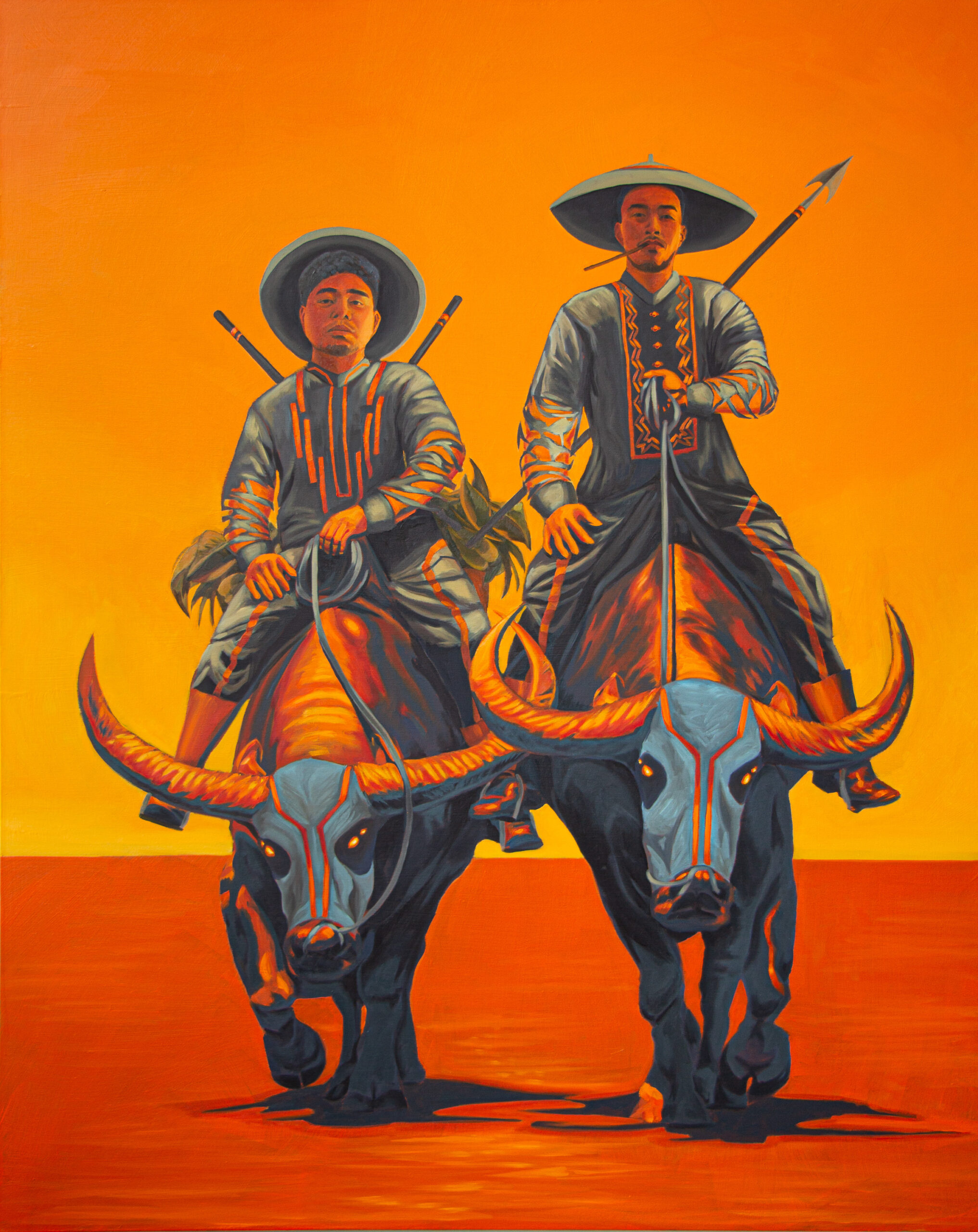
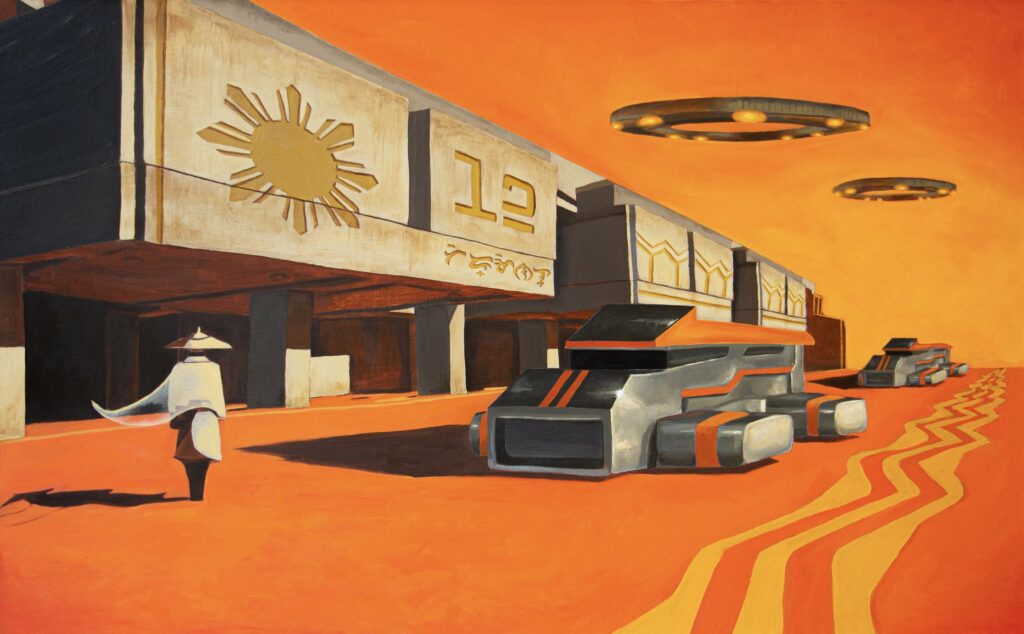
Terminal 12 (2022), Oil and Acrylic on Canvas 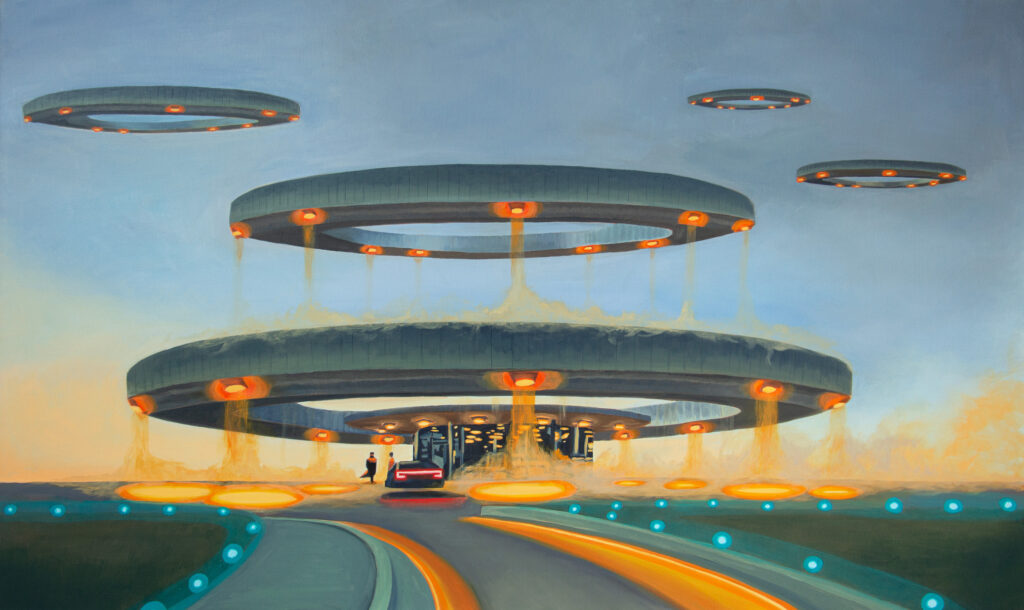
Arriving at Kennedy Station (2022), Oil on Canvas
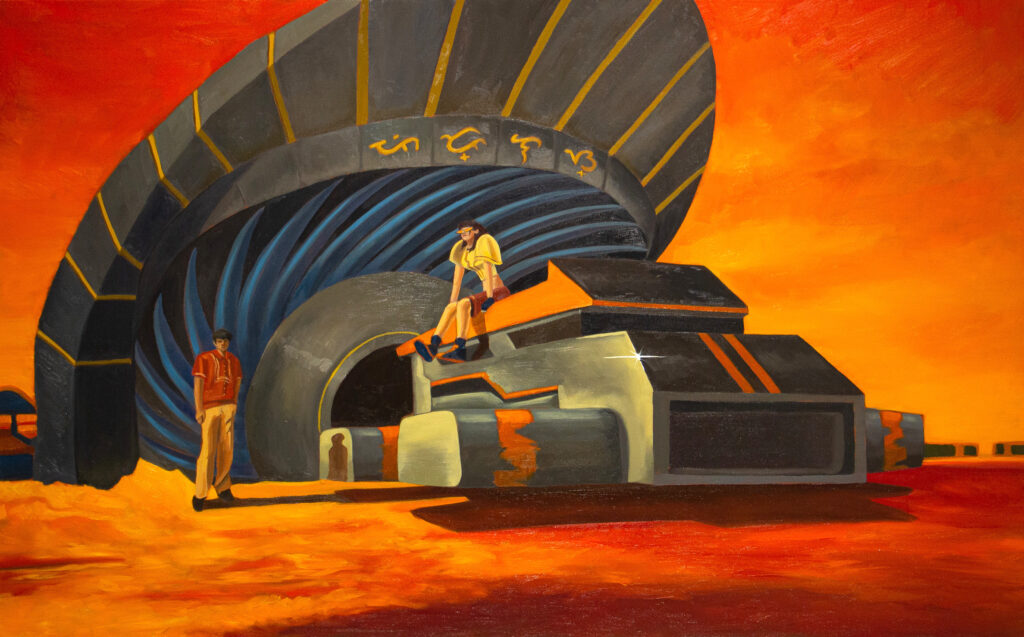
Perlas de Pilipinas (2023), Oil on Canvas 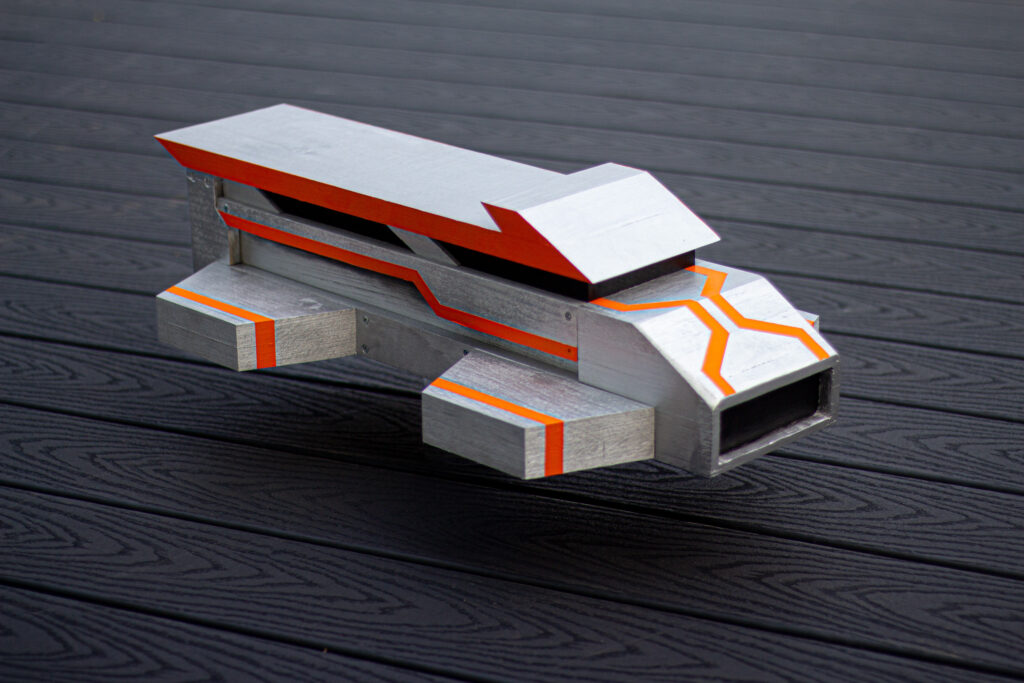
JPNY II (2023), Wood, Acrylic, and Spraypaint
Revill Villanueva (BFA’ 23) is an artist of Filipino descent who graduated from York University in the spring of 2023 with a BFA Specialized Honours in Visual Arts. Inspired by the experiences of stories from second-generation Filipino youth in Toronto, his artwork delves into the themes of labor exportation, immigration, generational trauma, and search for identity. He uses science fiction, futuristic aesthetics, and traditional Filipino semiotics to reimagine the Filipino community in the distant future and convey personal narratives as an immigrant living in Canada and a diaspora artist.
Revill Villanueva

I was born and raised in the Philippines and moved to Canada when I was eight. I grew up as an only child to a single mom who worked multiple jobs to make ends meet in Toronto, so my childhood self really would never have dreamed of all the things that I’ve accomplished to date.
I’ve had the opportunity to launch and implement marketing, communications, recruitment, and student success initiatives in different roles at York University. I’ve had the opportunity and the privilege to also work alongside staff and faculty members who are just as committed about really putting students first diverse students, including new Canadians, members of equity deserving groups and international students.
It’s through this work that I was inspired to pursue my PhD in Education. My research specifically focuses on the professional development journey of international students studying in Canada. Firsthand I know as an immigrant that the job search, job application, job interview process can be very culturally specific. Sometimes that process feels foreign or in tension with someone’s own identity.
I hope to create positive change really by championing equitable, ethical, and just approaches to the internationalization of education and hopefully in some small way that I can also inspire other Filipinos, other Asians, other members of underrepresented groups to follow their own passions, to follow their interests and their ambitions, whatever they might be.
Ian Barcarse is first-generation Filipino-Canadian pursuing a PhD in Education: Language, Culture & Teaching at York University. Ian’s research focuses on the career preparation and professional development of international students studying in Canadian postsecondary institutions. Ian is also a full-time staff member at York University, serving in leadership roles that advance strategic communication, student marketing and recruitment, strategic enrolment management, and student success initiatives. As a higher education scholar-practitioner, Ian aims to create positive change by championing the equitable, ethical, and just approaches to the internationalization of education in Canada.
Ian Barcarse
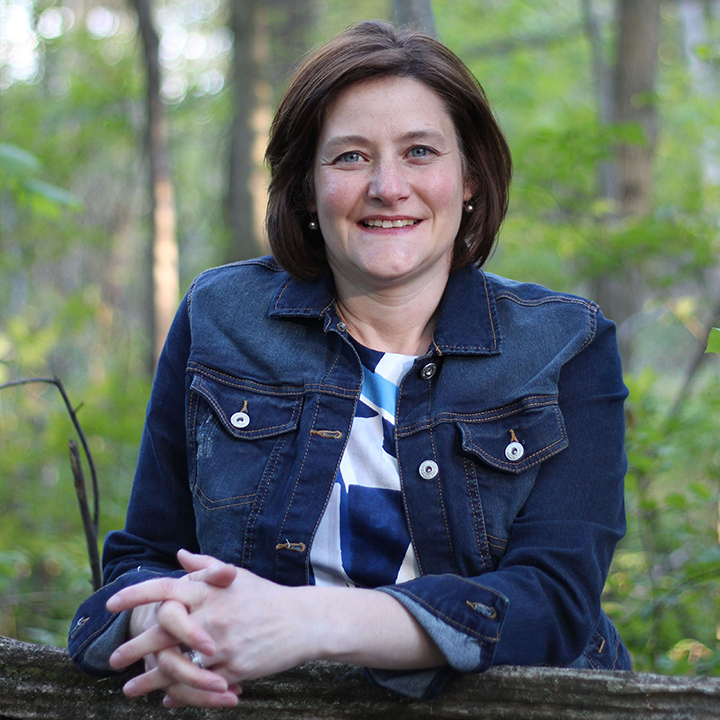
I’ve always had a passion for sustainability. I’ve been a part of the York community since the mid-90s as a student at Glendon. Since then, I’ve had various roles at the university. Before becoming the Program Director for York’s Office of Sustainability, I was the Manager of Transportation.
In that role, I was heavily involved in the ways we could get people out of their cars and into sustainable transportation. I built a network of relationships with transit agencies to further the support for institutional transit services; in addition to bike share, car sharing, and increasing opportunities for active transportation on campus. When the subway was under construction, I was involved in community engagement and focused on building communications with the community as there were lots of changes happening on campus at the time.
When the subway stations on campus opened, I then transitioned into this current role as the Program Director for Sustainability. In this role, I have been passionately trying to embed sustainability into the culture and fabric of the institution, from operations to inner teaching and learning, and research. For example, we’ve partnered with C4, for example, to pitch ideas to engage our students to tackle some of the most pressing challenges of our time. Overall, we seek opportunities for using the campus as a living lab to showcase student involvement across the campus and help us solve some of these challenges in real-world issues at a local level.
York has done a lot within sustainability and I’m really proud of our accomplishments. York is known for its commitment to sustainability and to social justice issues; I think we’ve really paved the way on many fronts. Yet, we still have a lot of work ahead of us. These are the most pressing societal issues of our times and I truly think there is nothing more important in the world than addressing our sustainability challenges together. It’ll take an entire community approach for us to address these issues as it’s in everything we do – from our operational practices to teaching and learning.
While studying at York, the focus of my work was looking at how education is so important for solving a lot of our planetary issues. Goal number four within the SDGs is education; not only access to education but also what we are teaching and rethinking. How are we graduating our students and what are we teaching them? Are we teaching the right things within our business school, for example? Are we embedding the proper principles to create a better world? Lassonde for example, are they teaching the tools of how we address our current challenges from an engineering perspective? How do we rethink and transform our current system and address these challenges from there?
We’re graduating students from the institution, and they can go out and change the world. I think it’s important for the York community to be champions and changemakers to tackle these pressing issues. It’s important for our researchers to help us navigate in terms of research, technology, and innovation, because it takes the entire institution to address what we need to do in terms of moving forward to reach our net zero goals.
From a campus perspective, we need to embed sustainability within our operations as a teaching method. Students learn from looking around our campus and our environment. So, I think we need to embed sustainability within our own practices – everything from transportation to food. Asking ourselves, where are we procuring food from? How are we procuring it? Embedding more opportunities for plant-based options in our menus, for example. This is where even our social procurement policy plays a huge role in supporting local equity seeking groups, diverse vendors and the ability to provide that lens of social justice.
It’s about thinking how we do things differently and how we do things smarter and better, not necessarily just adding more to your plate. It’s about rethinking what we’re doing and creating that mindset. Sustainability is everybody’s responsibility. We need to embed it in all of our jobs. We need to embed it in everything that we do in our culture. And I feel that we’re at a very pivotal moment of change at York. I’m very passionate about sustainability and want to make the world a better place. I think our universities are a key driver in helping to achieve those goals.
Nicole Arsenault is the Program Director for Sustainability at York. She is now leading efforts on a range of programs to integrate sustainability into all parts of campus life. Driven by an unrelenting passion, Nicole employs a partnership approach with colleagues to help foster a culture of sustainability, to create positive change for our community and the world around us. Prior to joining the Office of Sustainability, Nicole worked as the Manager of Transportation, where she led the implementation of several institutional sustainable transportation solutions and identified opportunities in which the University could advance its leadership role in sustainability. Nicole recently completed a Masters degree in the Faculty of Environmental and Urban Change. Her interests include climate change mitigation and adaptation, sustainable transportation and advancing the United Nations Sustainable Development Goals. Nicole loves family time, hiking through nature and doing yoga.
Nicole Arsenault
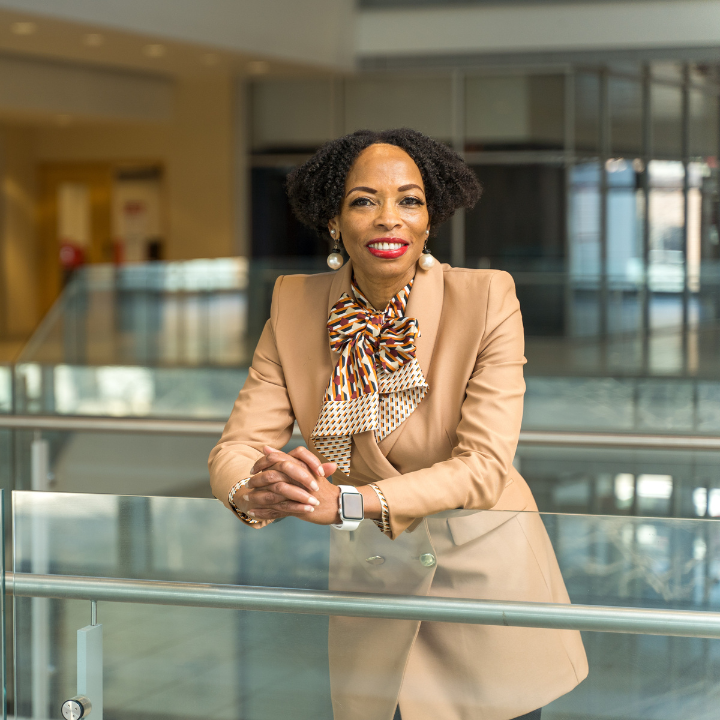
As Prof. Andrea Davis prepares for her role as academic convenor for Canada’s largest gathering of scholars this spring at York University, she reflects on Congress 2023’s theme, and how it informs the decisions we need to make as a society to ensure we can ‘live well together’ as the University Academic Plan calls on us to.
Davis says the theme ‘reckonings and re-imaginings’ asks us to consider the deep significance of the crossroads in which we now stand.
As we emerge out of the COVID-19 pandemic, we are asked to contemplate, with a sense of urgency, the lessons learned from Truth and Reconciliation, Black Lives Matter, the evidence of Indigenous children buried at former residential schools, the death of George Floyd and more recently Tyre Nichols, mass protests in the streets for racial justice, and increasing calls for awareness about climate change and the state of the planet.
“We cannot simply pretend that our world has not been shaken – if not altered – in some fundamental way by the events of the last three years,” Davis says. “I don’t think York could host a Congress that didn’t attempt to address some of these questions.”
“Universities, their students and graduates, academics, writers and thinkers have a responsibility,” Davis argues, “to attend to these lessons, to decipher what they have taught us, and to offer our societies a language, a grammar, for thinking through and beyond the crises of our times.”
When up to 8,000 academics from 67 academic associations representing a rich spectrum of disciplines in the humanities and social sciences gather in person at York for the first time since the pandemic, Davis invites attendees to not only reflect on the lessons we have learned, but also to begin the work of enacting the terms under which a radically different world might be created.
“What might it mean for us to commit to knowing and caring for each other across our differences,” Davis asks, “understanding that the world we want to live in tomorrow is dependent on the action we take together today?”
In fact, York’s academic plan includes a university-wide challenge to elevate the University’s contributions to the United Nation’s 17 Sustainable Development Goals (SDGs). Serving as a blueprint for action, it is positioning the York community as an agent of positive change in a world facing a convergence of unprecedented trials from climate change, a global pandemic, poverty, systemic inequality and political polarization.
Student and faculty engagement in York’s UN SDG challenge has sparked discussion about the relationship between equity and sustainability.
Davis wonders if we can reimagine a new set of social relationships grounded in decoloniality, anti-racism, and justice, and what kinds of strategies to address climate change or advance the UN SDGs might be produced when we view these challenges through the lens of racial justice and Indigenous resurgence.
Davis says York is the right university to provide the platform for these pressing discussions.
“Social justice is at the core of what we say we do, at the core of what we say we care about. We’re a social justice university, and we’re also one of Canada’s most diverse universities. The time is right. The setting demands that we not only be involved but that we lead.”
“If, as York University says, we’re going to right the future, it is now time for universities to be bold.”
In many ways it’s also fitting for Davis to be tasked with providing the vision for Congress 2023.
Born in Jamaica as a descendent of the formerly enslaved, she came to Canada in 1989 as a graduate student, only six years after Canada’s last racially segregated school closed, and still nearly two decades before the Indian Residential School system ended.
It was on York University’s campus – long before we were one of Canada’s most diverse universities – that Davis began a transition from being a student and young woman living in Jamaica to being a Black feminist in Canada.
“I remember the first time I was on campus, and just feeling like I was in a sea of white faces,” she recalls. “I had never been outside of my country before that first trip, so that was entirely new to me.”
She says, she became a visible minority for the first time and was “minoritized” at the same time as she became “hyper visible.”
“In my classes, for example, as the only Black woman, if there was a day I was not there, everybody knew, and every time I opened my mouth everybody stopped and listened carefully, so I couldn’t hide. My body made me hyper visible at the same time as my history made me invisible.”
Even though she had studied literary criticism at the University of the West Indies immersed in the works of Black writers, coming to Canada made the discourse of race real.

During this time, Davis began to appreciate the enormous power that knowledge holds, and the role universities play as gatekeepers of that knowledge.
“Universities have to decide what knowledge they will privilege, and equally as important, to what ends that knowledge will be used,” she says.
University students, Davis points out, have historically led the charge when it comes to transforming knowledge into positive change, citing several examples.
In 1968, students at San Francisco State College, led by the Black student union, went on strike for five months to demand the creation of Black studies and ethnic studies programs. During the same period, 400 students occupied a computer lab in protest of anti-Black racism at Montreal’s Sir George William University (now Concordia University). Thousands of South African students marched in 1976 to protest the imposition of Afrikaans as a language of instruction in schools.
In 2016, at York University, Davis witnessed students demanding meetings with their Dean, and the University President and Provost, calling for more diverse curricula that reflected the interests of an increasingly diverse student body and the hiring of more Black faculty.
From these conversations began the development of a Black Canadian Studies Certificate that launched in 2018, deliberately situated in the Department of Humanities rather than the social sciences, Davis explains, seeking to centre the thoughts, ideas, theories, histories and expressive cultures of Black peoples in Canada, and Black knowledges as valuable in and of themselves, not merely as a tool for anti-racism or anti-bias training.
Davis points to the popularity of this certificate as underscoring the importance of this kind work in universities.
“We must provide spaces for studying and theorizing the intersections of race, class, gender, sexuality and geographic location, and how these intersect with power and affect the lives of marginalized peoples everywhere.”
For Davis, this requires an acceptance that such theorizing is not just about participating in knowledge production, but also about transforming the core character of the academy and the societies in which we live.
She acknowledges that educational institutions in Canada have played a role in the violent histories of colonization and slavery, and that the humanities and social sciences have helped to entrench racist assumptions of Black and Indigenous people.
“Universities, therefore, have much to learn, and unlearn,” Davis says.
Davis says that, rather than existing in a privileged vacuum, universities are deeply informed by the historical, socio-cultural and political contexts that frame their existence. York’s main Keele Campus, for example, is located adjacent to the Jane-Finch community, one of Toronto’s most culturally and racially diverse neighbourhoods.
“York’s core values of excellence, sustainability and social justice must be informed by this socio-cultural context.”
York’s unique context has informed a great deal of Davis’ scholarship, research and leadership at the University, no more than recently when, following George Floyd’s 2020 killing by a police officer in Minneapolis, the Dean of the Faculty of Liberal Arts and Professional Studies appointed Davis special advisor on anti-Black racism strategies for York.
“I agreed to do it because it was really impossible to say no,” she says. “The moment demanded that I couldn’t stay on the sidelines and pretend this reckoning wasn’t happening. But from the beginning, I have been trying to intervene in these questions of anti-Black racism through the humanities.”
The same approach has shaped her vision for Congress 2023, a joint partnership between York and the Federation for the Humanities and Social Sciences.
“We’ve chosen strategically to centre the voices, experiences, histories and cultures of Indigenous and Black peoples,” Davis explains, “and to sit with those knowledges, and be guided by those knowledges, as we imagine new pathways towards a better future.”
Researchers and graduate students in disciplines including literature, history, theatre, film, education, music and sociology will present research and ideas through panels, keynote lectures, the Big Thinking series, career corner workshops, and York open programming – all intended to create positive change through the lens of Indigenous and Black histories, culture and knowledges.
Informed by York’s place in its community and society, Congress 2023 will also take the opportunity to invite into the University, and into these conversations, local community members, artists, activists, high school students, teachers, parents, families, university staff, alumni, retirees and friends.
“In the academy and the world, we tend to turn to Indigenous and Black people, their thought, their ideas only when we think they can teach us something — how can I learn from you to be a better person? How can I help to facilitate your inclusion in the project of world making as it currently exists?” says Davis. “But what might it mean,” she continues “to understand Indigenous and Black thought as indispensable to all the work of the humanities and social sciences?”
With an eye toward growing the understanding of the power of Black and Indigenous peoples’ voice, art and imagination, Davis looks forward to Congress 2023 where the hard work of shifting the goals of knowledge production toward a more just world will begin.
Andrea A. Davis is a Professor in the Department of Humanities and the Academic Convenor of the 2023 Congress of the Federation for the Humanities and Social Sciences. She teaches and supervises in literatures and cultures of the Black Americas and holds cross-appointments in the graduate programs in English; Interdisciplinary Studies; Gender, Feminist and Women’s Studies; and Social and Political Thought. She is the author of Horizon, Sea, Sound: Caribbean and African Women’s Cultural Critiques of Nation (Northwestern University Press, 2022).
Research Interests: Caribbean, African American and Black Canadian Literatures and Theatre, African Diaspora Studies , Black Cultural and Feminist Studies, Black and Indigenous Solidarities
Andrea Davis
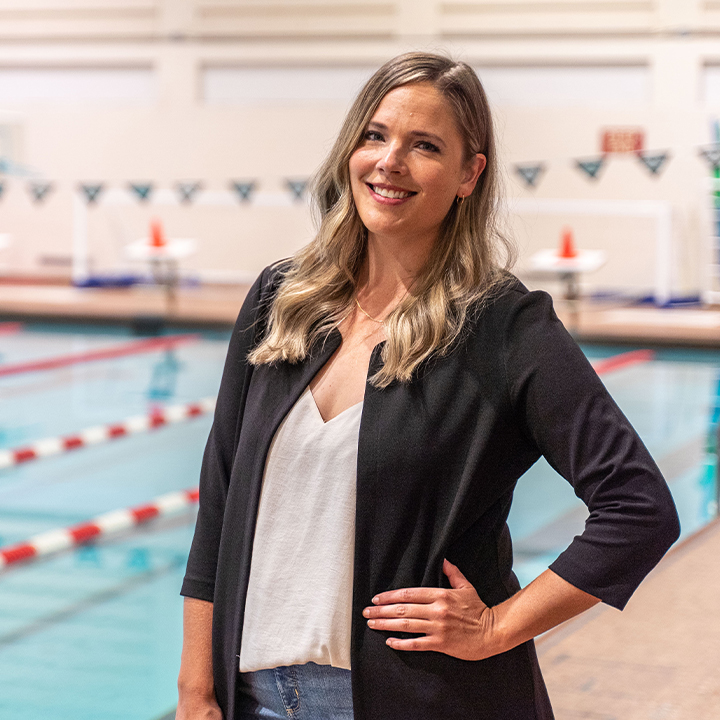
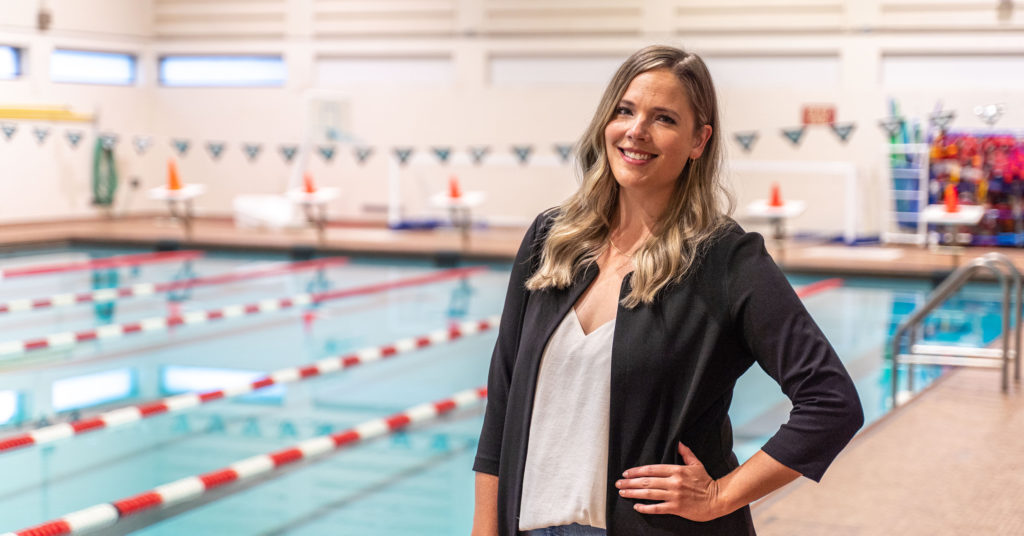
“Water safety was always an important part of my life. I worked as a lifeguard in high school and during my undergrad degree at Western University. Shortly after that I started working for the Lifesaving Society in Ontario – which is where I first got into the field of drowning research.
While working at the Lifesaving Society, I realized there is a huge drowning burden that people weren’t really talking about at the time. There was a lot of opportunity for impact in drowning prevention, both in Canada and globally, so, I decided to pursue my PhD in drowning prevention.
In my role as a health scientist in the Division of Injury Prevention at the US Centers for Disease Control and Prevention (CDC), I’ve had the opportunity to collaborate with partners on global drowning research projects. Over ninety percent of the burden of drowning is in low and middle income countries, and rates are particularly high in sub-Saharan Africa. Recently we worked with local partners to conduct a large-scale drowning prevention project to describe the burden and characteristics of drowning in Uganda, and we are now partnering to conduct a similar survey in Ghana.
Due to limitations with existing data systems, there is little information on the true burden of drowning in sub-Saharan Africa, and what the most common causes of drowning are. Sometimes what we uncover is surprising. The Uganda study identified that young adult males, particularly those engaged in fishing or other occupational activities on the water, were at the highest risk of drowning in the country. This is quite different than what we see globally, where young children are typically at the highest risk of drowning.
It is critical to conduct studies like these to understand the regional differences in the circumstances of drowning among the highest risk groups, so that the type of prevention strategies that are implemented will be applicable to the burden in that region. We’re working to improve data around drowning and support the implementation and evaluation of proven drowning prevention strategies globally.
An even more neglected area of drowning prevention is non-fatal drowning – which occurs when someone who starts drowning is rescued or survives. In my role with the Drowning Prevention Research Centre Canada I worked with Canadian and global experts to define and create a categorization system for non-fatal drowning, which can have severe long term consequences, such as brain damage or other disabilities. Better understanding, describing, and preventing non-fatal drowning is a key focus of my work, and was part of my dissertation at York University.
I want people to know that drowning is a major public health concern – it is the third leading cause of unintentional injury death globally. Over 235,000 unintentional drowning deaths are estimated to occur each year, but the burden is likely much higher because not all drowning cases are reported or recorded, and some are captured with other causes of death.
I also want people to know that drowning is preventable. People often think of drowning as an unfortunate accident, that nothing could have been done to prevent it – but that simply isn’t true. All drowning is preventable and there are proven prevention strategies – like always wearing a life jacket while boating, teaching all children basic swimming and water safety skills, and fencing backyard pools with four-sided isolation fencing – these are simple actions that could save so many lives.
In 2014, the World Health Organization released a first ever global report on drowning and that garnered a lot of attention and funding for drowning prevention worldwide. I’m pleased to say that as attention increases around the issue and more funds are allocated to implement proven interventions, drowning fatalities are decreasing overall. However, there is still more work to be done to reduce inequities in drowning and eliminate this preventable public health problem.”
Dr. Tessa Clemens is a passionate drowning prevention researcher focused on improving drowning surveillance and identifying effective strategies for preventing drowning. Her work focuses on supporting health equity, which includes understanding and addressing racial and ethnic disparities in drowning rates and supporting the implementation of effective interventions among underserved populations with the highest rates of drowning. Dr. Clemens received a PhD in kinesiology and health science from York University, where her research explored the epidemiology and prevention of drowning in Canada and the reporting and classification of drowning worldwide.
Tessa Clemens
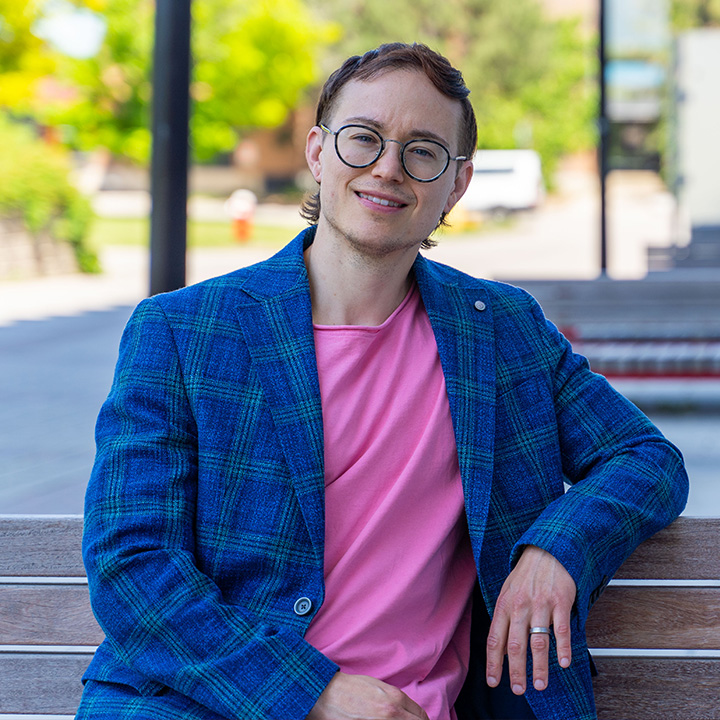
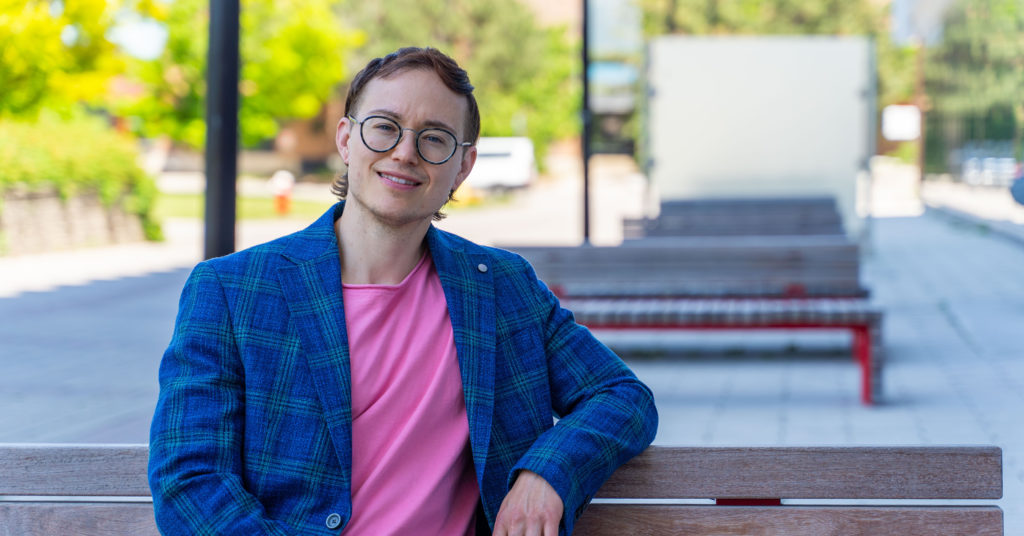
“I’m a community engaged trans and queer scholar, with an emphasis on community engagement and knowledge mobilization, which to me, is making sure that as I’m building new knowledge, it’s being communicated, discussed and debated amongst my communities.
Being at York has provided me with an amazing opportunity and community, to discuss some of the most pressing issues of our time, especially around gender, around 2SLGBTQ inclusion, social change and equity, and gender-affirming care.
I’m an interdisciplinary scholar, so I blend together gender studies, social work, health professions education, bioethics. It’s an eclectic smattering of my own training, as well as theories from a lot of different disciplines.
I hope that people can engage with my TikToks in a way that is disarming in some capacity, because some of what I discuss is new and developing knowledge. People don’t always have schemas for some of the ideas and research that I’m attempting to disseminate. Learning new things can be a bit uncomfortable at times, as you confront new ideas that challenge dominant world views.
I don’t get too heavy into like theory or methodology things like that on TikTok. The Prof Kinnon on TikTok is not the same Prof Kinnon you’ll meet in the classroom or at an academic conference. I apply a lot more rigor to my academic writing and my teaching, whereas my TikToks are often done on the fly – often while I am in the middle of analyzing data or writing a new paper!
Some of these ideas that I share are very new and I’m looking to get some early feedback from communities about a certain theory or hunch I’m reflecting on. I want to know, what do other people in the world, outside academic journal articles, think of these ideas?
Creating TikToks to share my research is rewarding. The feedback on ideas that are still percolating is super helpful to me. I can go to the TikTok comments section and see how these ideas are resonating with people, and that gives me something more to think about.
I also hear from 2SLGBTQ, especially trans youth, who have found my content has helpful during difficult times. I get emails from people who are developing new programs or policies, people considering grad school, people who are like thinking about York as a potential place to do their masters or PhDs. I end up doing a bit of academic advising, which is a nice part of the job.
My latest research project called the “Re/DeTrans Canada study” (Twitter: @ReDeTransCanada) looks at experiences of non-linear gender transition, detransition, and retransition. In some cases, transition regret or changing gender identity. These are important yet overlooked experiences which , for some people in the trans community, can feel like a taboo topic. And for this reason there are very little social supports and a lot of stigma directed toward people who detransition/retransition.
I had a bit of trepidation with starting to talk publicly about this project, because it’s heavily politicized and polarizing in and outside trans communities. But I have been overwhelmingly met with a lot of support, and a lot of people who also in the comment section will say that they like share some personal experiences, or just how much that this research means to them. And there is generally a lot of misunderstanding and misinformation circulating about detransition. So that definitely gives me some motivation, and makes me feel like the work that I’m doing is meaningful.
One of the goals of this project is to inform 2SLGBTQ-serving community organizations, looking at ways to develop support programs, different policies and better public education, public conversation.”
Kinnon R. MacKinnon received his BSW from York University, MSW from Ryerson University, and PhD in Public Health Sciences from the Dalla Lana School of Public Health, University of Toronto. Drawing from critical, interdisciplinary training in gender studies, social work, and public health, Kinnon’s program of research investigates the social and structural dimensions of health and social care access (specialization: 2SLGBTQ populations). He has specific interest in tracing how the structural landscape – such as policy and legislative decisions – mediates access to support services in local contexts. Kinnon’s practice background includes support group facilitation in the areas of gender-affirming care, and men’s body image. Reflecting a transformative vision, he also designs and studies gender-affirming care education aimed to impact change at the practice and policy levels.
Kinnon MacKinnon
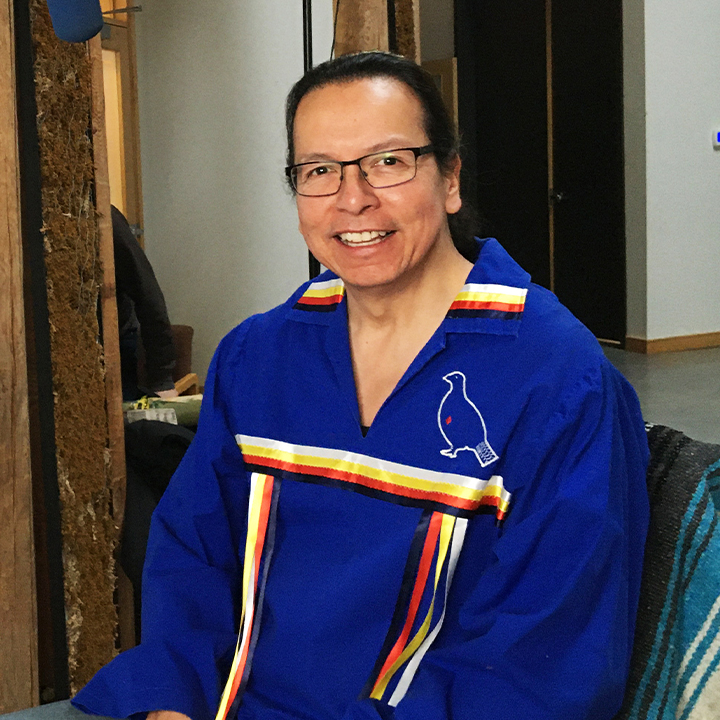
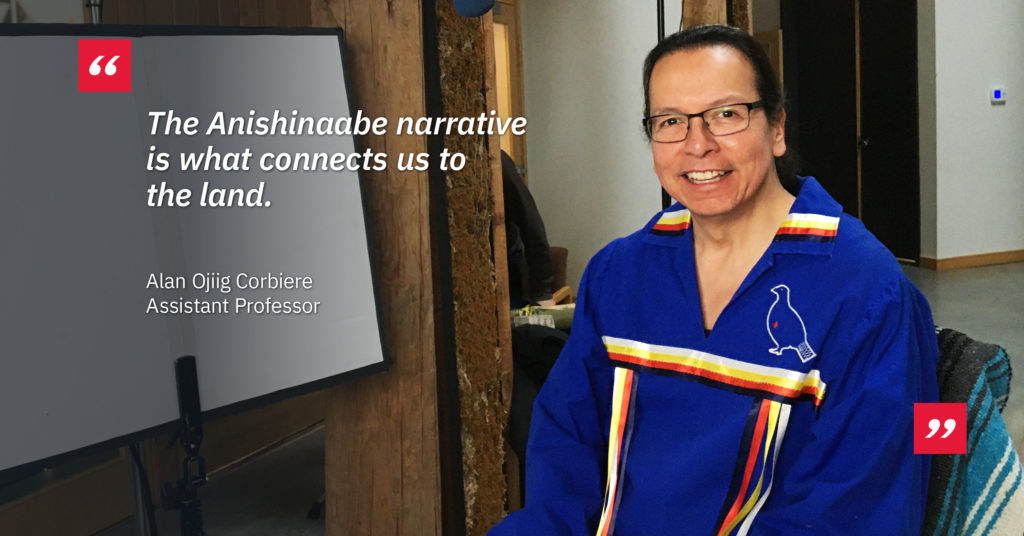
“Growing up my parents spoke Ojibwe to each other every day, I’d hear it sitting at the dinner table, but when they turned to speak to me or my siblings, they spoke in English.
One day when I was 11 or 12 my dad started speaking to me in Ojibwe. I just looked at him blankly and he said, ‘you didn’t understand what I said hey?’, I said no to which he responded, ‘I should have taught you our language.’ That stuck with me. I thought to myself, my parents, my grandparents, my great-grandparents all the way back to creation have spoken Ojibwe, it stops at me.
As a kid my father was hit for speaking Ojibwe at school. The dominant message my parents grew up with was that Ojibwe wasn’t good for anything. You weren’t going to learn anything or get a job speaking Ojibwe, and unfortunately that still seems to be the sentiment today.
I could blame my parents, the government, the church or the school, or I could actually try and learn it. So that’s what I’ve been doing ever since.
After finishing my undergrad in Environmental Science at the University of Toronto, I worked with the Assembly of First Nations on an epidemiological study on the contaminant loading in wild game and fish. I started by learning the names of the animals, birds, plants and medicines. Then I took language classes and learned about a thousand words or so, but I couldn’t put them together, our grammar is so different.
That’s when I met Deb McGregor, who is now the Director of York’s Centre for Indigenous Knowledges and Languages. She recommended York’s Masters of Environmental Studies because it’s interdisciplinary – you design your own research program, you learn from yourself and you pick the faculty that you want to learn from.
I started my language preservation project, recording elders and transcribing what they said, but as I got to this one elder in my community I was in way over my head. I couldn’t transcribe it, it all sounded like one big long word. My dad helped me by repeating the words slowly so I could write them up.
I didn’t learn my history in school, and I didn’t learn our way of life in school. The Anishinaabe narrative is what connects us to the land. I met someone once who said, ‘our language ties us in sacred ways to our homelands’, I thought that was beautiful and it became my new mantra.
I’m still not fluent in Ojibwe, but I can do quite a bit and I’ve been learning since 1992 when I would read to my unborn child while she was still in my wife’s womb, practicing getting my tongue around the stories and the words.
We are starting to lose our elders that are the last generation of truly fluent speakers, who that was their mother tongue, that was their first tongue, that was all they spoke from childbirth to 10 years old. That’s the most intimate language that they speak with their siblings, this generation is passing away and they’re not being replaced.
My community is known for our Ojibwe language speakers, but we’ve been taking our language for granted and if we don’t do something drastic, we’re letting it slip away. Part of my work was setting up a language revitalization program at my local elementary school in M’Chigeeng First Nation on Manitoulin Island where I live. Through the program I tried to inculcate a greater sense of the value of language being used to teach in different subjects.”
Dr. Alan Ojiig Corbiere is an assistant professor in the History Department within the Faculty of Liberal Arts and Professional Studies. Alan is an Anishinaabe from M’Chigeeng First Nation on Manitoulin Island. His research interests include Indigenous Peoples, History, Anishinaabe Language Revitalization, Treaty Research and Relationships.
Alan Corbiere
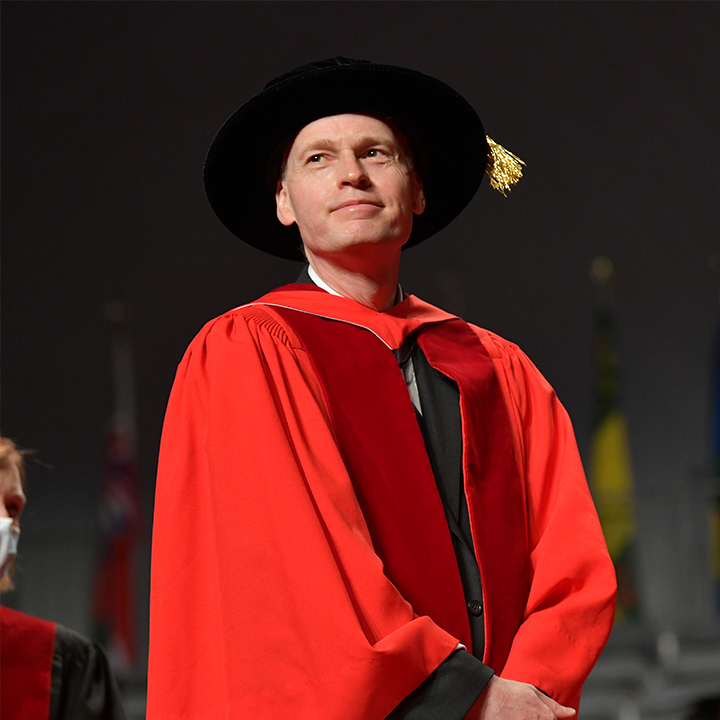
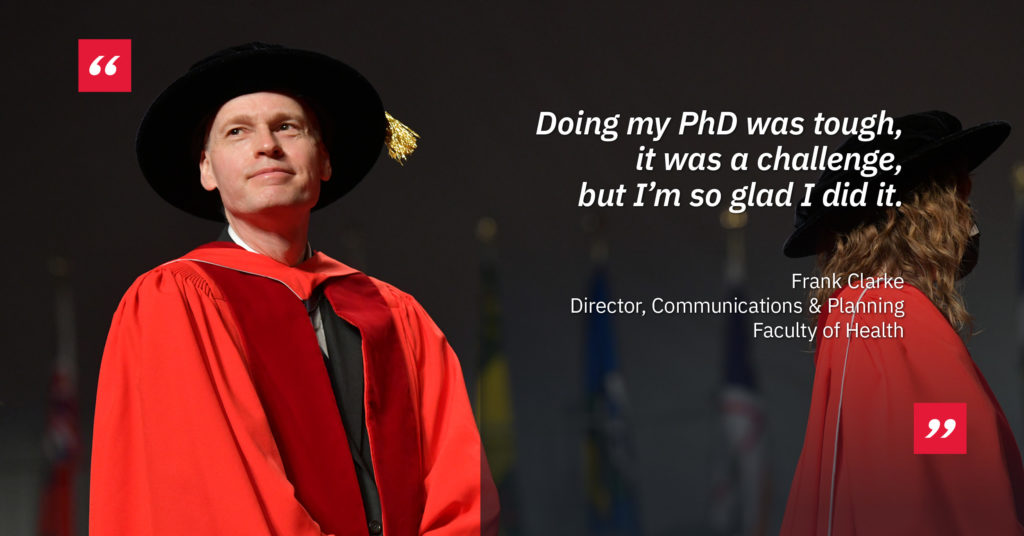
Back in the 1990s I thought about a career in academia which at the time was the conventional thinking: you complete your PhD and apply for academic jobs with the goal to become a professor.
But by my fifth year in the program I had stalled. I couldn’t find a dissertation topic that stuck and that I was passionate about. At the same time tuition had to be paid regardless of whether or not I progressed and I didn’t want to take on a heavy debt load. I was stuck and had no momentum. All I knew was academia, so after leaving the program I felt lost. My wife Susan suggested I try communications, so I took a postgraduate certificate program in public relations at Humber College. It was a great learning experience and very different from academia. Once I graduated from that program, I worked in a few different communications positions before I landed my current position at York in 2011.
After I withdrew from the PhD program, not completing it always nagged at me. Returning to York as a staff member meant I was now eligible for a tuition waiver and could return to my PhD tuition free as a part-time student. I decided to take an academic article I had published back in 2002 as the foundation for a bigger study. I moved from looking at education during the Cold War in the City of Toronto to examining education in this era throughout Ontario. After doing nearly a year’s worth of preliminary research, I found a supervisor, and my dissertation proposal was approved. I dove right into the research, carving out whatever time I could outside of work. I would stay on campus after work and head to the Ontario Archives which was conveniently located on campus and open two evenings a week. I used evenings, weekends, and vacation time to complete the work. It was a lot of work doing the research and writing but this time I had the drive to complete it. I was so fortunate to have had a great supervisor in Marcel Martel and committee members Carolyn Podruchny and Sean Kheraj, and especially the support of my family. It felt great to finally complete it.
When I was on the stage at convocation, waiting to meet the Chancellor and I looked out into the audience and saw my family, the momentousness of the occasion hit me. It was a moving and humbling experience. I felt both joy and tremendous gratitude toward those who supported me on the journey.
Frank Clarke is the Director, Communications & Planning, in the Faculty of Health. He returned to complete his PhD in history at York after withdrawing from the program more than 20 years ago.
Frank Clarke

“I started It’s Souper because I felt there was a void for ready to eat packaged foods from my country (Nigeria) and Africa in general. African foods in mainstream grocery stores were pretty much nonexistent, this continent has so many diverse cultures and foods from those cultures. I wanted to make an impact on the food industry from an African point of view.
It’s Souper is the only Canadian brand in the soup category that is owned by a woman, who is also Black and an immigrant. I want to be a force for change in the industry, despite facing bias as an individual and as a brand. To overcome this, I remain dedicated to my goals so that I can inspire other Black food and beverage founders.
At It’s Souper, we offer Afro-fusion soups and sauces. The uniqueness of our products comes from the fact that, unlike other soups on the market, these recipes are unique, full of flavour and heartiness, and use authentic African spices. We have the Meat Lover’s Chili, Moroccan Chickpea and Chicken Stew, Roasted Carrot and Paprika Soup, and West African Pepper Sauce, the latter two are vegan. Our two new sauces are the Peri-Peri sauce and the Green Pepper Sauce. Our soups can be eaten as a meal, not just a side dish, or used as a base to make other, heavier meals.
It’s Souper products are currently sold online for Canada wide shipment from www.itssouper.com, and across Ontario Canada at retailers such as Sobeys, Whole Foods, Healthy Planet, and other Indie retailers.
When starting this business funding was a major challenge. The food industry is very capital-intensive— from packaging to production, we needed a lot of funds to scale. Financial support was all self-funded in the beginning and the access to those funds was limited, but in the past year or so there has been an increase in support for Black owned businesses which I have tapped into, and am grateful to have benefited from.
For me, the YSpace program wasn’t just an opportunity to learn how I can grow and scale my business – I feel like I am now part of an extended family that is continuously routing for my success. Even post-graduation the Yspace leadership has connected me with opportunities to secure financial and employment grants. The mentors and peers I connected with through this program as well have become a vital piece that bridges the network gap for an immigrant founder like myself.
My best advice would be do your research to be sure you are filling a gap – you don’t have to reinvent the wheel but add a little sparkle to it, so you stand out. Specifically for black/minority founders – I’d say to them to do all they can to get noticed – from product packaging to thinking of yourself as the best spokesperson for your brand and seizing every opportunity to do just that.”
YSpace Almuni Lola Adeyemi, founder of It’s Souper, quit her IT consulting government job to launch an Afro-Fusion Soup & Sauce line because she wanted to fill the void in the Canadian retail space for African inspired/ethnic recipes made “By Us for All”. Her brand is the first African & Black-owned line of Soups sold in mainstream Canadian retail and was nominated by the Retail Council of Canada for a Best New Product of the Year Award in 2019.
Lola Adeyemi
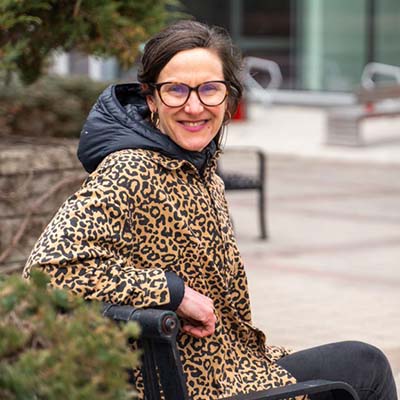
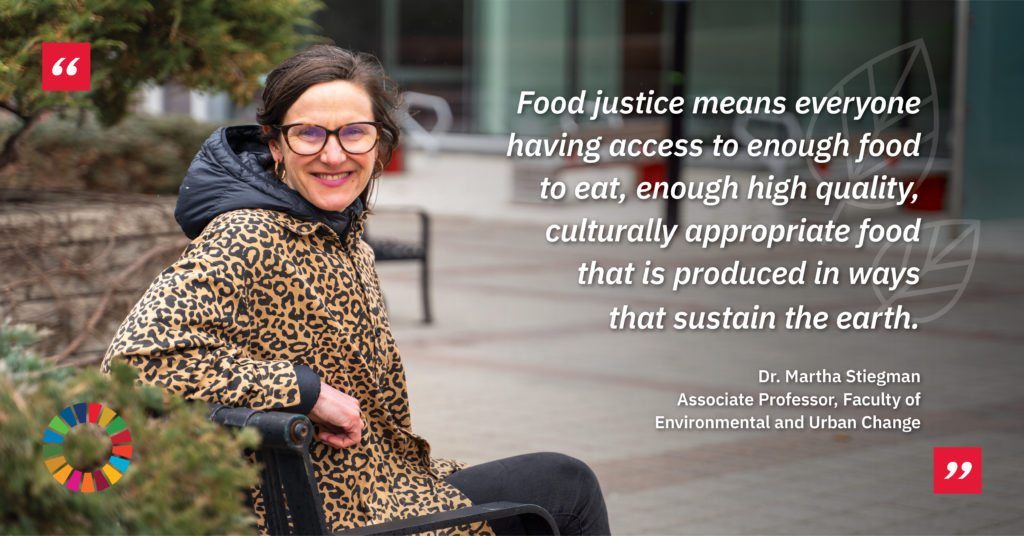
“After my undergrad I worked as a community organizer where I ran a network of collective gardens in Montreal in partnership with local food banks and other community resources. Part of that work was about building community and ensuring people had enough fresh, high quality, and culturally appropriate foods to eat. A lot of that process was about building empowering community networks and ways for people to become active advocating for their rights.
From there I started asking questions about whose land I was on and what it meant to work towards building food sovereignty on stolen Indigenous land. Over the last 20 years that has been my focus. Discovering what it means to be a settler on stolen land, what it means to be a treaty person, what it means to be a treaty partner. What are my obligations and responsibilities to the Indigenous hosts where I live and also to the land that grounds those treaty relations?
In that past five years I’ve been collaborating with the Taking Treaties project at Jumblies Theatre + Arts – using the arts to explore what it means to be a Treaty person in Toronto – on Wendat land, Haudenosaunee land, Anishinaabe land, lands that are subject to a network of treaties, treaties that ground our ability to be here and leave us with responsibilities and obligations. Obligations not only to work towards decolonization but also to respect the spirit and intent of those agreements and hold our governments to account, because they are commitments and promises that have not been honoured, to say the least. We have a book that’s coming out in May called A Treaty Guide for Torontonians. It explores what it means to be a treaty person in Toronto, walking through the history of treaty making here, using the arts to explore how we embody those relationships.
I want my students to think of systems of power – racial capitalism and settler colonialism – not just as abstract forces that exist out there, away from us. These are forces that shape the world we live in, they affect the way power is distributed, the way we understand ourselves, they affect the way we are in community with each other, and our identities. Food is an incredible way to make all that tangible. It is our most intimate engagement with the earth, it’s something that defines our identities and cultures, we gather around it. The industrial food system has been shaped by capitalism, by colonialism, it connects us to those systems of power every day. If you ask someone, how do you build your cultural identity through food, where do you come from, what are your tangible connects to power? It’s a very rich place to begin exploring those questions from.
Food justice means everyone having access to enough food to eat, enough high quality, culturally appropriate food that has been produced in ways that sustain the earth. It’s about dismantling the systems of power that have created our unjust food system, and our society. Food insecurity in Canada is deeply racialized. Black and Indigenous communities experience food injustice at much higher rates, 11.1% of white Canadian’s are food insecure where as 28.9% of Black Canadian’s are food insecure. There’s an element of racism and decolonization that is important when you think about food justice. There’s strength and there’s power in community and in numbers.
There are ways to get involved and organizations doing great things, like Black Creek Community Farms, Food Share and The Stop. Yes, there are conventional food banks, which are necessary, but they are band-aid solutions to a deeply structural issue. So while we’re working to dismantle systems of power and create food justice, we need that band-aid. But, after you drop food off at the local food bank, call your local representatives and tell them that we need a stronger minimum wage, a universal basic income, transformative reconciliation with Indigenous peoples. Tell them that food is a right, not a commodity, and that we need to change our systems to reflect that.”
Martha Stiegman is an assistant professor of white settler heritage in the Faculty of Environmental and Urban Change at York University. Her community-based research and collaborative video work examine Indigenous-settler treaty relations in their historical and contemporary manifestations, with particular attention to food sovereignties and justice.
Martha Stiegman, Faculty
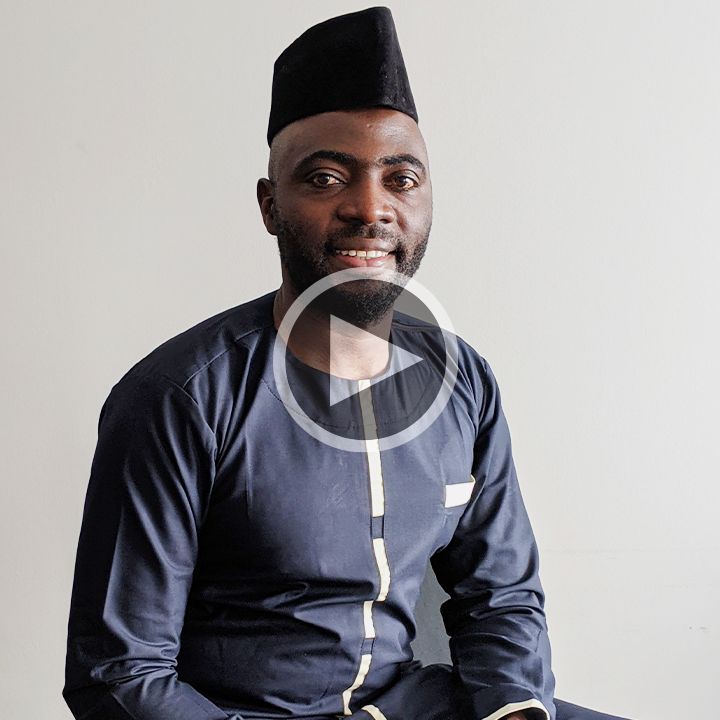
“My friends played a big role in me becoming so passionate about mathematics. When I was in middle school we had a math assignment every day, I would take it back home and figure it out then rush to my friends’ houses to work together as a team. Each time I would explain the concepts to my friends, there would be a light bulb moment for them, when something finally clicked that they couldn’t get in class. They would say to me, ‘Jude! I’ve got it now!’. Those light bulb moments were exciting.
When I graduated from high school, there was no hope of university. It was not something that was mentioned, my mom was a single mother with five children, she worked as a small-scale farmer, so I would either stay in the village and help on the farm, work at the school, or become a priest.
My mom allowed me to visit a family friend in a nearby city and while I was there, I started tutoring.
I met someone who was taking the national exam for teachers, and they said if I took the exam and passed, they could host me while I attended school at the Secondary Teachers training college.
I thought, this would be great, I would have the opportunity to help more students. I decided to take the exam and I passed, graduated, and started teaching in secondary school. At that point, I some money and could afford to go to university and study mathematics and computer science.
The year I graduated I was going to keep teaching at my secondary school, but I attended a conference that talked about applying mathematical modeling to solve disease issues and I asked if it could be used to solve malaria issues. The group of international participants at the workshop were so nice and they explained to me how it could be used. I had lost a lot of people to malaria, so I was touched.
I decided I was going to study mathematical modelling and artificial intelligence to acquire tools I could then take back home to fight malaria, this terrible, yet preventable disease that was killing a lot of people I knew, my loved ones.
The moment I joined York University COVID started, so my focus shifted somewhat and now I have put together a team of 52 researchers in nine African countries. We’re using AI and mathematical modelling tools to save a lot of lives. Soon I will be able to shift back to fight malaria as well.
York is the place to be. It’s home
The first day I started at York, I was walking on campus looking for my building, because I didn’t know the area. When I looked up, I saw the wall of the student building and noticed the diversity of students running for student government, from almost everywhere and I thought to myself – this is Canada, this is our country. York is the place to be, especially when you look at diversity. My colleagues have welcomed me, trained me, helped me to be good at the work I’m doing, helped me to come up with proposals. I find York a unique place to be, because after discussing with other colleagues elsewhere, I’ve realized that the community and support I have at York is that of a family, they look beyond their job descriptions, they work together, they are dedicated to help you, reach out to you and do much more than their work requires. In reality, it’s a family and you give everything to family. York is the place to be, it’s home.
If you can conceive anything and you believe in it, you can achieve it.
It means so much to me to mentor within disadvantaged communities and our students here at York. If you grew up like me, with no mentor, it’s hard to think of university, much less imagine going there. I didn’t know what I would do graduating from high school. I knew it was the same here, finding myself in disadvantaged Black and Indigenous communities when I moved to Alberta. I realized these communities aren’t different from my community back home. I asked myself what would have been different for me if people in my community had someone to look up to, or to realize that university was an option for them.
If these students can see what is possible, they can start to conceive that university is a path for them. That was my first target, to open people’s minds, if you can conceive anything and you believe in yourself, you can achieve it.
I have created a community for the Black mathematics students at York where they are supported, they can ask questions without judgement. We have office hours where they can study silently or work as a group and I’m there if they need help with the mathematics or anything else. The more there are Black students graduating from mathematics, the more people from their community will see them and will be encouraged to take mathematics. This will change their family trees, it will change their community.”
Dr. Jude Kong has a substantial track record in mathematical biology, infectious disease modelling, mathematical and statistical modelling, data science, artificial intelligence, citizen science, and participatory research as well as working with policy makers in government and industry. He is an Assistant Professor in the Faculty of Science – Department of Mathematics & Statistics, Principal Investigator for the Kong Research Group, Director of the Africa-Canada Artificial Intelligence and Data Innovation Consortium, and is a member of the Canadian Black Scientist Network and the Canadian Centre for Disease Modelling.
Jude Kong, Faculty
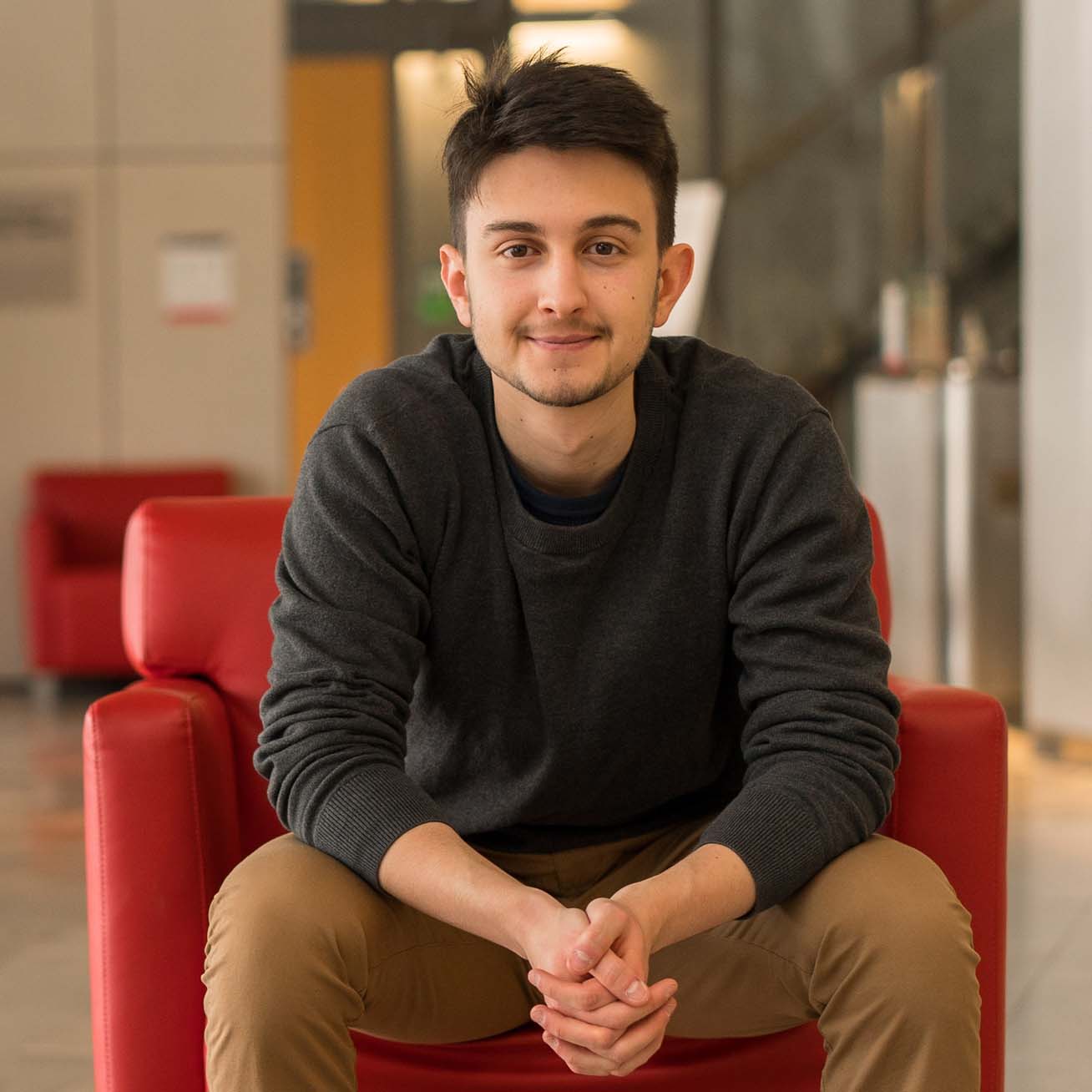
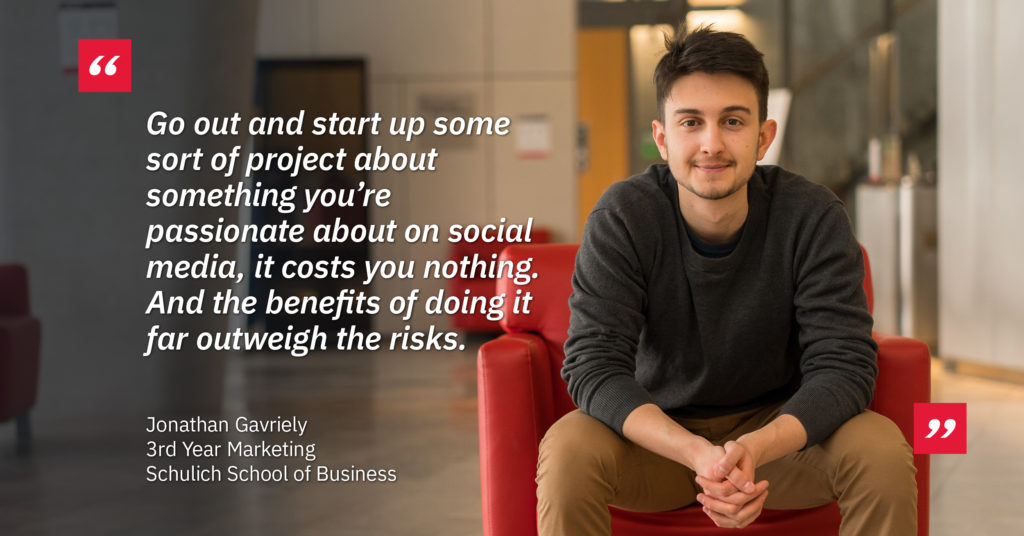
“I’ve always been into content creation and social media, it’s something I got into as a kid because, like most people my age at the time, I wanted to be a YouTuber. That didn’t really work out, but recently, when COVID came around, I was left with a lot of free time and this desire to make something.
The idea for BehindtheBrands came from my passion for content creation, my interest in business, and a theory I had about educational content. From personal experience, I knew that people generally enjoy learning. Whenever someone learns something new, they tend to get excited and want to share it with everyone. However, what people do not enjoy is the process of learning and all the challenges that come with understanding something new. With that in mind, I felt like if I created educational content that was super easy to understand and removed the challenges that come with learning new things, it should do well.
The best way to describe BehindtheBrand’s content, would be explainer videos focused on business. Every week I put out at least one video focused on analyzing a certain business, explaining business related news, or sharing interesting business-related stories.
The first couple of videos I put out got around 500 views. Nothing too crazy. However, my third one, where I explained why IKEA has a restaurant and sells food, went viral with 1 million views in under a week which helped jump-start the account’s growth. Since then, I have posted a little over 50 videos and have grown the account to 126k followers.
Since the whole selling point of the account is providing business content that’s super easy to understand, I spend a lot of time rewriting my scripts to ensure they don’t have any complicated terminology and that all complex topics are explained as simply as possible. There is also the added challenge of keeping the content under two minutes.
I’m currently in my third year at Schulich specializing in marketing. My courses have helped me better understand how to analyze my account’s performance as well as taught me the importance of building my own brand.
Employers seem to really like the channel too. In job interviews, they say “this is the reason why we wanted to talk to you, or this is a cool project, keep working on it”. If I could share one piece of advice, it would be to encourage everyone to go out and start sharing something they are passionate about on social media. It costs nothing and the benefits far outweigh the risks. It can help you connect to with bunch of cool people and help provide you opportunities you wouldn’t get otherwise.
Jonathan’s Favourite BehindtheBrands Stories
@behindthebrands Money laundering does sound cooler tho #businesstiktok #marketing #behindthebrands #mattressconspiracy
♬ original sound – BehindTheBrands
@behindthebrands They actually shut down their socials a couple years ago #marketing #businesstiktok #behindthebrands #juul
♬ original sound – BehindTheBrands
@behindthebrands 9/10 viewers like this account 🙂 #marketing #businesstiktok #dentist #behindthebrands
♬ original sound – BehindTheBrands
@behindthebrands welosealotofmoney #behindthebrands #wework #marketing #businesstiktok
♬ original sound – BehindTheBrands
Jonathan Gavriely, Student
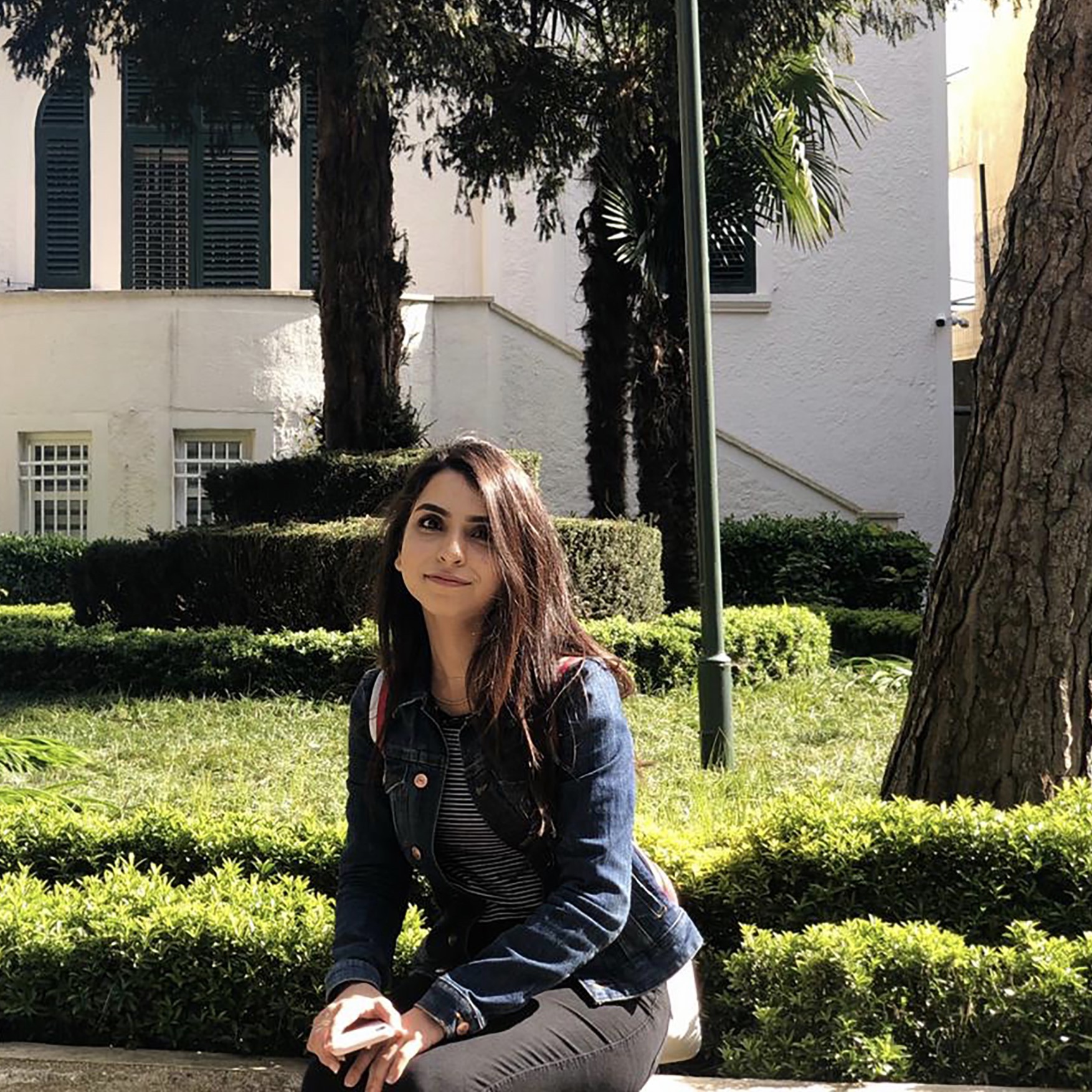
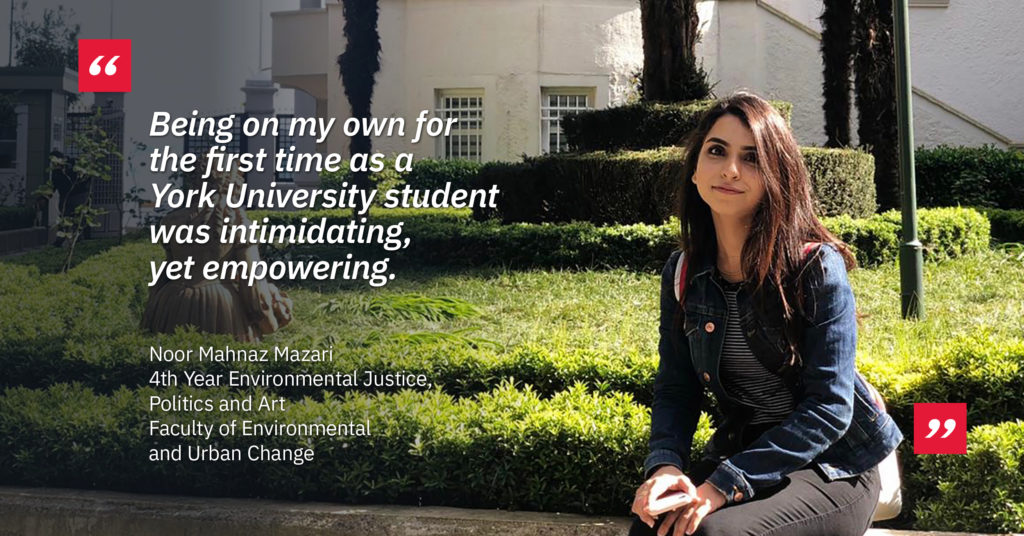
“When I moved to Canada at a young age, there was a whole new world of possibilities. I felt free to choose my destiny and path in life. I came from a place where social injustice, environmental disregard and inequalities defined society. Today, as an Environmental Studies major, I am using my knowledge and experience to create a world where sustainability, justice and equality are the norm.
I grew up in a protective and conservative atmosphere. Being on my own for the first time as a York University student was intimidating, yet empowering. Being denied opportunities on the basis of gender and race left me feeling diminished, unsure about myself and struggling to find my voice. Malala Yousafzai was an inspiration to me, she helped me realize that struggle and challenges only make you stronger if you continue your journey.
At York, I feel supported and encouraged. My professors have a keen interest in the intellectual development of their students. Their passion for the environment has fueled my drive to follow in their footsteps. Recently I had the opportunity to use my classroom education in the real world, by interning in the Sustainable Agriculture & Food Program at the World Wildlife Fund (WWF). I helped write a research paper on Food waste and loss in the hospitality sector of Lahore, Pakistan. This was the first research study of its kind. At WWF, I contributed to a higher goal, and it gave me a sense of fulfillment and purpose. It motivated me to continue in this field in the future. Not everyone has the opportunity to get a university education, I feel truly blessed to be at York University.”
Noor Mahnaz Mazari
4th Year Environmental Justice, Politics and Art
The Faculty of Environmental & Urban Change (EUC)
Noor Mahnaz Mazari, Student
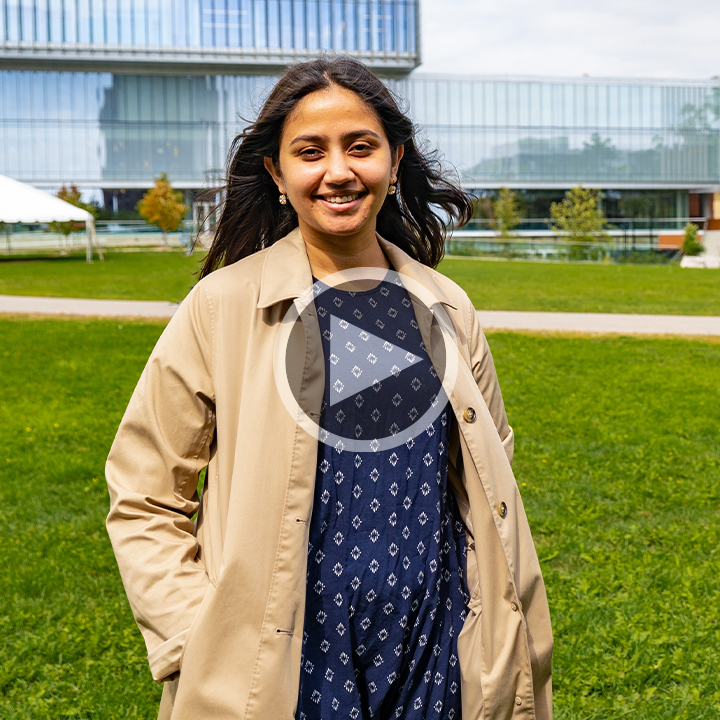
“When I first came to York, residence is where I first felt I belonged and welcomed” – Vishwaveda Joshi
Residence Don, Pond Residence
1st Year Phd – Social Anthropology & Asian studies
Vishwaveda Joshi, Student
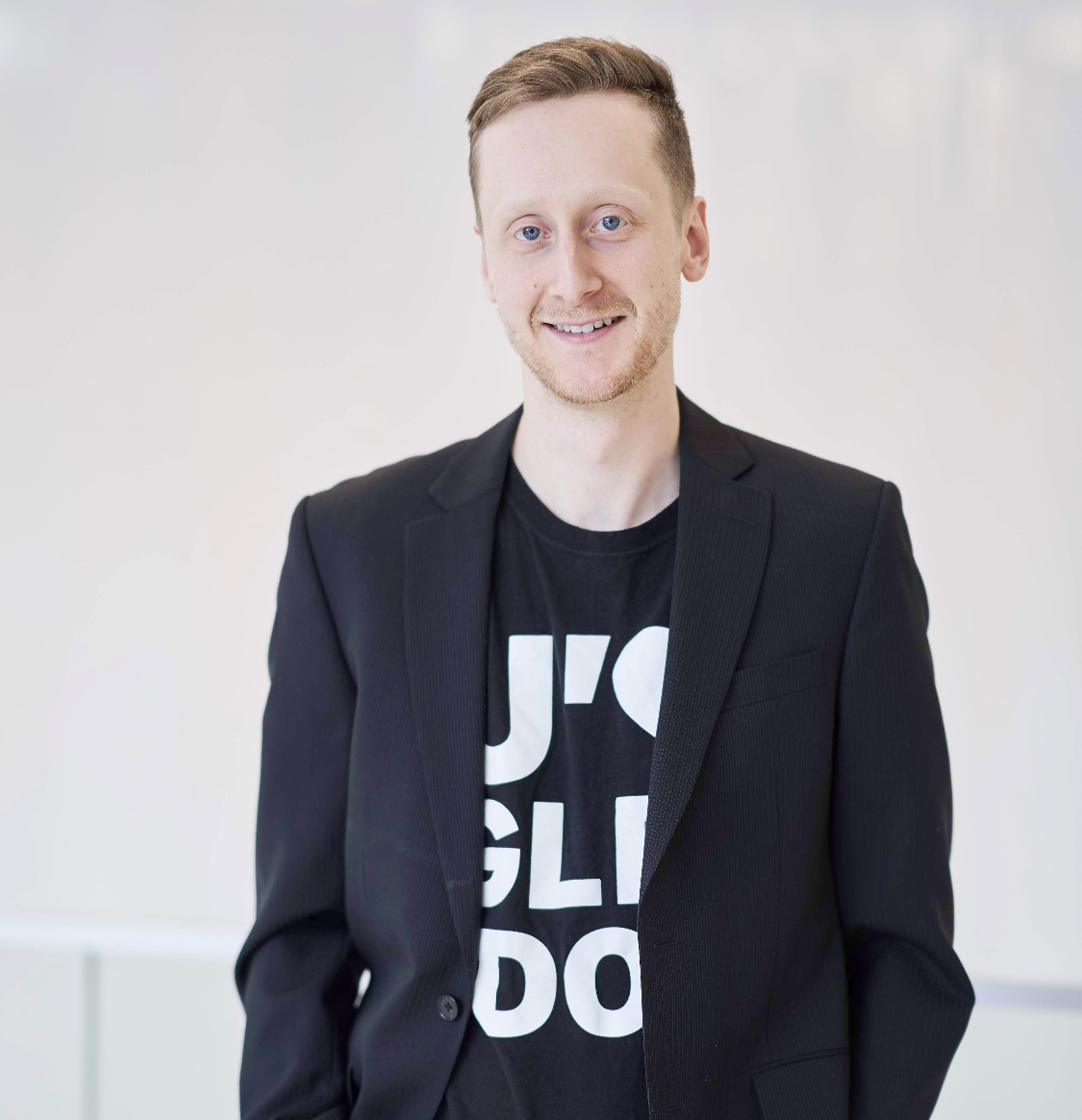
“Franco-Ontarian Day brings me great pride as I reflect upon the importance of preserving French in a linguistic minority situation. I appreciate the French community and its members who advocate for the rights of francophones and francophiles. When I was growing up, I never really knew that this existed in Toronto and was overjoyed when I first came across the Glendon campus at York University.
Growing up in small-town anglophone Ontario, sticking out due to your French name or language can be difficult at times. Speaking in French with my siblings and friends from school was a big help but there were moments when we would get funny looks around town. I am so fortunate that my father made me feel proud to be French.
It also helped that both my parents were French teachersand I grew up in a bilingual household. Living in Ontario, my father would often say “une langue, ça se perd” which translates to a language, can be lost. I feel like I must decide every day to keep and cherish these Franco-Ontarian values. Now as new parents, my wife and I want to pass this gift onto our daughter.
I am now working at Glendon as a Student Recruitment Officers’ Lead. Being surrounded by people who share the desire to improve and preserve their language, while actively engaging in the cultural aspects through eventshas been amazing. I have been making positive change in our community and participated in a panel about language insecurity during la semaine de la Francophonie at Glendon where I heard about very similar experiences. These were shared by people from a wide variety of francophone and francophile backgrounds.
Professionally, I know firsthand how being bilingual can make you stand out in the Ontario job market, and even more specifically Toronto. Every day, I work in French and English to promote the value of a bilingual York University degree. I am a big believer!
I’m immersed in a Franco-Ontarian culture here that has so much to offer – hearing different French accents in the hallways and making connections within Toronto’s diverse Francophone community. For example, it was meaningful for me to participate as a mentor in the ProjetConnexion this past year where I was matched with a few Glendon students to help them improve their French through weekly informal conversations.
My role at the University calls for me to showcase this community to future students who are considering studying in a bilingual environment. To do so, I often collaborate closely with professors, staff and current students. It means that I am constantly discovering what being Franco-Ontarian means to different people. I have my story, I am keen to share it and hear from others about theirs.
Bonne fête des Franco-Ontariens!”
Antoine Ste-Marie
Student Recruitment Officers’ Lead, Recruitment
Glendon Campus
Antoine Ste-Marie, Staff
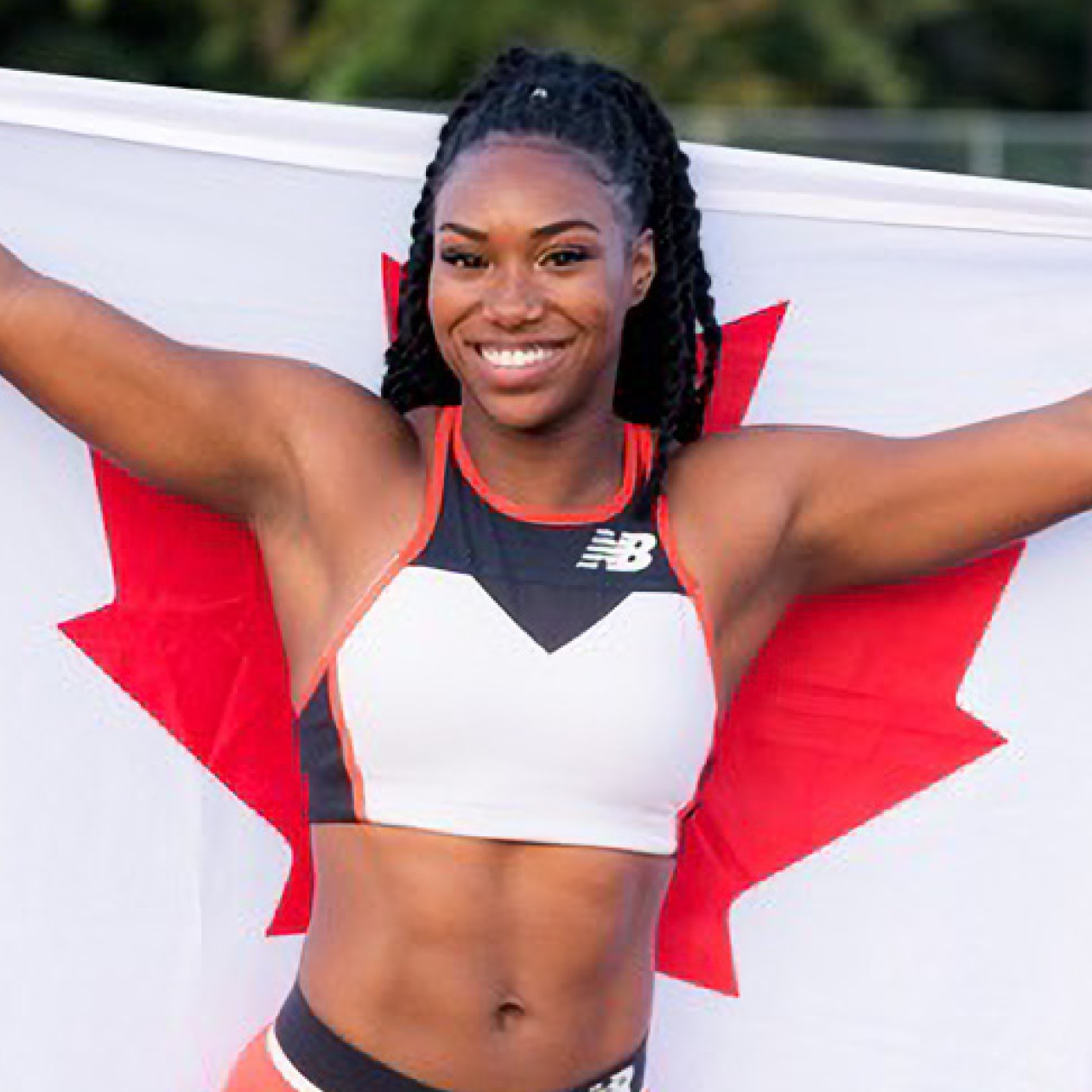
York: What is a defining moment in your life that has shaped your path?
Khamica: A defining moment that has really shaped my path was four months ago, when my mom passed away. She was just the person that really helped to inspire, impact my journey on and off the track.
I will remember her words forever. She really helped me to refine my purpose, and in times when I felt like giving up, in times when I was dealing with a lot of injuries, and times when I doubted myself.
My mom was the one that was able to pick me up, and just remind me that she believed in me. Losing her was hard, but it has given me a different type of motivation and drive to live on her legacy.
York: What made you fall in love with the sport of track?
Khamica: I fell in love with the sport of track because it was something that just came so naturally to me. Running was just something that I knew that I was good at, it was instinctive. And I just love that when I run and I’m trying to push my body beyond its limits to go faster and faster, it’s like a break from reality.
I just love the intenseness of it. I love the competitiveness of it. I love having the ability to travel and represent my country. I love that I can push my body to its limits, and just keep raising the bar and challenging myself to see how much faster, how much better can I get.
York: Is there anything you’ve learned from sport that you apply to other parts of your life?
Khamica: I’ve learned a lot about self-identity. And I think that really applies to life because while you’re chasing a dream, you’re chasing a goal. And while you’re on that journey, you’re going to fail many times. With the myths of failing and injuries and setbacks and obstacles, even with this sport, it has taught me that yes, I can fail, but it doesn’t mean that Khamica the person is a failure.
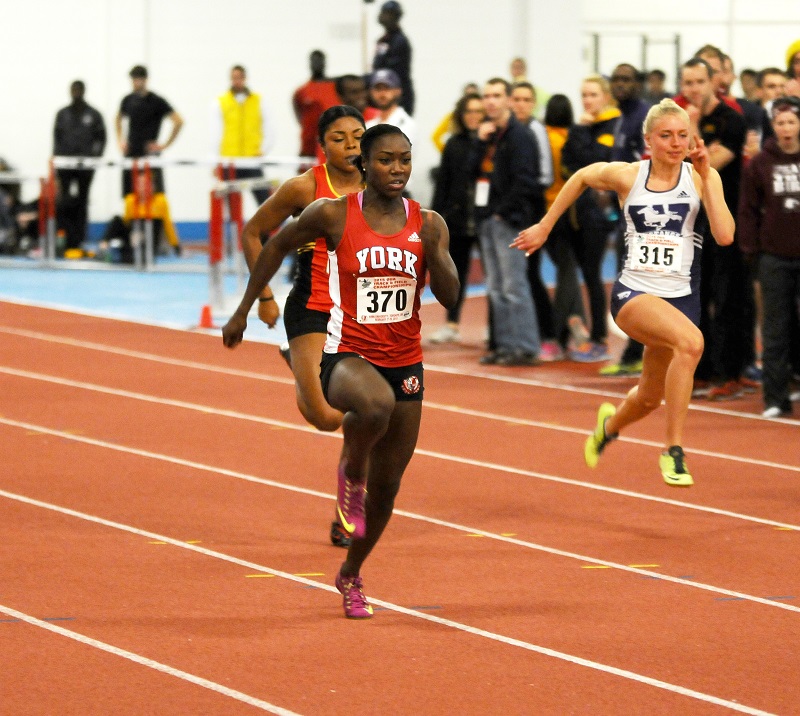
York: How has York shaped your path from both an athletic and academic sense?
Khamica: York grew on me. I didn’t expect to have the type of experience that I did, especially being a part of a varsity track team. I didn’t expect that I would really enjoy the years that I got to run for York.
Track and Field is such an individual sport. I run 100 meters, so it’s just me on the line most of the time. But to be at the CIS, which I think is called USport now, and the OUA championships, and to be along the side of the team and cheering for everybody, it felt bigger than just yourself. You were so happy to see other people accomplishing their goals, and improving their performances. So it was just really nice to be a part of that team.
Academically, I didn’t have the same type of experience as many other students, because I was traveling so much, but during my last few years at York, my teachers were so accommodating. They allowed me to do distance learning, which meant I could pursue sport 100% and be traveling and as busy as I was, and they still do well academically.
York: Is there a memory from your time at York that stands out?
Khamica: In 2014, it was my first year with the Varsity Lions team. And a really impactful moment for me was watching the men’s track and field team win their title. Being part of that team, and witnessing all the athletes that worked so hard, the coaching staff, I was so happy for them.
Another personal memory for me was when I got to speak on behalf of former York President Mamdouh Shoukri at his farewell event. He did a lot in terms of his involvement with sports, and he was so involved and active in the athletic department and in our lives. I was honoured to be chosen person to speak on behalf of the President.
York: You are passionate about social justice and activism. Can you talk about why that’s important to you and the ways you’re creating positive change?
Khamica: Last summer I co-founded Meet My Melanin because we wanted to create a safe space and a platform where people can feel seen, heard, and known in all spaces.
I’ve personally experienced racism within my sport. I’ve just had so many experiences that I felt like with the rise of the Black Lives Matter movement, this was the time where the world was paying attention.
I realized that I have a voice, and experience, and I want to be able to share that, so that the younger generation can be impacted completely different and so that they don’t have to go through these same obstacles.
We go into local schools and speak to students and teachers to improve that environment so that students feel included and understand diversity. As they transition into university or the workforce, they feel seen and understood. It’s been an amazing journey. I just love that we can educate, inspire and impact.
Khamica Bingham
Team Canada, Athletics
Read Khamica Bingham's full story
Khamica Bingham, Alumni
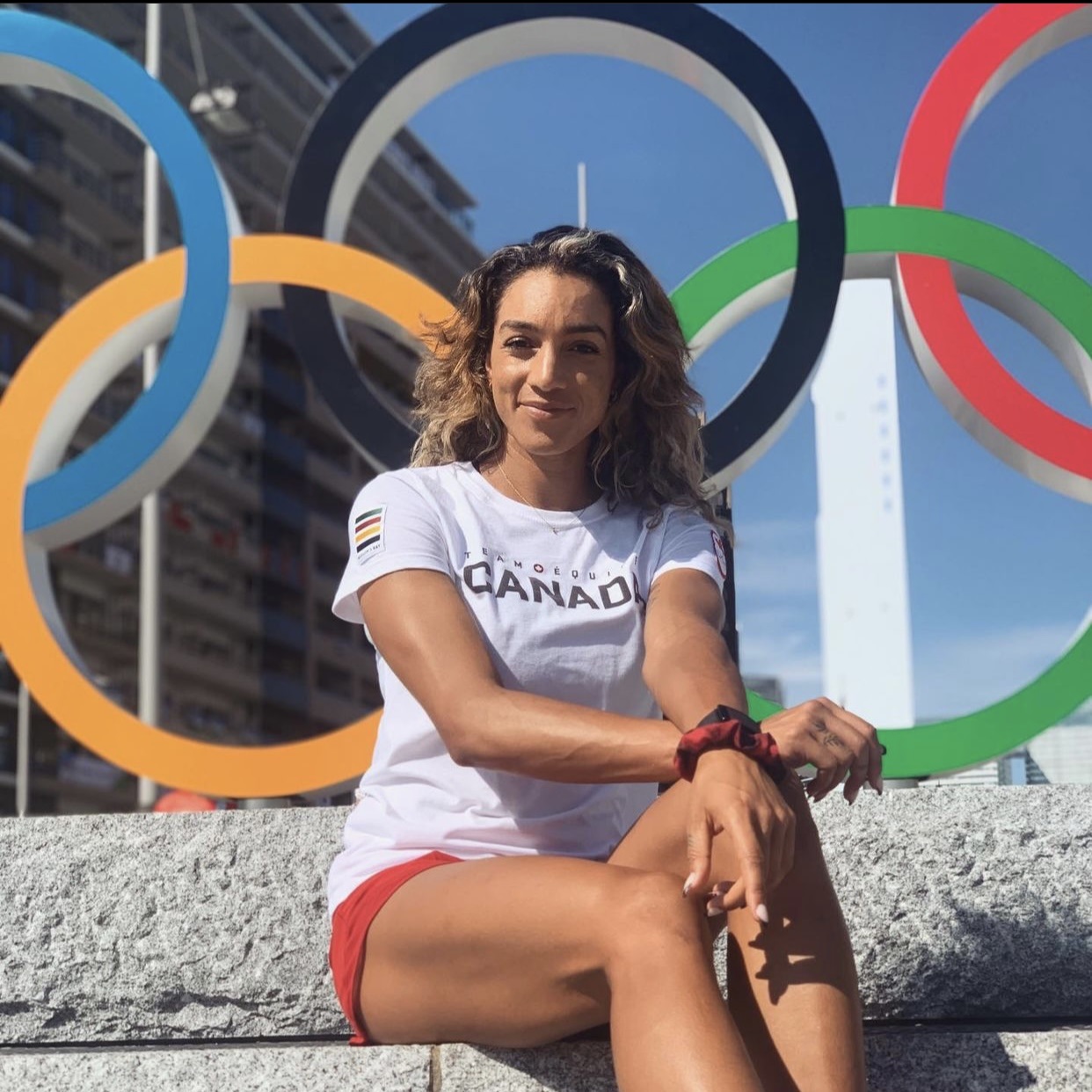
York: What is a defining moment in your life that has shaped your path?
Brandie: I think one of the defining moments that has shaped me in volleyball specifically, was attending the 2016 Olympics as an alternate and practice player. I was able to experience the Olympic Games with the top team in Canada, train with them, and get to know them better. It made me realize what it took to become an Olympian.
I hadn’t really thought of being an Olympian as a goal until later in my career. And probably more recently, only because my goal setting was always one step at a time. It was just raising the bar every time I achieved a goal, and eventually, becoming an Olympian was just the next big goal that I wanted to accomplish, for a multitude of reasons. It was just a natural evolution to the things that I wanted to continue to challenge myself in.
York: Why did you fall in love with the sport of volleyball?
Brandie: I fell in love with volleyball because of the different dimensions it has. Not only pushing you to your physical and mental potential, but how it relates to applying some character traits that you learn into the real world.
And the sport is so interesting because its aim is to find your weaknesses and expose them. You’re standing there very physically vulnerable, just wearing a bikini out in the sun or the elements, and in terms of tactic, what teams are trying to do to you, you learn a lot about yourself.
Volleyball pushes me beyond my limits and opens up doors that I didn’t know were an option for me. I love the experiences, the lifestyle, the traveling, and the amazing people that it brings together.
York: How has York shaped your path, both from an athletic and academic sense?
Brandie: York really provided me with a foundation in volleyball. I was extremely new when I started playing, and it gave me the confidence to become a great player. I built a lot of amazing friendships within the team and made memories that will last forever. I was grateful to go to York and be in a program that I loved, play the sport that I love, and build a community.
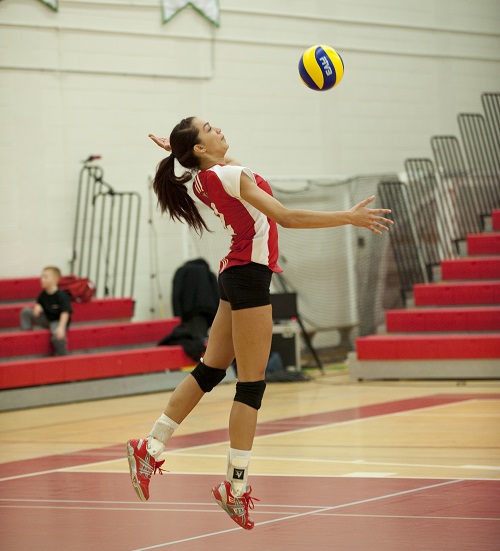
York: Is there a memory from your time at York that stands out to you?
Brandie: One of the standout memories for me was my first year, my rookie year. Just the spectrum of emotions that I had from starting on the team, not even knowing if I was going to make the team, to ending off as rookie of the year.
It was an eye-opening experience. Some of the friends I still have today, I met in my rookie year. We all melded together really quickly and built this great team and grew together.
York: What piece of advice you would give to a rookie coming in as a York lion?
Brandie: Surround yourself with people who are pursuing the same goals as you. For me, it was beneficial to have friends that valued academics. We would carve out time as creatively as we could, to study together, work together, and also train and practice. It is much easier when you’re doing it in a group.
The other thing is to take risks and try new things. You never know where it’s going to take you. I’m a firm believer in just being bold and going for it.
York: You are passionate about social justice and gender equality. Can you talk about why that’s important to you and the ways you’re creating positive change?
Brandie: It’s important to me because I care about people. I care about the relationships I have with the people I’m closest with, and with strangers. I mean, we make our own experiences, and we teach the future generations how to love deeper and connect better.
I represent and have personally experienced injustices, being a woman of color, and an immigrant. I understand how life isn’t always fair and that there are challenges. But there is a lot of beauty in this world.
I’ve had a lot of in-depth and personal conversations with my peers. I’ve been very open and wanting to learn from, as well as teach anyone that’s willing to hear. So I think the first thing is just being really open and real about things and having hard conversations with people.
I also try to give back to the communities that I’ve grown up in. I grew up in Rexdale, Etobicoke. I went to camp there, and I’ve tried to go back and volunteer my time, and it makes me happy to see that they’re still running the same programs there. I also buy local products, support local, and BIPOC businesses and companies.
At the end of the day, we all can be a part of this movement by, making very small changes.
Brandie Wilkerson
Team Canada, Beach Volleyball
Liberal Arts & Professional Studies, 2015
Former York Lions Varsity Volleyball Player
Instagram: @bvuilleumier
Read Brandie Wilkerson's full story
Brandie Wilkerson, Alumni

“There have been quite a few defining moments that have dictated my path. I’d say one of them is following my dream as a hockey player. Growing up, I always wanted to play hockey, and play at the highest level possible. The first time I was on skates was when I was two years-old. I loved the sound my skates made on the ice, the feeling of the wind in my hair, and the cold arena. I just fell in love. I had the chance to travel to the University of North Dakota, which is where I first found out that you could get a University degree while playing hockey. That became my goal. Fortunately, I was able to play at York University and follow that dream.
Around the age of four, I was diagnosed with Type-1 diabetes. At the time, it was difficult because I was so young. I couldn’t really grasp the concept of being a diabetic and needing needles and insulin to survive. It just didn’t really click. It took me a while to really come to terms with being a diabetic, and realizing that this was my life and that I had to make the most of it. I also faced coaches who told me that I shouldn’t play hockey, that I wouldn’t succeed, or that I should find a different sport, just because they thought diabetes would get in the way. It was one of the first adversities that I ever faced.
One of the toughest things I’ve had to persevere through, was the Humboldt Broncos bus crash. I lost 16 people that I consider to be family. Since the crash, the biggest thing for me has been feeling connected to the 16 and living my life to the fullest for them. I suffered many injuries myself during the accident – a fractured skull, a puncture wound, a severe traumatic brain injury, broken neck, broken back, large blood clots in my left arm and right eardrum, and muscle and nerve damage. But the main injury was the 16, and mentally and emotionally trying to come back from that. I really tried to focus on the things I could control, to come back to myself.
But I’ve also had to learn how to live life with a traumatic brain injury. There isn’t enough awareness out there about brain injuries, but as a student athlete it’s been difficult at times. I had to rely on tutors, academic accommodations and support, and often had to work twice as hard to finish my degree. I was able to be on the Dean’s List and Academic All Canadian, so I’m really proud of how I’ve persevered through all those situations.
In early 2019, I gave my first speech on resilience. I talked about my diabetes, about almost losing my dad at the age 16, and about the Broncos tragedy. Someone came up to me afterwards and told me I should write a book. I laughed it off – it was my first year of university, of being a student athlete, and I had a brain injury. Fast forward to several more conversations like that, but even after talking to my agent, I wasn’t interested. And then one day, I was sitting in my Prospects and Perils of Globalization class, and Professor Perchal said “If you want to change the world, it starts with you.” I did want to make a change, and I want to leave a positive impact. A year later, I had written Crossroads: My Story of Tragedy and Resilience as a Humboldt Bronco.
There are so many topics covered in the book, from my brain injury to diabetes, I wanted to be able to connect with everyone and to hopefully help them when they find themselves at a crossroads in their own life. With a portion of proceeds being Donated to STARS Air Ambulance, and topics like family, hope and resilience, I have found that this has truly helped people – which was my goal! It’s been a healing process for me. I wasn’t sure I could do it, mentally or emotionally. However, I was able to be open and vulnerable, and that gave me strength. It’s been an incredible experience.
I really can’t say enough great things about my time at York. It’s a beautiful campus, the student body is so diverse, I’ve made many great connections with people from across the world, and I’ve had incredible professors. It’s also one of the top institutions in Canada, so I know that having a York degree will help me down the road as I look for jobs. As a student athlete, I have lifelong memories and friendships with teammates, coaches and other York athletes that I will always cherish.”
Kaleb Dahlgren
York Lions Hockey Player
Liberal Arts & Professional Studies, Bachelor of Commerce ’21
Author of Crossroads: My Story of Tragedy and Resilience as a Humboldt Bronco
Read Kaleb Dahlgren's full story
Kaleb Dahlgren, Student

“My trajectory in life and work is definitely rooted in who I am as an Indigenous person. Everything I do centers around a number of life experiences, the way I look at inequities and the impact they have on people, and even the research I undertake with respect to education, health and colonization.
Probably the most significant moments in my life are those times I spent with my grandfather. He always instilled in me the value of an getting an education but to never lose sight of who I was as Anishinaabe. I think what I remember most is his emphasis on maintaining my identity. My personal identity is rooted to the land and people of the Teme-Augama Anishinaabe in northeastern Ontario and that identity is where I get my strength and inspiration to facilitate change for the betterment of all peoples and in particular, Indigenous peoples.
I, like most Indigenous peoples, face a number of challenges in life. We live in an inequitable and exclusionary society that can have a huge impact on people as they are growing up. These obstacles can become insurmountable at times. I was grateful that I had a supportive and encouraging family that helped me along the way. Being able to express some of the more challenging experiences especially around confronting racism has also helped me press forward in my own work around EDI.
I simply cannot stand by without trying to address inequities. I would rather be an instrument of change. This is a very intentional decision and one that I nurture each and every day in my personal and work life.
My ongoing commitment to making this world a better place has led me to be an advocate for change. I am inspired by young children and people including my own grandchildren. I see in them a great capacity to build a better world. When I see them look at situations, like the residential school and ask critical questions, I see hope. That inspires me to do better!
I am also inspired by what I see as some of the positive changes in educational systems. Deep systemic changes are needed in educational institutions to create equity. I look at educational institutions as places where we have an opportunity to bring about changes that are needed in broader society.
I really believe that this country is at a defining moment with respect to addressing racism. We not only have an opportunity to bring about change but I believe a responsibility to creating a better world. Areas committed to equity and inclusion are important to organizations in assisting with this change but the responsibility is everyone’s.”
Sheila Cote-Meek
Vice-President Equity, People and Culture
Read Sheila Cote-Meek's full story
Sheila Cote-Meek, Senior Leadership

“York has been my home for 46 years, which is one of the reasons why I haven’t retired yet – I’m just not ready. It’s a job, but it doesn’t feel like a job because York is its own environment, its own city. But it’s not like a downtown office job, I walk around the campus and run into so many friends. It is like home.
I started working at York in March 1975 when I was 20 years old, back when they didn’t have a Human Resources Department – it was called “Personnel Services.” I was offered three positions – not something that you would see today! My career began at the Faculty of Education, in administration.
Today, I work in the Humanities Department, as an admin assistant dealing with the contract faculty hiring process, but I have had seven different roles throughout my time at York. I spent nine years in the Faculty of Education and then moved to the Department of English. From there, I went to the Centre for Continuing Education which is not what it is today – our unit was so small that at one point we were moved off campus for a few years, and now there is a whole new building being built for Continuing Education!
But my most rewarding position was with the Center of Human Rights and Equity, where I spent the majority of my career – almost 17 years. Initially it was called the Center for Race and Ethnic Relations, then both the Sexual Harassment Education and Complaint Centre and the Employment Equity office merged to then become the Centre for Human Rights and Equity. Throughout my time in the Centre, a lot of positive changes were initiated that impacted the York community on matters related to human rights.
And we weren’t simply helping students, we helped staff and faculty deal with different social issues like racism and sexual harassment, and we were making a difference. It educated me and opened my eyes to all the issues that were happening on this campus and the world. The people I worked with were caring, compassionate and bright, and were doing a lot of advocacy, bringing in speakers that opened my eyes to so many different topics. I held this job while I was raising my children, so while I was being educated on these same issues, it helped me to educate my sons, and that has carried them through into their adult life.
After the shooting at the École Polytechnique in Montreal, every year on December 6 I helped The Centre for Human Rights organize a memorial service at the University. We would organize events to help educate and bring the community together. We would also plan events around International Women’s Day and International Day for the Elimination of Racism. It was very enjoyable to bring awareness to the community about these important issues around us.
Looking back on my nearly five decades at York, I have to say, that working at York has been very good to both me and my family. My three boys, Michael, Alex and Justin grew up running around this campus. I balanced working full-time, with raising them and also caring for an elderly parent. One of my proudest moments was when my oldest son Michael graduated from York and then proceeded to work at different Departments on campus for a few years.
I look back at my time fondly, and even after 46 years, I am not ready to go yet. I’ve loved all my positions at York, and I have loved the work I’ve done. It has been very rewarding.”
Liliana Hassani, Staff
Administrative Secretary, Department of Humanities
Faculty of Liberal Arts & Professional Studies
Read Liliana Hassani's full story
Liliana Hassani, Staff

“I’m hoping that through my movement, I am able to inspire someone to strive for change.”
Shenel Williams
School of the Arts, Media, Performance & Design
Dance and Business Administration
Read Shenel Williams's full story
Shenel Williams, Student

“Our main goal with the [Valu] co-op is to create a livable wage for artists.”
Grant Calder (BES’17, MES’19)
Faculty of Environment & Urban Change
Sales Coordinator, Valu Co-op
Social Media: Twitter; Instagram; Facebook
Grant Calder, Alumni
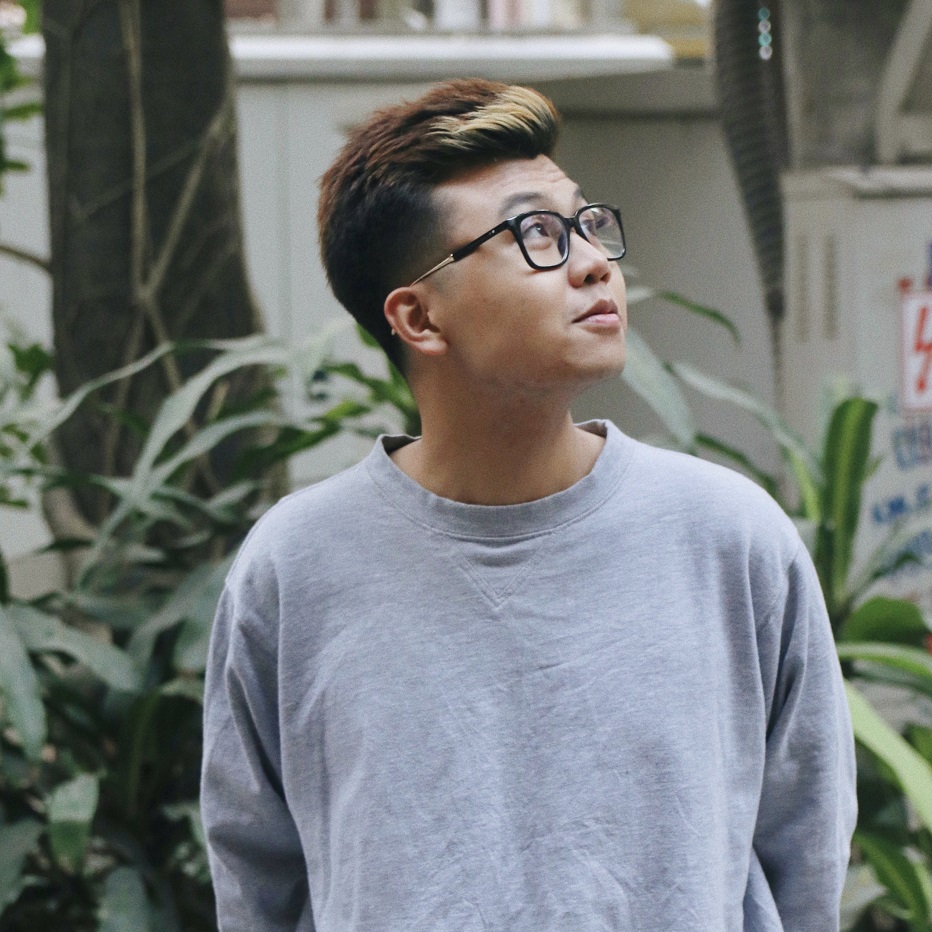
“As a Vietnamese international student, my journey to studying at York is a bit of fate. When I was applying to study abroad, my target was the United States. I planned all the steps to pursue a degree there, but you can’t plan out everything in life, can you? When President Trump was elected I felt America would become unstable. I looked at other options and one of them was Canada – but, specifically Toronto. I knew it to be a diverse, dynamic yet peaceful and stable. Among all the universities, I chose York because of Harry Potter! The series had the most influence on me growing up, and York looks like Hogwarts.
I chose to study Business Systems Analysis, and though it isn’t my greatest passion and technology is not easy for me, I believe that the greatest struggle will give you the greatest strength. This major supports and elevates my future career: marketing, something I am exploring now at York International.
`I have grown the most in my life at York. I have learned so many things, inside and out of the classroom. I met so many extraordinary individuals who have become a major part of my life. I have progressed a long way on my journey of exploring the world and myself. York has also given me many opportunities. All of my work experiences were connections I made at York. I am proud to say that going to York is one of the best decisions of my life.
I never imagined one day I would take classes from a university in Canada, virtually in my own bedroom back home. How crazy is that? But 2020 has led to unexpected directions and situations. Initially, I felt a bit fortunate to be able to study virtually. I could progress with my degree, while enjoying life in my home country with family and friends. Then it struck me hard. The time difference is challenging, there were unfamiliar exams, and different course structure was presented to accommodate virtual interaction. This has been by far the most challenging academic experience I have ever been through.
However, no hardship lasts forever, and it all depends on your attitude towards it. I change my daily schedule to fit the course schedule; I have been learning and practicing studying and working virtually, as well as communicating and cooperating with my colleagues at York International. I find more ways to develop myself. COVID might delay life; however, don’t let it stop you. Everything happens for a reason and it is always an opportunity to grow.
Compared to most people, my life is not as challenging. However, one event had a huge impact on my personality – my parents’ divorce. They separated when I was in primary school. At that time, I didn’t really understand what happened, and why my family was broken. Sometimes, I thought it was my fault. I envied other kids who had a complete family. After the divorce, my parents were extremely responsible for my younger sister and I. My dad would come for dinner at least twice a week, so that we wouldn’t feel a lack of paternal care. My mom loves us with all her heart. At first, I thought my family was broken. But actually, it is still complete, just in another way. I started to cherish happiness around me more. And I love my life more than ever.
One of my greatest fears in life was oblivion. I was afraid of being forgotten, and I would be nothing left but dust after I die. There will be no legacy, and I would be drowned in the inevitable stream of history. I naively thought that I had to achieve greatness to be remembered.
However, through time, that fear has transformed. There was no defining moment; it changed day by day, little by little, through the mold of millions of thoughts about the fear in my mind. Witnessing people come and go in my life, I realized the importance lies not in how you impact the whole world. It’s about how you impact the world around you: your family, friends, loved ones, and yourself. What matter most is how you treat them. And when you are gone, they will remember you as a good child, brother, friend, husband and a good man, who brings positive energy, laughter and joy not as someone that brings misery and tears.
And that is what I believe to be my path.
I would like to send a message to my future self:
Hello future self: Thank you for always striving to be the better version of yourself! Remember, if you can go on People of YU, you can achieve anything you want! Try your best, give everything you have, and there will be no regrets! And don’t forget to enjoy the ride: cherish people around you, look for little magical happiness in life. And stay hydrated. Go to the gym. Keep rapping. That’s all, Duy!
Hope this will make your day!“
Duy Troung
International Student
4th year, BCom ITEC – Business Systems Analysis
Faculty of Liberal Arts & Professional Studies
Duy Truong, Student

“I began playing soccer at the age of six, and so I spent majority of my childhood and teenage years balancing athletic and academic responsibilities. My experiences as a student-athlete at York have made my University experience something special and the years that I will cherish most after completing my degree. I always want to have pride in what I do, and how I perform, whether it’s athletics, academics, or even my small business. I know I won’t be an athlete forever, but I will carry over the traits I have acquired as a student-athlete into my small business and whatever else I find myself doing in the future.
Since the onset of the first lockdown, I have been out of work. Having to spend all of my time at home gave me the creative freedom to start experimenting in the kitchen. I don’t have any baking or pastry experience and everything I’ve learned has been through trial and error and watching tutorials online. I really only intended on baking for family and friends, but the reception that I received from them pushed me to establish Knead It Baked over the winter break.
I do my own social media marketing, planning, strategy, customer service, you name it. I launched my small home-based business after New Year’s, and I was contacted by writers from TasteToronto and BlogTO and that’s when everything skyrocketed. On January 9th–the day the BlogTO article was posted, I received over 50 orders from people eager to try my baked goods. It was definitely a lot to take in at first. I was just about to head into my first week of the winter term, and suddenly I had to fulfill 50+ orders which would all be baked from my small kitchen! I am blessed to have such supportive parents and a sister who continue to help me with the process. My mom and sister help me with baking and packaging, while my dad handles the deliveries. Knead It Baked has become a part of me. As a small business owner, you are your brand.
The COVID-19 pandemic has affected small businesses all over the world. Now more than ever, local businesses need our help. I’ve placed it upon myself to buy Black and shop Black-owned businesses when I can. I think it’s extremely important to show love to people within the community. Buying from Black-owned businesses in Toronto is one way people across the city can help support and celebrate Black members of the community. Meaningful change needs to happen on a global scale, but we can start locally as conversations of systemic racism continue with the hopes of improving racial and social justice. This is a time to reaffirm and strengthen our communities and neighbourhoods.”
Kennedy Sherwood
Student, Faculty of Health
Owner, Knead It Baked
Instagram: @kneaditbaked
Read Kennedy Sherwood's full story
Kennedy Sherwood, Student

“While I was studying at York University I had the opportunity to travel to New York City for a performance. After that my whole intention was to become a touring drummer.”
Jon Foster (BFA ’12)
Drummer & Composer
Instagram: https://www.instagram.com/jonfosterdrummer/
Twitter: https://twitter.com/jonfosterdrums
Facebook: https://www.facebook.com/JonFosterDrummer/
Website: https://www.jonfosterdrummer.com/
Jon Foster, Alumni
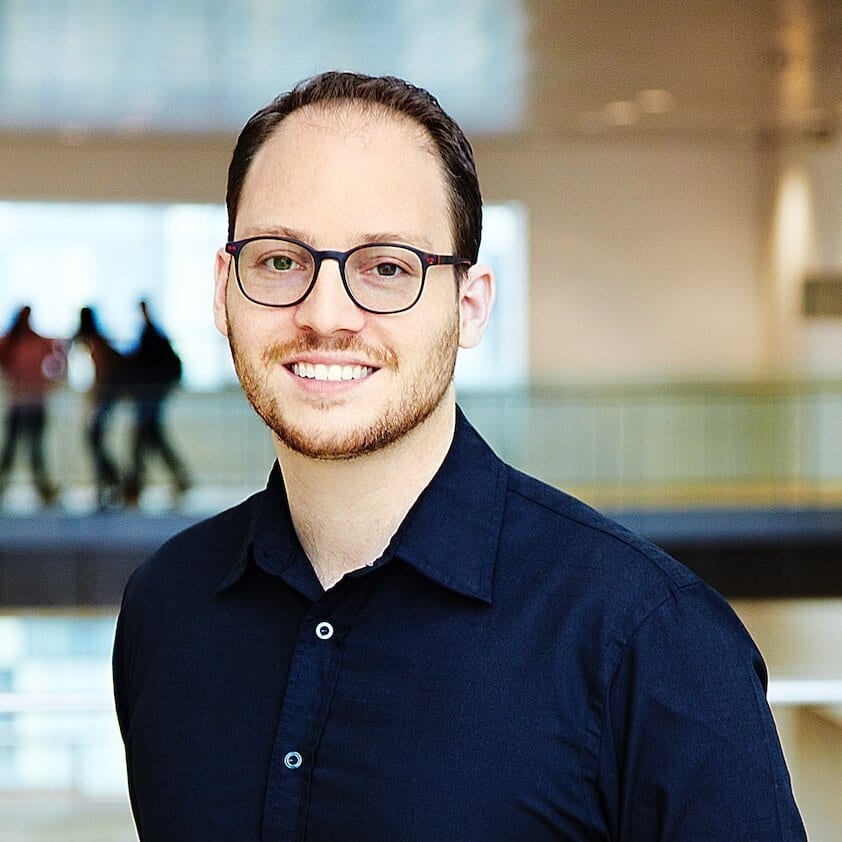
“My research focuses on crafting strategies through which countries can work together to address transnational health threats. The classic example of a transnational health threat is a pandemic. Viruses and bacteria don’t carry passports – they’re not easily contained, no matter how big a wall we might want to build. Much of our health is determined by decisions and circumstances that are taking place around the world. If governments are serious about trying to advance the health of their citizens, they need to work together to address the increasing number of health threats that transcend national borders.
There are so many risks we face today that don’t respect borders: climate change, air pollution, water quality, migration, conflict, for example. We need to make sure we are able to achieve global collective action and design strategies that will enable countries to work together. It isn’t easy.
My research is motivated by the idea that we already have technical solutions to address many health challenges, yet progress remains frustratingly slow because we don’t know how to fully implement them. We know what it takes to live a healthy, long life, and we have treatments for many diseases. But, not everyone in the world has been able to benefit from those technologies or live in healthy conditions. As a result, there is an implementation gap. Some people might just blame it on “politics”. Our research program – the Global Strategy Lab – is focused on looking deeper, understanding these political complexities, and then designing strategies that will work in practice.
How do we embrace the fact that health is political?
How do we conduct research that informs the kind of solutions that will reach everybody around the world, particularly the most marginalized among us?
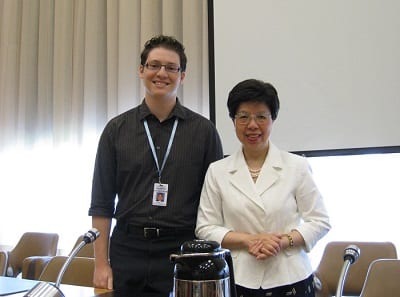
Professor Steven J. Hoffman with WHO Director-General Margaret Chan. Photo taken on July 4, 2008
As a student, I had the opportunity to do an internship at the World Health Organization’s headquarters in Geneva. During my first week as an intern, there was a meeting of the WHO Executive Board. There were 34 members sitting around the table discussing budgets: thirty-two members voted to increase the budget; the United States and Australia voted against it. They were arguing, and I remember thinking – 32 vote “yes”, two vote “no”, it’s simple math on who would win the vote. The WHO Executive Board members took a break and when they returned it was a consensus – no budget increase. At the time I thought: ‘That’s not how democracy works.’ But then my next thought was ‘I am so naïve.’ So I went to law school to figure out what happened. Now I know.
What this anecdote highlights is that the way we try to improve health often happens through decisions or actions that many of us don’t see or fully understand. In global health discussions, very often the focus is on finding technological silver bullet solutions to problems such as vaccines, medicines and fancy AI-powered mobile apps. I like technology like everyone, but it’s only the start of the solution. Technologies must be implemented, which require a deep understanding of politics, law, economics, ethics and the full range of social sciences. This is where I focus my attention.
Our research at the Global Strategy Lab has informed the policies of national governments and international institutions on a myriad of topics. What excites me is that evidence-based ideas can change the world. Through our efforts, we’ve been able to inform policies that have been adopted and made a real impact in communities around the world. Seeing our research taken up by national and global policymakers is a great motivator to continue doing the hard work needed in this area.
At the Global Strategy Lab, we have developed a relatively unique specialization at the intersection of international law and epidemiology. I use my legal background and my epidemiologic toolbox in order to unpack not only the different policies and laws affecting health, but also the way that new policies and laws can be designed in order to improve health.
I feel very lucky to be at York, where these kind of interdisciplinary approaches are not only accepted, but celebrated. When we are focused on policy change, there is a great amount of impact that can be achieved by working at the intersection of disciplines – which is where the Global Strategy Lab excels. It has been really satisfying to break down boundaries and carve out these new spaces where so much innovation can take place.” – Steven J. Hoffman
Dr. Steven J. Hoffman is the Dahdaleh Distinguished Chair in Global Governance & Legal Epidemiology and a Professor of Global Health, Law, and Political Science at York University, the Director of the Global Strategy Lab, the Director of the WHO Collaborating Centre on Global Governance of Antimicrobial Resistance, and the Scientific Director of the CIHR Institute of Population & Public Health at the Canadian Institutes of Health Research. He is an international lawyer licensed in both Ontario and New York who specializes in global health law, global governance and institutional design. His research leverages various methodological approaches to craft global strategies that better address transnational health threats and social inequalities. Past studies have focused on access to medicines, antimicrobial resistance, health misinformation, pandemics and tobacco control.
Steven Hoffman, Faculty

“I started my career as an elementary school teacher, and they were some of the most magical years of my life. Teaching for me has become a journey of self-discovery, an encounter with the self. Education is ultimately an endeavour in being more human. It demands of us an ongoing commitment to living and working from our complex and often contradictory parts – the magical parts, the scared parts, the joyful parts, the engaged parts, the ignorant parts and the resistant parts.
I come from generations of visionaries that merged actions towards justice and humanity with practices of spirituality and self-awareness. These orientations are deeply embedded in how I live and engage in the world. I have also been formed and informed by histories of colonization and my present reality as a settler on these lands. I have had my fair share of experiences of discrimination as a South Asian woman, and I am grateful to the boldness and strength of South Asian women globally who have paved the way for so many of us.
Now as an activist scholar and former elementary school teacher, I believe strongly in sharing knowledge and strengthening relationships between the academy, practitioners and communities. In my teaching, I practice embracing complexity, holding multiple and contradictory truths and realities, centering different ways of knowing and being, and exploring knowledge systems that have been traditionally silenced.
Educators play a crucial role in disrupting anti-Black and anti-Indigenous racism. In this time of racial reckoning and solidarity with Black life, teachers need to be consistent, unapologetic and critical in their commitment to address settler colonialism and white supremacy in schooling and society.
These inequities can be addressed in relationships with students, families and communities; in the interruption of inequitable structures such educational streaming, suspensions and expulsions; and in pedagogical approaches that disrupt the erasure of the histories, realities and aspirations of Black and Indigenous people, a form of curricular violence.
My role as an educator is to support students in developing their critical consciousness, which is the ability to question and critique the world around them and respond to socio-political, environmental, economic and historical injustices.”
Vidya Shah
Assistant Professor, Faculty of Education
Vidya Shah, Faculty
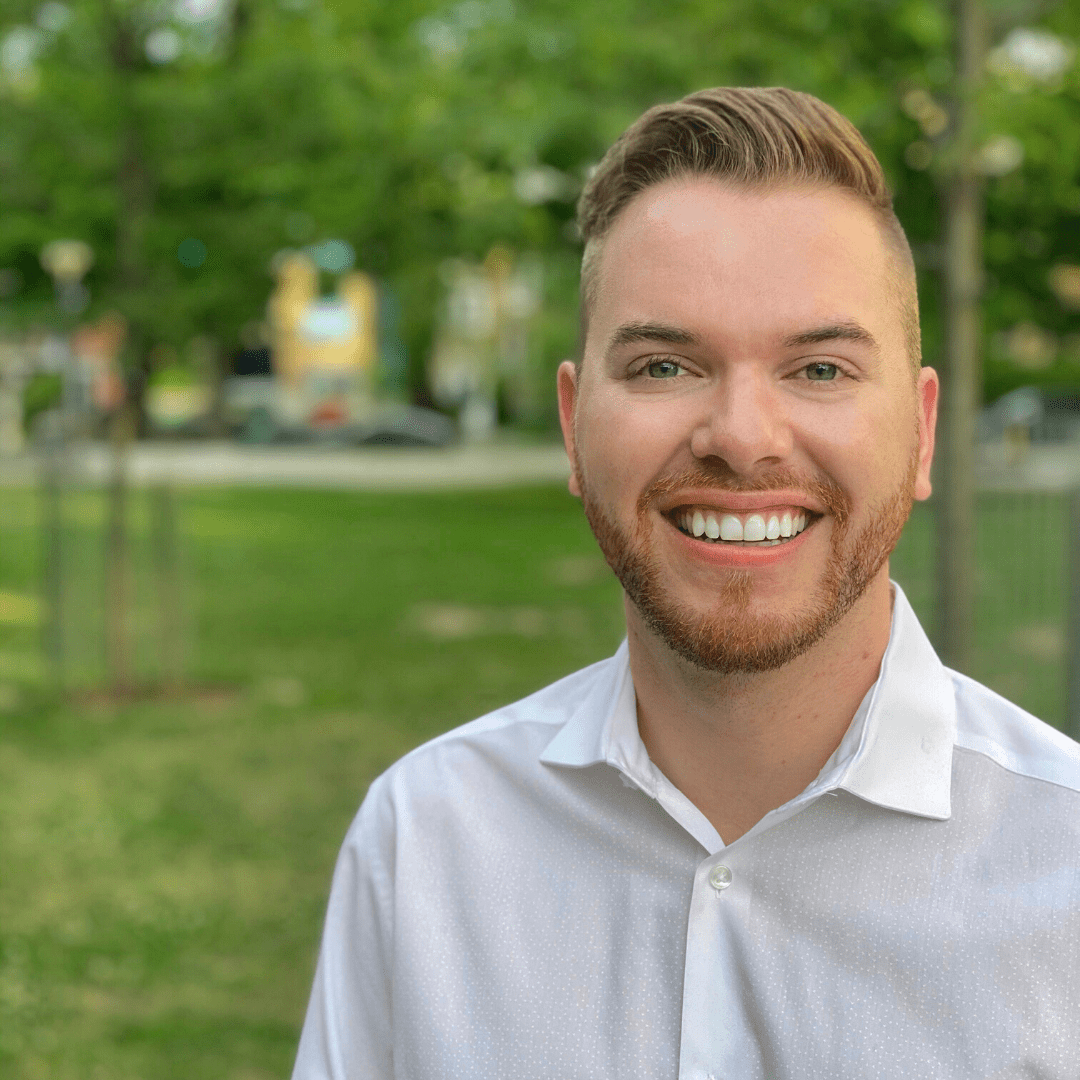
“I grew up fairly poor as a young gay kid in rural Newfoundland. That experience really defined my interest in looking at access – thinking about how policy impacts the delivery of healthcare and social services to LGBBTIQQ2SA and First Nations people, to people of low socio-economic status, people of colour, and Indigenous Peoples more broadly. From a very young age I understood what it meant to live in relative/generational poverty and this pushed my family towards a life that was different than what previous generations had achieved or thought was possible.
My accomplishments are not my own, but a product of the sacrifices of my whole family, and specifically my mother, who as a single parent, went to great lengths to ensure that I was able to complete high school. The support of my community helped me to receive the Avie Bennett Visionary Leadership Scholarship, enabling me to continue to pursue my education. My family and my experiences growing up have truly been the driving force in my journey to this point and my desire to help make change for our people.
I struggled for a long time to find a place of acceptance and belonging. It wasn’t until I was in my second year of university here in Toronto where I just happened to be downtown and saw this massive parade. I chatted with a volunteer and I ended up getting connected with Pride Toronto and volunteered with them for over seven years. I was eventually elected to the board of Pride, served as co-chair for 3 years, and as the co-chair of World Pride in 2014.
During that time, I saw the impact of Pride Month. I was able to talk to thousands of people over the course of the festival year-after-year, about the significant impact that Pride had on who they were, and why they came to Toronto from sometimes thousands of kilometers away. This idea that the LGBTQ community has stopped as a movement is very much a lie. The fight is still happening. Many of us live a privileged life here in Canada, but we need to bring voice to not only the lesbian, gay, bisexual community, but also the need for continued progress and to give voice to issues of racism and discrimination towards and within the LGBTQ community and the continued fight for trans and gender non-confirming individuals.
As an undergrad student at York, I took many Indigenous courses. I really sought to expand my understanding of Indigenous Peoples and culture across Canada and internationally. Yet none of the faculty members who ever taught these course were Indigenous themselves. This certainly presented a barrier for me in how I was able to understand and engage with the materials, typically being the only Indigenous voice in the room and being expected to educate my peers on what ‘Indigenous’ life was.
It wasn’t until my PhD when I started engaging with critical Indigenous scholarship and having Indigenous mentors, whom pushed me on the path that I am today (shout out to all strong Indigenous female mentors). Affirming the fact that I deserved to be in the academy. We need to see concrete action taking place in terms of supporting Indigenous faculty, hiring new faculty and having representation on campus. That will hopefully help us increase the number of students, especially graduate students, in order to create a lively and robust environment for the entire York community.
As an assistant professor in the School of Health Policy and Management, all of my research is driven by the need to try and improve the everyday lives of Indigenous Peoples. We’re seeing significant increases morbidity and co-morbidity issues including, HIV, TB, and Hepatitis C in Indigenous populations across Canada, with First Nations people living 9 to 10 years shorter than for non-Indigenous people. That’s why my main research focuses are on infectious disease and antimicrobial resistance. I really want to shed light and think about how we can address these issues from a holistic perspective, knowing mere Western medical intervention isn’t enough to stop the massive health disparities that are taking place.”
Sean Hillier
Assistant Professor, School of Health Policy & Management
Special Advisor to the Dean of the Faculty of Health: Indigenous Resurgence
Co-Chair of York University’s Indigenous Council
Sean Hillier, Faculty
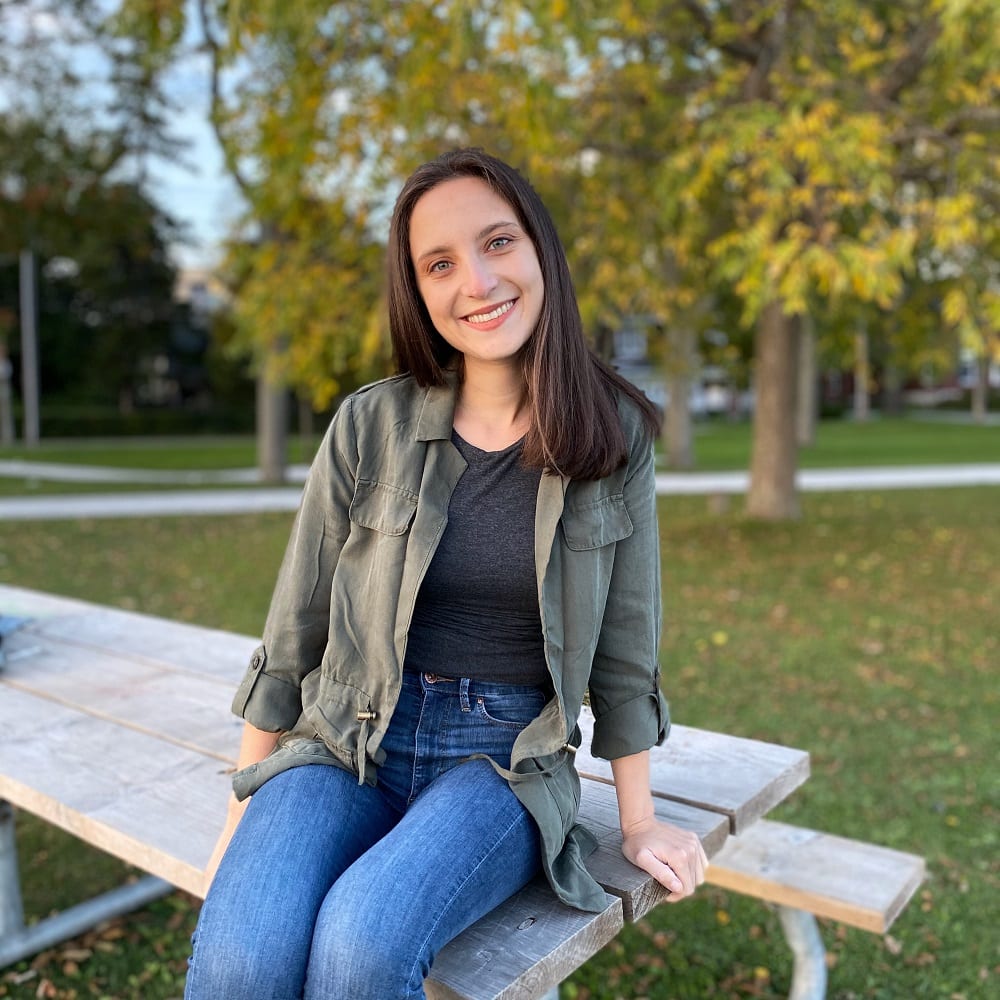
“Like everyone else, I was following the developing COVID-19 pandemic earlier this year. Though it initially seemed so distant, the pandemic became much more real when the first cases began to appear in Canada, and even more so when my partner, who has just completed medical school, was pulled off his clinical rotations for his own safety.
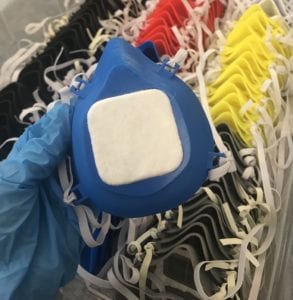 I wondered whether there was anything I could actively do to help preserve the safety and wellbeing of my family, friends, and community at large. An opportunity presented itself during one conversation about the pandemic I was having with my friends, where we discussed the issue of a lack of personal protective equipment (PPE) available to frontline healthcare workers. We had the idea to 3D print the needed PPE using resources in the community and immediately launched into action.
I wondered whether there was anything I could actively do to help preserve the safety and wellbeing of my family, friends, and community at large. An opportunity presented itself during one conversation about the pandemic I was having with my friends, where we discussed the issue of a lack of personal protective equipment (PPE) available to frontline healthcare workers. We had the idea to 3D print the needed PPE using resources in the community and immediately launched into action.
We began by talking to local libraries, engineering students, research labs, and community members about using their 3D printers. We asked fellow students to help us with assembly and delivery. We devised a contact-free pickup and drop-off system to ensure that we were all social distancing. We began crowd-sourcing and applying for grants to fund our activities. Now, less than a month since starting the project, we have raised over $30,000, have over 100 3D printers in use, printed over 5,000 masks and shields, and delivered them to frontline workers at local clinics, hospitals, pharmacies, retirement homes, and other institutions. Our group has also developed 3D-printed isolation tents for healthcare centres and even began innovating N95 mask and COVID test swab prototypes that are currently under development.
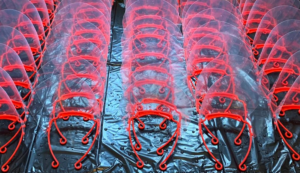 The level of generosity and solidarity that my team and I have experienced has been truly humbling. I am so proud to be part of this incredible initiative and to have responded to adversity in such a productive way.” – Jessica Gahtan (BBA ’16)
The level of generosity and solidarity that my team and I have experienced has been truly humbling. I am so proud to be part of this incredible initiative and to have responded to adversity in such a productive way.” – Jessica Gahtan (BBA ’16)
Jessica Gahtan (BBA ’16)
Schulich School of Business
Finance, Accounting and Fundraising Lead, 3D PPE Kingston
Jessica Gahtan, Alumni

“After I moved to Toronto in the early 2000’s, I was really missing the simplicity of life in Northwestern Ontario. When I was young, my parents used to take my brother, sister and I up to camp on remote islands on Crownland. We would portage into lakes and spend time swimming and running around, finding fox dens and collecting crayfish. We always brought food from my parent’s garden and caught fish to eat. When I was young, I never imagined that this wasn’t how every Canadian kid lived.
In Toronto, I started getting involved in community gardening to be outside and connected to the earth. I was on the steering committee for the Christie Pits Community Garden and helped to build it. I had a backyard and was able to grow some of my own food. I think it’s natural for people to want to find a way to go home as they get older. I will always feel such a strong connection to the land and the water back home. I dream of it all the time. I think my strong connection to my home in the North is what has made me connected to environmental issues and sustainability.
Most of the work I’m doing right now to make an impact is through my current position at Lush Cosmetics as a Sustainability Coordinator, where I work with the rest of our sustainability team to help develop engagement programs, support events and work on sustainability road mapping and target setting for the business. As a mature student in the Faculty of Environmental Studies, I’m learning about how to bring more social justice into the work that I currently do and to understand problems from different perspectives.
What really drives me is my desire for people to be more informed about what is really happening, why it’s happening, how it impacts them over time and what they can do about it. I’m interested in the connections and dependencies of environmental sustainability.
I think it’s important to think about what we purchase, the impact it has on the world, and why we think we need it. What type of value does it bring to my life? I am very interested in how healing wounds in us, as people, can positively impact how we engage in social responsibility and benefit the environment and people living in parts of the world that have long been negatively impacted by our consumption and lifestyles in North America. I think the current system is damaging in different ways to everyone.
In order to advance sustainability and environmental justice, we must address the linear economy we’re all part of, some benefitting from more than others. I think it’s important to stay grounded when thinking about problems such as these and to push forward with everyday actions that are tangible and create small changes. I don’t have an answer to these challenges but going back to school is part of my journey to figure out how I can contribute to finding them.”
Amanda Galusha
Sustainability Coordinator, Lush Cosmetics
Student, Faculty of Environmental Studies
Amanda Galusha, Student

“My big interest in astronomy came from when I was a kid. I grew up in the 80s and there was so much exciting stuff happening in space. There was the space shuttle, there were the Voyager probes, and Star Wars was the big movie. Also my father built his own telescope from scratch. And once I saw what you could see in a telescope, I knew I wanted to be an astronomer.
Adam Muzzin
Assistant Professor, Department of Physics and Astronomy
Faculty of Science
Adam Muzzin, Faculty
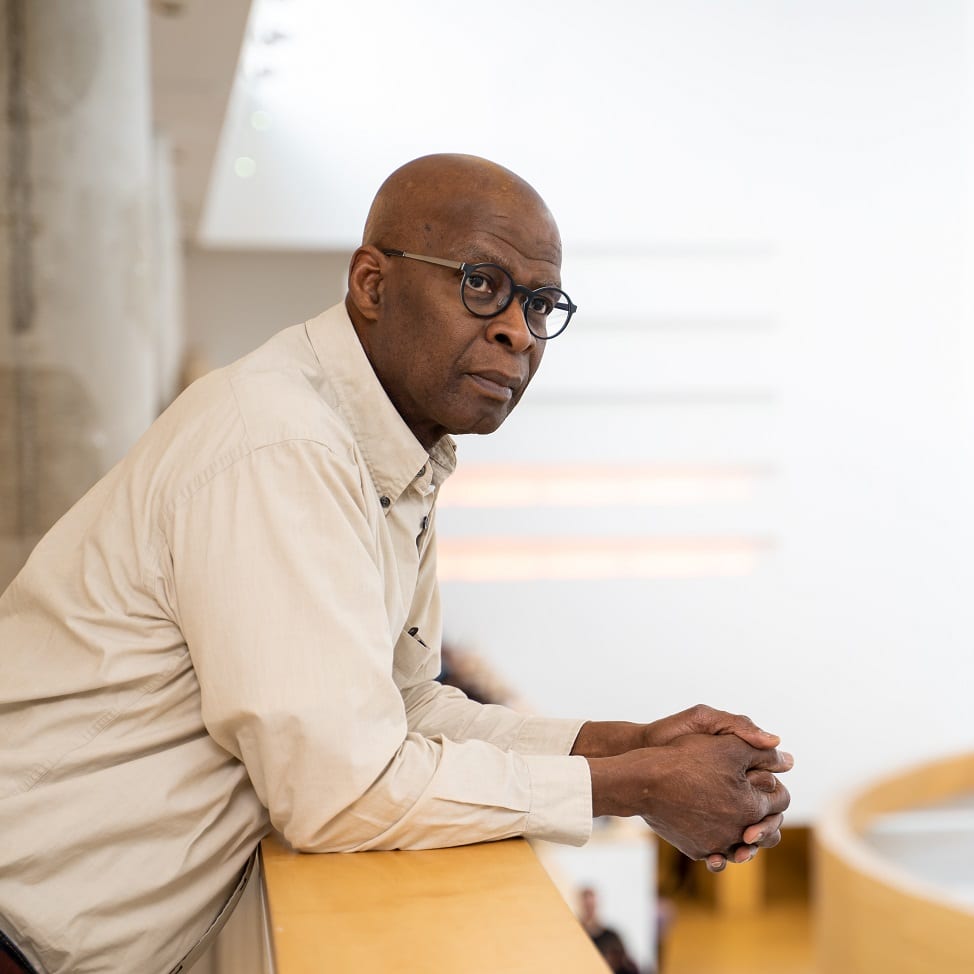
“Community plays a significant role in our lives and in our educational pursuits. Hence, the questions which we pursue in our teaching, service work, and/or are informed by the community to which we belong or with which we identify. So, it is understandable that my entry into sociology, in part, would be inspired, my questions as a young person, and of course, my interest in addressing the issues and problems affecting the lives of people in the communities with which I was community affiliated and worked
My early sociological work explored the ways in which culture — particularly that of the society – shapes and is shaped by individuals. Particularly, interesting to me was to critically examine how “race culture” operates in sociological thinking to obscure the ways in which race operates in Canadian society as a barrier to the full participation of racialized and Indigenous citizens. Hence, I wanted a sociology that brought awareness to inequity, was cognizant of privilege and power, encouraged appreciation of our responsibilities to our own and wider communities as scholars, and inspired critical consciousness of the dominant culture.
The fact is, in Canada, race matters, and is often used to define a person, but to establish social location and opportunities.
In this regard, my early questions in sociology explored issues pertaining to Black and other racialized youth noting how their experiences as new immigrant operated in their settlement, schooling and educational patterns. And I also explored the role of community in the lived experiences of young people living urban and suburban communities.
In my work on university, and having recently completed a national study – published in The Equity Myth: Racialization and Indigeneity at Canadian Universities – with colleagues Frances Henry and Enakshi Dua, York, Audrey Kobayashi, Queen’s, Peter Li, Saskatchewan, Howard Ramos, Dalhousie, and Malinda Smith, Edmonton, there is clear evidence for the work I do supporting equity and inclusivity programs in universities. These programs must to promote recognition of how racialized faculty members advance the scholarship of institutions, utilize innovative pedagogical approaches to teaching, enhance academic programming. assist in student recruitment, engagement and retention, and contribute to the building of university-community partnerships.
Indeed, universities stand to benefit substantially from a diverse faculty. The presence of racialized faculty members demonstrates to the Canadian public the universities’ responsiveness to the educational and research needs, interests and aspirations of all Canadians – a truly important commitment to marginalized people whose tax dollars finance these institutions.
Social scientists who work with marginalized and racialized people have a responsibility to challenge how the prevailing notions of democracy, fairness, meritocracy, multiculturalism, colour-blindness, and neutrality serve as barriers to their realization of equitable treatment and outcomes.
Some four years into my teaching at York, I was invited by colleagues from the Teacher Training Department of Uppsala University in Sweden to teach a course to student teacher there on cultural diversity – or as they named it, multicultural education. It was a time when a Sweden was seeing a surge in their immigrant and refugee population. For 17 years, I taught that course annually to Swedish and later international students.
I contend that until we have racialized scholars studying and writing about their lives and of their communities, then the stories proffered will always be incomplete and told from an outsider perspective.” – Professor Carl E. James
Carl E. James holds the Jean Augustine Chair in Education, Community and Diaspora in the Faculty of Education; and is also the university’s Affirmative Action, Equity & Inclusivity Officer. He holds cross-appointments in Graduate Programs in Sociology, Social and Political Thought, and Social Work. James’ research interests include: examination of how race, ethnicity, gender, class and citizenship/immigrant status intersect and mediate accessible and equitable opportunities and outcomes in education and employment for racialized youth – Black youth in particular. In 2017-2018, he was one of six education Advisors to the Ontario Minister of Education and Premier. He was awarded an Honorary Doctorate from the University of Uppsala, Sweden and is a Fellow of the Royal Society of Canada.
Carl James, Faculty
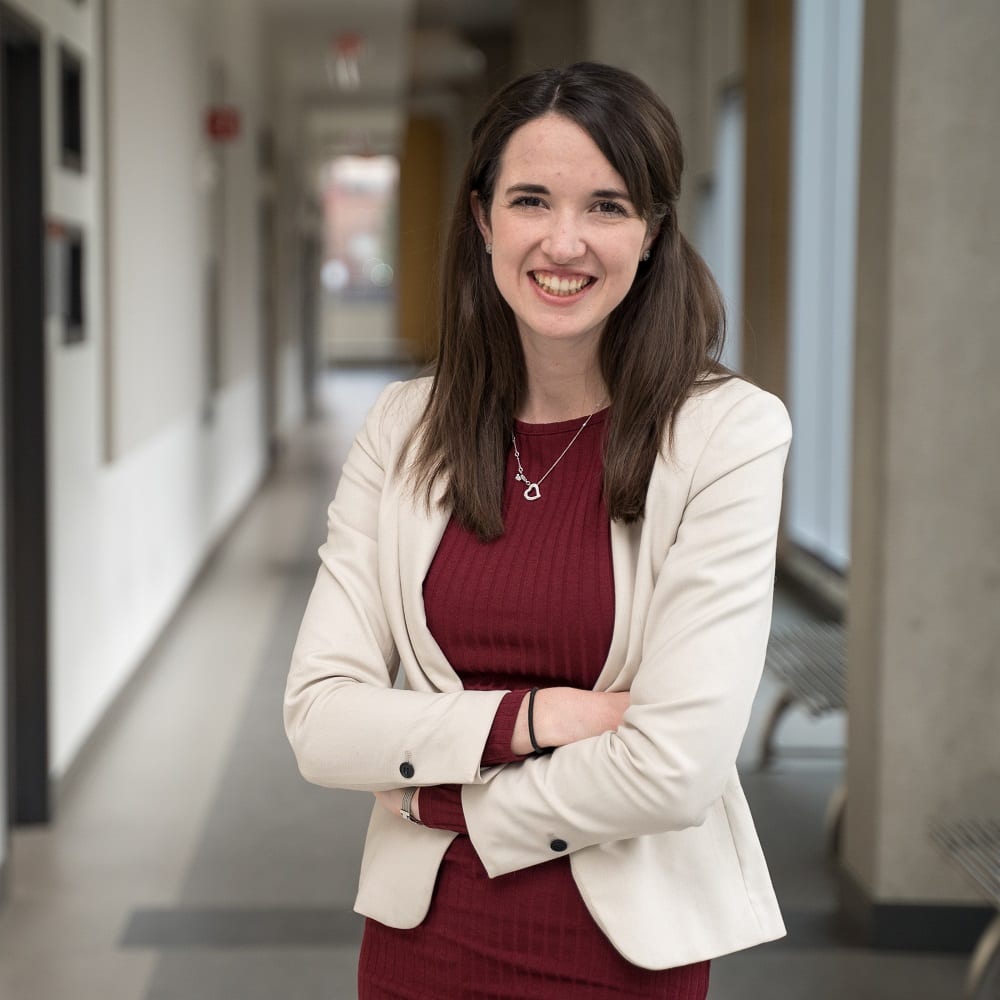
“When my mom was in elementary school, her best friend went missing. About six years ago, they were reconnected and my mom began to learn her story. At the age of 14, my mom’s friend was trafficked for sex in Ontario, Canada. When I heard her story, I was shocked and heartbroken. I began asking questions and started doing research to better understand the realities of human trafficking. I was compelled to fight this injustice and to find ways to prevent other people from being trafficked.
In 2013, I joined Untied Freedom, an anti-human trafficking task force, to raise awareness and funds for a local and a global anti-trafficking organization. Through our events, I learned about an organization called Mahima Homes in India. The work they were doing to support individuals post-trafficking was unparalleled. I hoped to learn from their efforts to share practices in Canada in order to strengthen our approaches to reintegration and rehabilitation.
During the Masters of Education program at York University, I visited Mahima Homes and listened to the stories of women and girls who had been trafficked as part of my thesis research. They shared their stories of resilience and their dreams for the future. The freedom fighters – the women and girls who shared their stories with me – inspired me through their courage, their desire to support others, and their outlook on life.
When I returned to Canada, I was invited to share with the Federal Government learnings from my research on human trafficking in India with the Standing Committee on Justice and Human Rights. It was a privilege and honour to be invited to advocate on behalf of the women and girls who had entrusted me with their stories.
During the following months, I was deeply troubled in my workplace and volunteer settings; I felt disconnected from my purpose. I believe the most important thing in life is relationships, and after the tragic passing of Tatiana Blackburn, I was moved by the immeasurable impact that she made in her 20 years of life. I wondered, “How can I use my time, skills and knowledge to fight for justice and to love other people authentically?” Shortly afterwards, I left my “dream job” and began working for Fight4Freedom, a Canadian organization dedicated to ending sex trafficking and sexual exploitation.
Today, I am the Education and Research Coordinator. In this role, I help raise awareness as a preventive measure and conduct research to disseminate new knowledge on human trafficking. Alongside other team members, I journey with individuals impacted by exploitation and support them in various ways. In January, I am launching a TV show called “Freedom Fighters: Code Gray” which will inform people on human trafficking and empower them to make a difference.
My work at Fight4Freedom is rooted in the belief that every human being has value and worth. If you look at the sheer statistics of human trafficking in the world, it can be overwhleming. I want to highlight that each number represents a different person with a unique story and dream for the future. We need to continue to find ways to work together to shed light on this injustice and support individuals who have been impacted by exploitation in Canada and in the world.”
Mikhaela Gray, Alumni (M.Ed. ’18, BA ’14)
Faculty of Education and Glendon Campus, York University
Education and Research Coordinator, Fight4Freedom
To learn more about human trafficking and resources available in Canada visit: helptraffickedpersons.org. If there is immediate danger or if you suspect a child under 18 is being trafficked, call 911 or your local police service. For information and support, call Canada’s confidential Human Trafficking Hotline: 1-833-900-1010 or visit www.canadianhumantraffickinghotline.ca.
Mikhaela Gray, Alumni
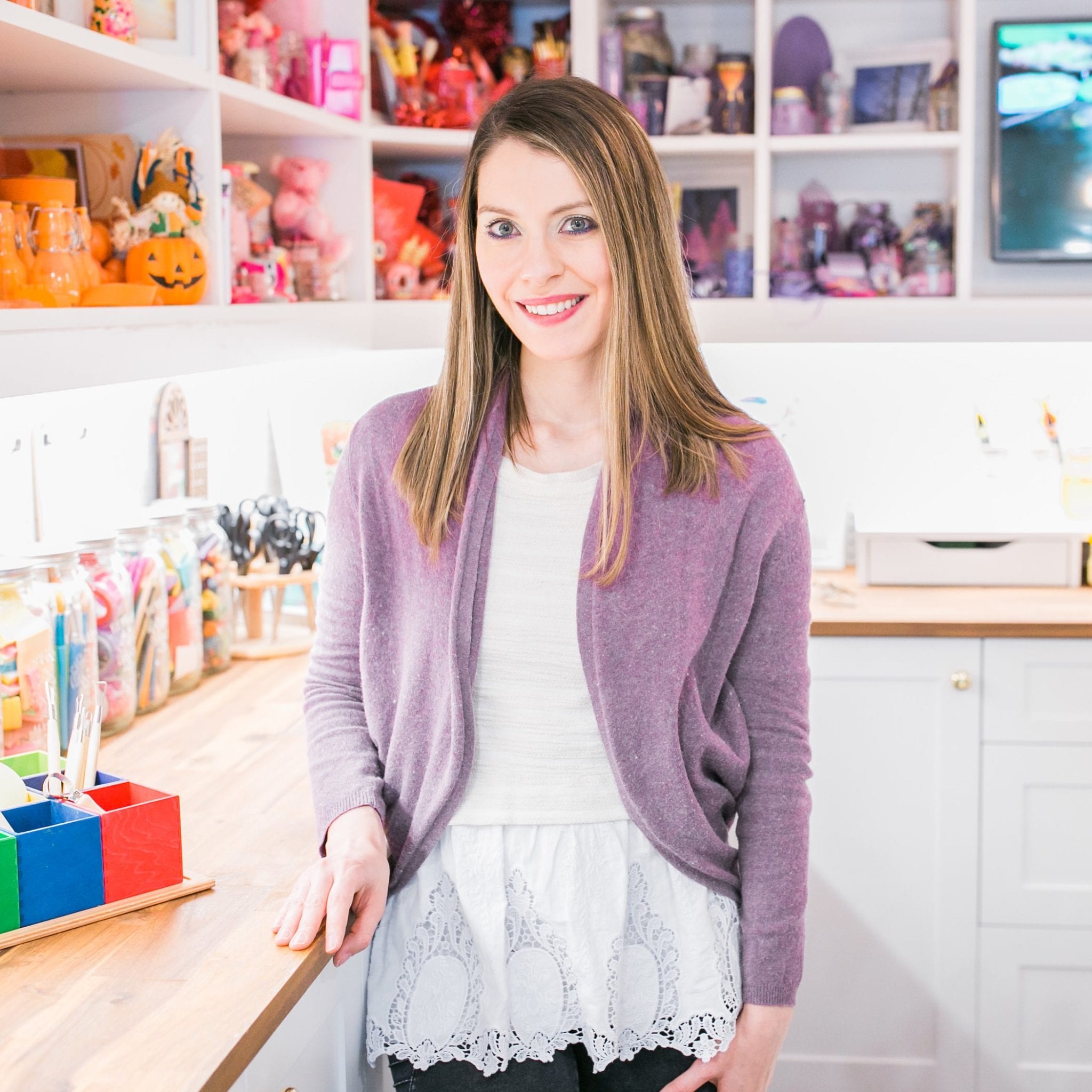
“York University played a pivotal role in helping me to achieve all of my success. I always had the support of my supervisors Dr. Isabel Killoran and Dr. Gillian Parekh and from fellow graduate students Marlena Ochnik, Ellen Brown, and Niki Belegrinis. My experiences both theoretically and practically have helped to shape me into the educator that I am today and have exceeded my wildest dreams! I am grateful for this strong foundation to my career in education and to Dr. Carol Anne Wien for introducing me to the Reggio Emilia Approach that I have travelled to Italy to learn.
Joanne Babalis (BEd ’06, MEd ’13)
Faculty of Education
Founder of Transform Ed Consulting Services and Blog
Joanne Babalis, Alumni
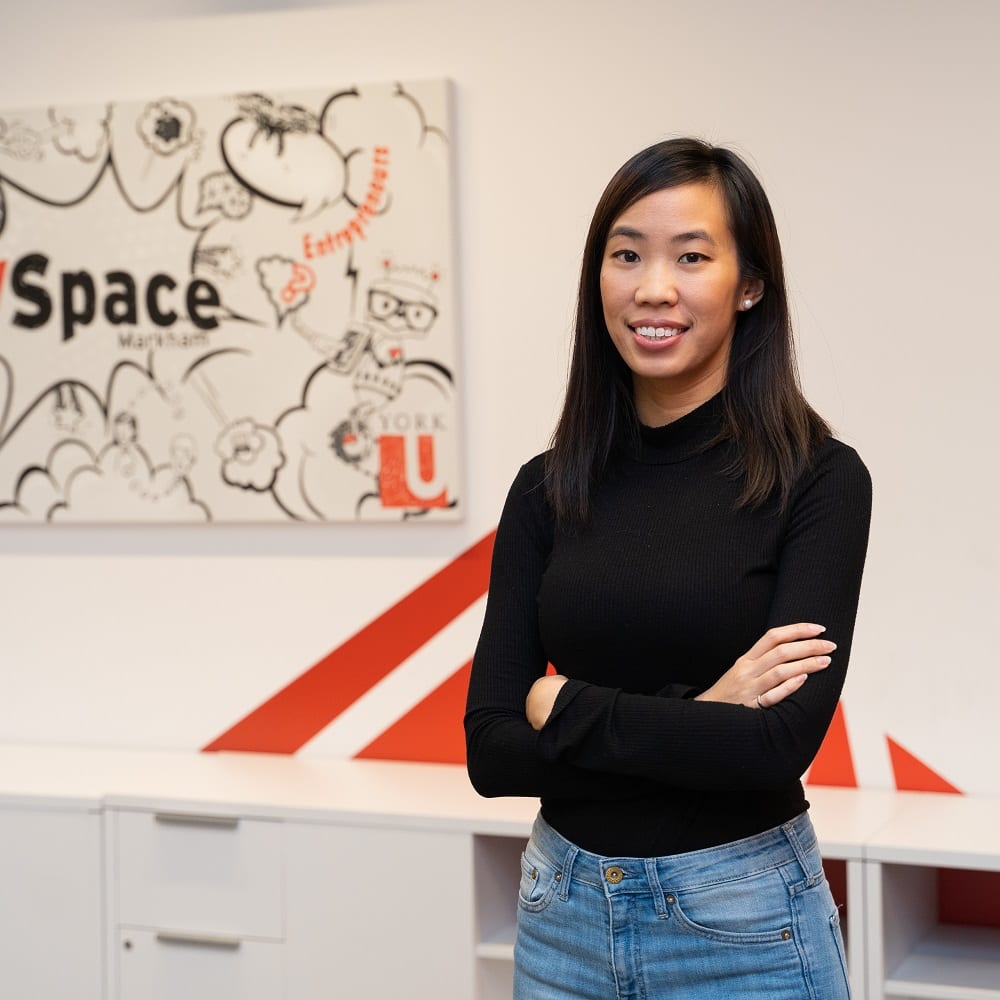
“I never thought I would become an entrepreneur. When I was doing my MBA, I knew I wanted to change the world and make it a better place. But my vision of that was joining a big company as their Director of Sustainability. Over the course of my studies I started realizing that there were problems in the world I could solve. When I was looking at job postings, I just felt like I was pigeonholed or there were bigger issues that needed answers.
Towards the end of my degree, I started thinking about an entrepreneurial journey. Then during the last week of my MBA, both my aunt and brother were diagnosed with cancer. That changed my career trajectory. What others may not know, is that I was my aunt’s caretaker for three months before she passed, and I wanted to spend as much time as I could with my brother before he passed from stage 4 brain cancer 3 years later. Both of their cancers were not genetic, so that meant that something gave it to them, including lifestyle, diet or environmental factors. I realized that I wanted to be part of the prevention, so that others do not have to go through what my family and I had to go through. Given my background in chemical engineering, and my passion for the environment and the sustainability sector, I focused on the cosmetic industry.
Before women leave the house, they are exposed to 168 unique chemicals through their beauty products, and many of them are potentially harmful. So, I wondered how do I solve that? There was a market for these safe products, and brands wanted something that consciously formulated beauty products but there was a huge gap. I started researching with the brands, asking them questions and kept asking what kept them up at night. After a bunch of back-and-forth consultations, the idea for CertClean, a certification for safer beauty and personal care products, was born. Since I had built relationships with the companies who were interested in the idea, I had tremendous support from the brands, so from day one the CertClean was revenue generating. I had clients wanting the certification and seal of approval before I even had a name or a logo.
After successfully launching the company, when I would tell people about the certification, they were pleased that they would not be misled by products being greenwashed, but would always ask, what do I use? What do I recommend? That was the nugget, people are not going to buy a product just because the ingredients are vetted, unless they know it works. So that is where PurPicks came to be, a trip advisor for organic skin care.
Every time if I can help someone to buy a safer shampoo or skin care product, it is so rewarding knowing we are helping reduce the chemicals people are exposed to, prevent these chemicals from entering our waterways, and preventing illnesses like cancer – all while pushing the industry to adapt.”
Jenise Lee, Alumni (MBA ’12)
Schulich School of Business
Founder of CertClean and PurPicks
Part of the YSpace Incubator
Jenise Lee is a graduate from The Schulich School of Business and is the founder of Cert Clean and PurPicks. She won Schulich StartUp Night pitch competition, recognized as top 5 startups in Canada at the Alibaba Global Pitch Competition and will be pitching for up to $5 million on a global stage in Hong Kong, was named top 10 beauty tech all-time on Product Hunt, finished third at Orbitz Pitch Competition, and shared the stage with two former “dragons” (Bruce Croxon and Brett Wilson) from Dragon’s Den at the recent Ontario Economic Summit to shed light on the challenges of scaling startups and what industry, government and post-secondary institutions can do about it.
Jenise Lee, Alumni
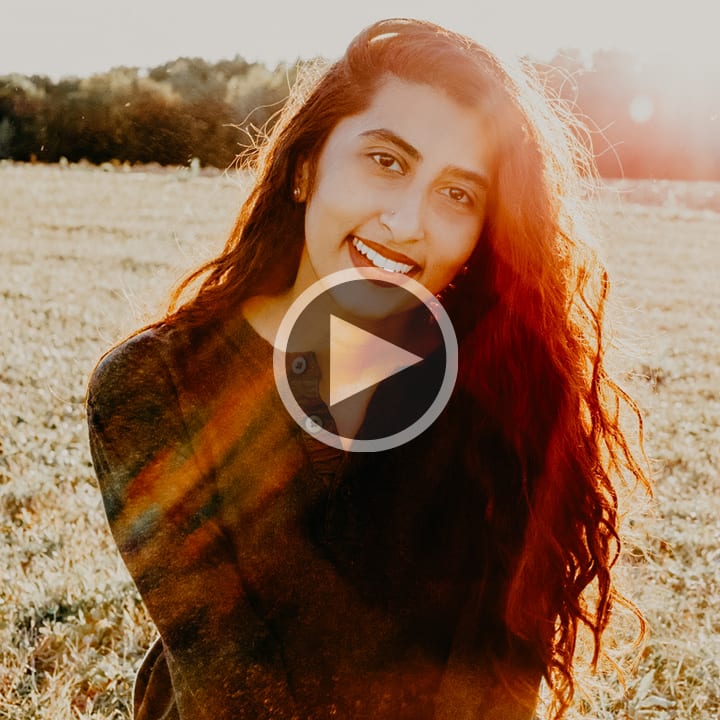
“During the first month of brain injury the protocol that the hospital usually gives you is one month of dark room. The hardest part is to kind of just keep dreaming through all of that and art helps me do that.
Aphiraa Gowry, York University Alumna (BA ’19)
Human Rights and Equity Studies
Faculty of Liberal Arts and Professional Studies
Website: www.aphiraa.com
Eco- friendly Apparel: http://www.aphiraa.com/clothing
Aphiraa Gowry, Alumni
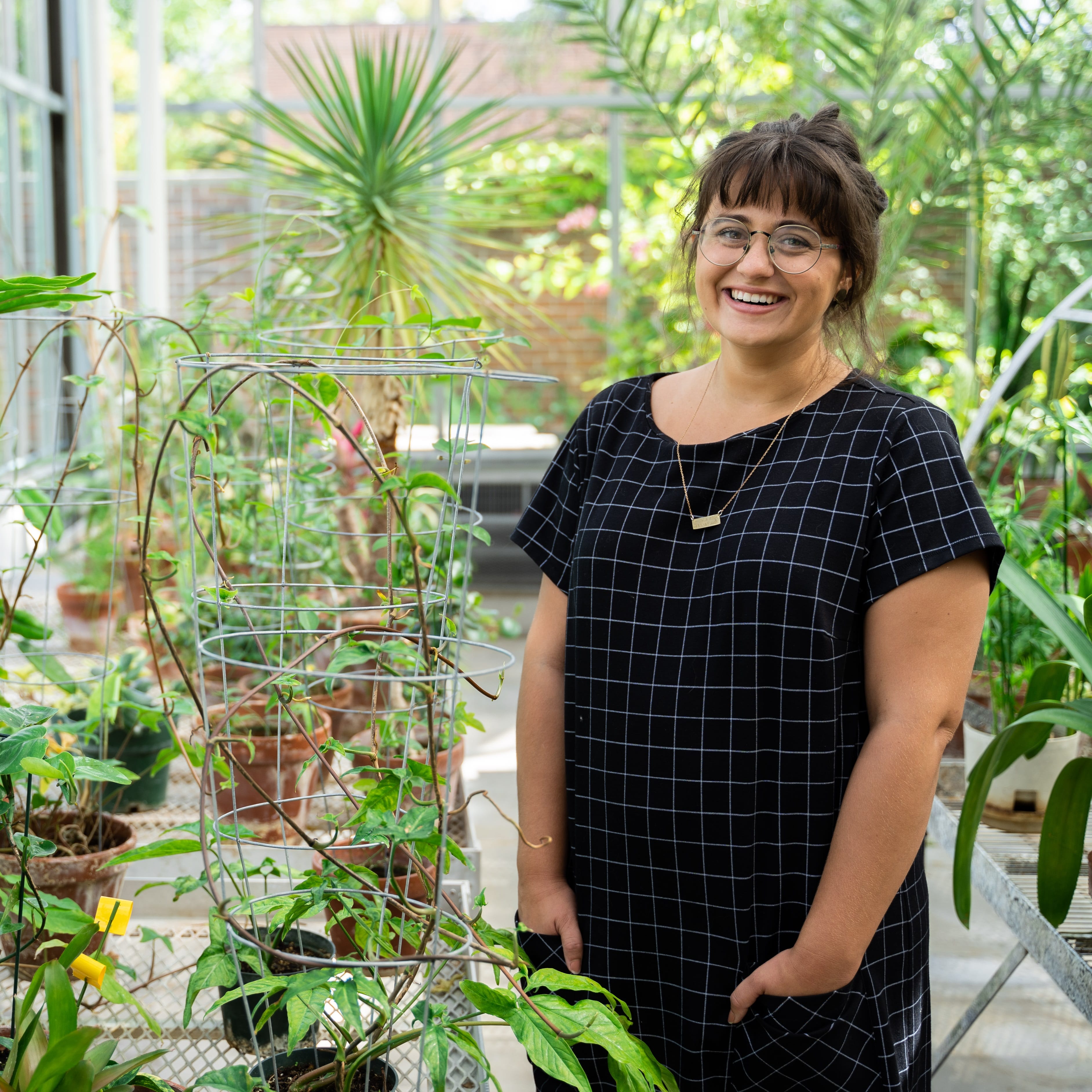
“I was born in rural Indiana and lived on a large plot of land. We weren’t farmers, but it was far enough from developments that I had a lot of natural influences. Nature was like my toys, the pinecones, and feathers, and seeds that explode when you touch them. Like most ecologists or biologists in general, I was exposed to nature at a young age, and that opportunity sparked my passion for nature and discovery.
That is one of my earliest memories of why I wanted to become a scientist. Flash forward to today and I never thought I would be working and doing environmental research in deserts of all places. People always ask me why I would ever want to work in this harsh environment, but they don’t realize how diverse deserts are. Who could blame them, I didn’t realize either! But these ecosystems aren’t the wastelands that you see in old western movies, there’s so much unique and fascinating life. And much of that life is dependent on the reproduction of plants in that area.
Just because a plant isn’t a tree in the rainforest, that doesn’t mean it’s not a valuable part of the ecosystem. That’s why I’m looking at cacti as homes for all sorts of wildlife in deserts. But when these plants are destroyed due to human activity like climate change or human development, the desert ecosystem becomes disconnected. This is why we see more endangered species struggling to survive in areas they’ve adapted to thrive in over millions of years.
My current research looks at how cacti play a very important role as infrastructure for other plants and animals, and how they reproduce and spread over a landscape. Cacti can clonally reproduce, meaning that they’ll drop a branch and that branch will grow into a new individual (try it at home!). But that happens right next to it, and is genetically identical to the mother cactus. Instead I want to see how cacti are sexually reproducing with another across the landscape to diversify the population. And I’m especially curious if birds, which can travel far distances relative to lots of other animals, play a big role in cactus reproduction via pollination or seed dispersal. And especially, what makes a cactus attractive to birds that might be able to help them reproduce?
Thinking of ideas is all well and good, but actually conducting experiments that answer those questions is another matter. While in the California desert this summer, the cacti flowers weren’t blooming because it was unseasonably cold. For the experiment, I needed flowers, so I drove 4 hours to buy 100+ fake flowers and pinned them to cacti. Luckily, within seven minutes birds started to visit these fake flowers. Luckily, the real flowers did end up blooming before I left, but surprisingly, birds had no interest in pollinating real cactus flowers. Why do they only care about fake flowers?
There’s a lot to explore with these findings and why birds go to fake flowers, but not real ones. But the answers could help better understand how to save these environments.
I hope to shed light on the idea that deserts are valuable and worth protecting as much as other landscapes we see highlighted in conservation efforts. That sense of activism and working towards something bigger than myself is really driving my work now. And hopefully it’s worth it, so we can further understand how to keep cacti, wildlife, ecosystems, and our world at large safe.”
Malory Owen
Graduate Student
Department of Biology
Faculty of Science
Malory Owen, Student

“In high-school I never took school seriously, but it wasn’t who I was. I followed that path because I felt it was the script I had to follow. However, when I actually started to deviate from that script, and live life the way I wanted to, I was a lot happier.”
Mujtaba Ahmed-Hassan
Senior Don, Winters Residence
Social Work, Faculty of Liberal Arts & Professional Studies
Mujtaba Ahmed-Hassan, Student

“I was quite upset following the last US presidential election, especially at how all media had become labeled as ‘fake news.’ The message was that nobody can believe anybody anymore, everything is just a matter of opinion, facts and evidence don’t matter. This is the message that was being shared. I felt that the whole point of academic research was being called into question. If everything is just a matter of opinion, why are we wasting so much effort trying to come up with well-reasoned, well-supported arguments in our academic papers?
It was so hard to get motivated to do any research anymore, because our whole epistemology as a society was being threatened. It took me months to get back to doing any research because it was so hard to motivate myself.
I found it very helpful to talk to other researchers who understood the importance of continuing to try to set the record straight with well-founded research. Many were able to articulate really clearly why their research mattered. And through those conversations I realized that these are the kinds of professors who need to be heard from somehow. And it was by connecting to my colleagues that I realized there are so many fascinating, amazing researchers out there.
That was kind of how the podcast came about. And I realized that it wouldn’t succeed unless it was a global podcast, talking to professors from all over the world.
I go into these episodes as someone who’s a trained academic but not an expert in their field. I read their paper carefully and ask them questions about how they structured the paper, and how they conducted this study. It gets at the challenges that a professor faces when they’re trying to do research. I also explore the use of theory. Like, what is the role of theory and how do they go about gathering the data and then theorizing it?
Today, it’s not enough to simply do research and publish it in academic journal. Professors must show why their research matters and the impact it has. So, the podcast features researchers who already have an active public voice, whether it’s on Twitter, in policy-making circles, or right in the local community. I find these professors are really comfortable talking about why their research matters.”
Cameron Graham
Professor of Accounting
Schulich School of Business
Host/Creator of Podcast or Perish
Podcast or Perish gives people an insider’s view on academic research. The podcast will launch on September 9th and new episodes will be shared every second week. They will feature professors studying ecology, economics, botany, marine biology, concussions, accounting and everything in between.
Future guests include:
- Celia Haig-Brown (York University) on Indigenous education and the residential school system
- Heidi Matthews (York University) on international criminal law and genocide
- Michelle Larue (University of Canterbury) on penguins, seals, and Antarctic ecosystems
- Kevin Milligan (University of British Columbia) on longevity and economic policy
- Dawn Bazely (York University) on what plants in the Arctic tell us about climate change
- Victoria Metcalf (National Coordinator, Participatory Science Platform, New Zealand) on enetics, marine biology, and participatory science
- Lauren Sergio (York University) on concussions in sports
- Christine Cooper (University of Edinburgh) on accounting, accountability, and neoliberalism
- Debra Pepler (York University) on bullying in schools
- Markus Milne (University of Canterbury) on corporate environmental accountability
- Ellen Bialystok (York University) on bilingualism and brain development
- Jean-Francois Mercure (University of Exeter) and Hector Pollitt (Cambridge Econometrics) on the economics of innovation
- Jen Gilbert (York University) on sexuality, gender, and queer issues in education
- Marie-Soleil Tremblay (ENAP) on public sector budgets and accountability (FYI, ENAP is the public administration school in Quebec)
Cameron Graham, Faculty

“A single picture can say 1000 words. I try to communicate my personal experiences through photography and share what it is like to be a Muslim woman in today’s world. Because, if I put myself out there, people will resonate with me and my journey.”
Now that I have won my award, what is next?
“Winning the award was a dream come true. When I initially told my dad that I had won this award I had tears in my eyes. Because it was really personal and when I first got into photography, I was not from that background and neither were my parents. They were not sure on what I was going to do and if I would have a career. This award showed them that I was capable of more and getting it really pushed me to my limits and showed that I was going in the right direction, but I just have to work for it.
This award also nominated me to get into the BMO Art Competition where art students were chosen from across the country. There was a winner selected from each province and unfortunately I did not win, but the experience has really shaped me professionally.”
Photography
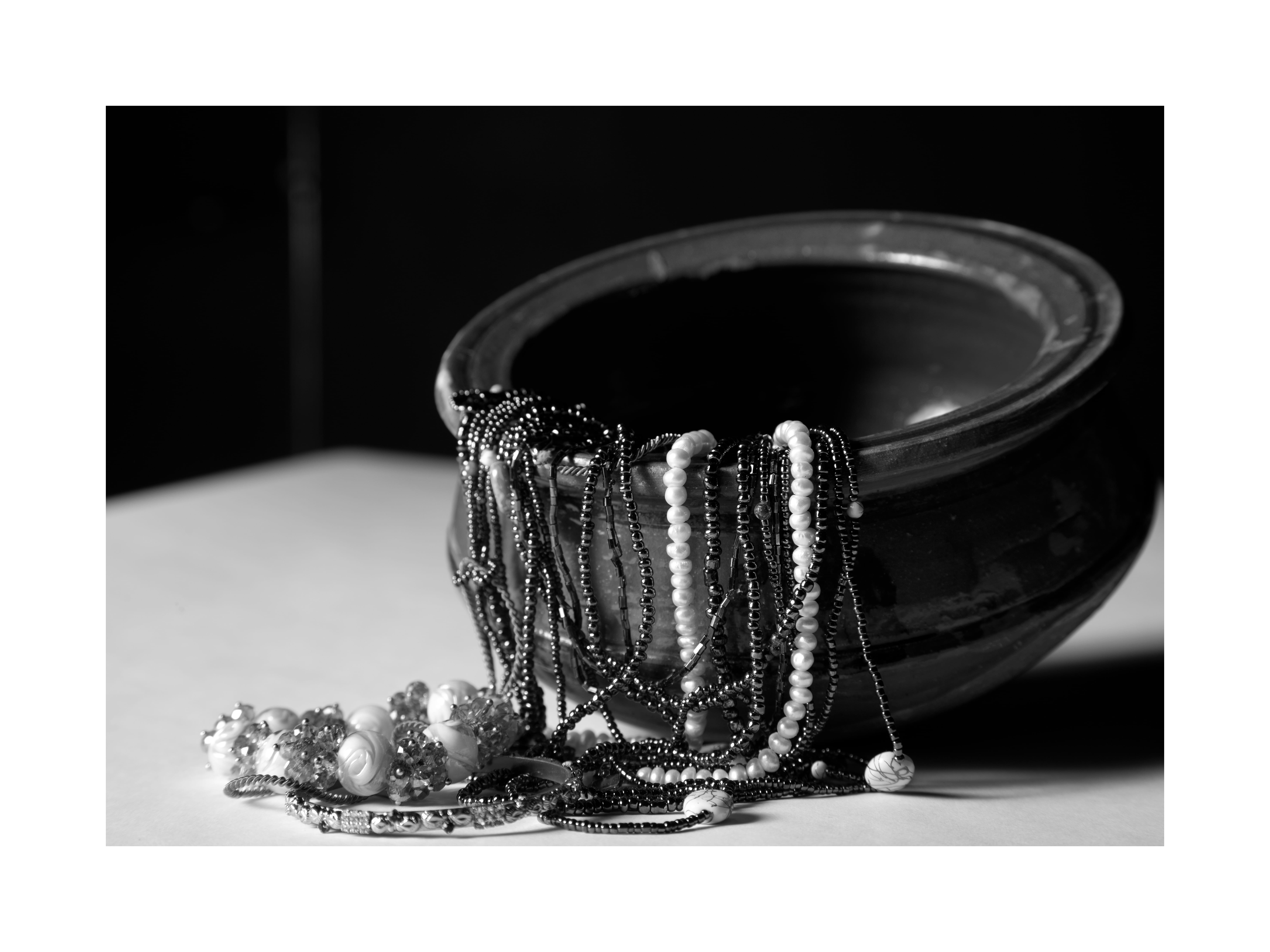
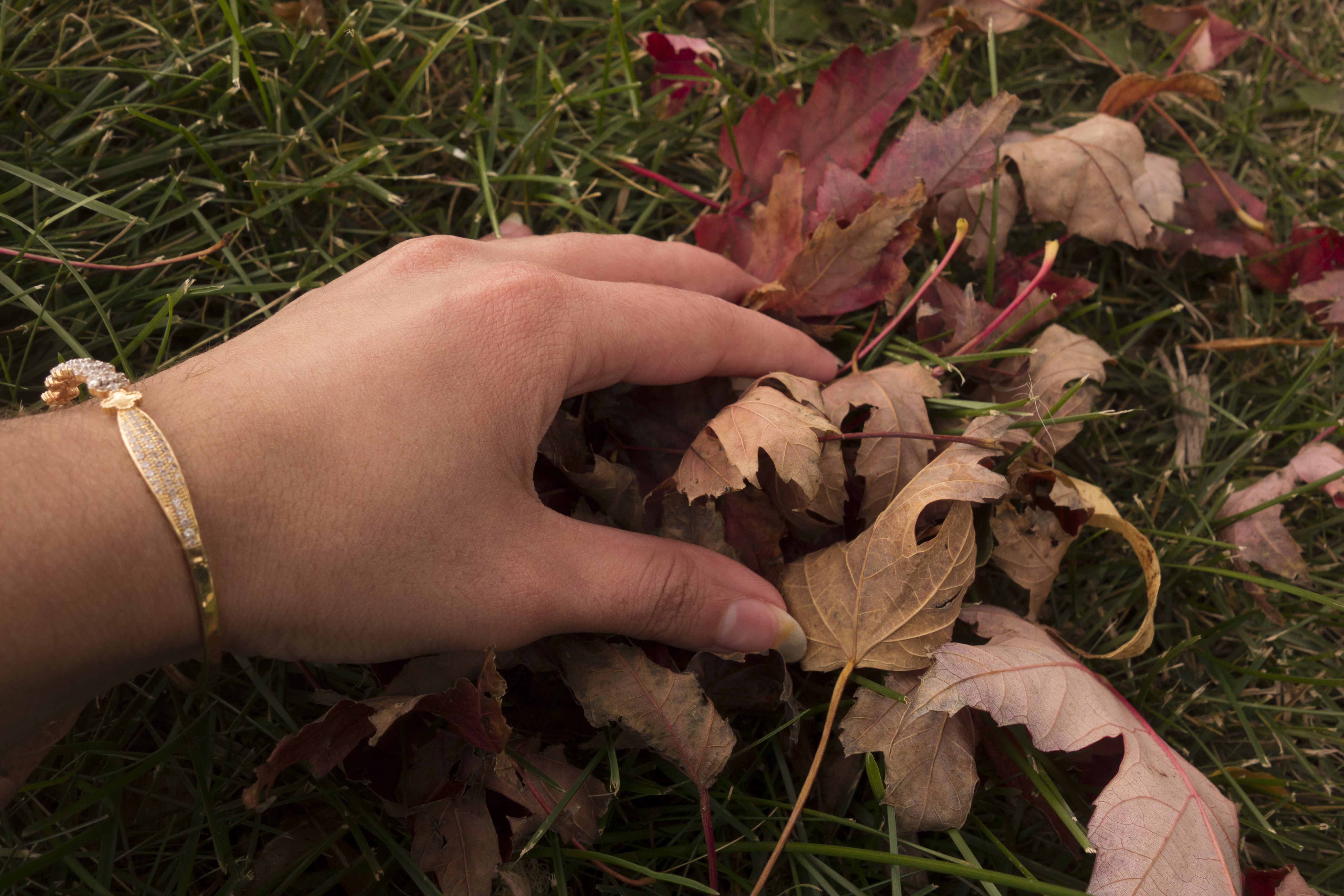
Summayya Tariq
Third Year, Visual Arts and Art History
Faculty of Arts, Media Performance and Design
Senior Photography Award Winner
Summayya Tariq, Student

“It’s nice to know that I can be a person to pave pathways for younger kids and to show them that dreaming this dream really is achievable.
My love for soccer started way back before I could possibly remember because my dad was a football player as well. He loved the sport but one of the things he never did was push a soccer ball into my hands. I only started playing competitively when I was 12 back in Trinidad and Tobago, and that’s when I really fell in love with the sport. Playing soccer, you’re able to meet new people and it almost becomes a pathway to a social group. That was one of the main reasons I fell in love with the sport.
I moved to Canada when I was 17. I came here by myself and I have a lot of family, aunts and uncles here, but my parents and immediate family still live in Trinidad and Tobago and it was a big step to move away. But I came here to get a better education. We knew Canada would provide better opportunities, and looking back at what it turned into, it guided me to where I am today, as a professional soccer player. It’s funny how things turn out.
At 12 years old, it’s every kid’s dream to be what they see on TV. You have this life goal that you could be a professional soccer player. But the TV never shows you behind the scenes work that it takes to get to that point. Until you’re in that transition or that moment, you don’t realize how hard it’s going to be to get to that profession. For me, being a professional soccer player was always a dream. As time went on, it became less and less of a dream, because I started school, went to university, started playing for the York Lions. But nowadays you get to the point where you’re seeing stories of how clubs want kids when they’re younger, 16, 17, 18. As I got older, I never dwelled on it and always said if anything was to happen, it would happen for a reason.
Coming straight from OUA, I got a call to Toronto FC for the college combine, was invited to practice and then within the following months, was offered a contract to become a professional. It was like, wow. Within the following year, moving up again to the next contract and now transitioning into the Canadian Premier League, Canada’s new men’s professional soccer league with York9FC, something kids who are now watching TV, that’s their dream. I’m living their dream. It’s nice to know that I can be a person to pave pathways for younger kids and to show them that dreaming this dream really is achievable. I’m just happy to be a role model for those kids.”
Ryan Telfer is a current professional athlete for York9 Football Club and an alumnus of York University. York9 FC is a men’s soccer team that plays in Canada’s professional men’s soccer league (CPL) and are playing their matches in York Lions Stadium, located on the Keele campus of York University. York Lions Stadium has outfitted additional seating, fan-focused amenities, and soccer-specific grass to its already impressive facilities to create a great soccer-viewing experience for fans. Catch Ryan in action or for more information on York9 FC, go to york9fc.canpl.ca or yorkulions.ca
Ryan Telfer, Alumni
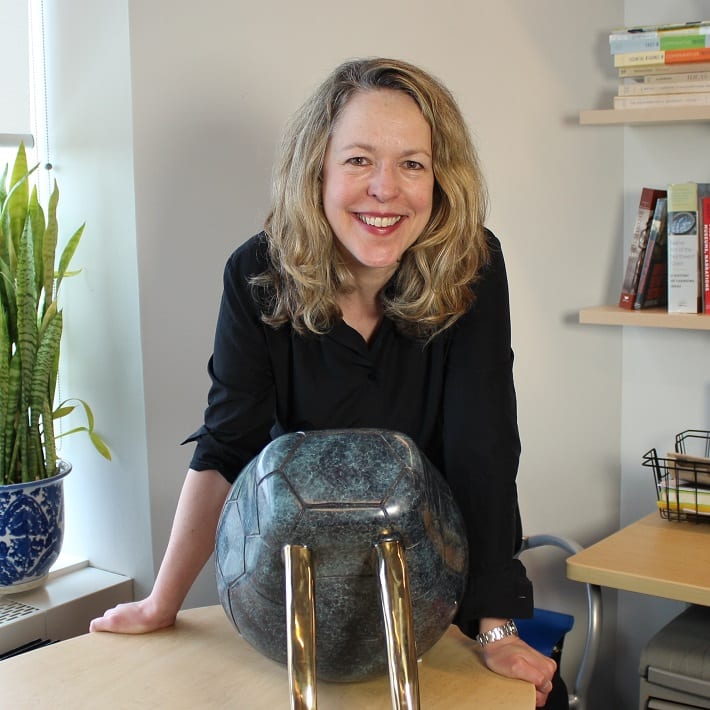
“I have been very fortunate to be mentored by Indigenous artists, colleagues and friends over the last twenty-five years. Their mentorship has shaped my work as a cultural ally, and I cherish their continued guidance navigating urgent issues of Indigenous rights, truth and reconciliation, and the collective necessity of land stewardship in climate change.
Onondaga artist, Jeff Thomas, was the first to teach me about rethinking Canadian cultural heritage from an Indigenous perspective. Inuk art historian, Dr. Heather Igloliorte, has taken this forward to reveal why Inuit art produced for a southern market is “one of the ‘interventions’ that has fostered and safeguarded Inuit culture in the face of numerous affronts to our sovereignty.” Igloliorte and my York University colleagues – Dr. Susan Dion in Education and Angela Norwood in Design – are among my vital co-investigators and collaborators for the SSHRC Partnership grant, Mobilizing Inuit Cultural Heritage. As the Principal Investigator of “MICH” over the last 7 years I have had the privilege to conduct collaborative research on the contribution of Inuit visual culture, art, and performance to Inuit language preservation, social well-being, and cultural identity. Taqralik Partridge, a multi-media artist and author, shared with me the importance of puigurtailigit – don’t forget. My goal continues to be to amplify the practice of core cultural values by circumpolar Indigenous artists and performers.
Ahqahizu, the monumental sculpture in front of York Lions stadium, is a permanent reminder that cultural health is the core element of Inuit Traditional Knowledge, and is the basis for every other kind of health because in it resides a sense of identity, collective social supports for individuals, and the sense of belonging grounded in positive relationships that nurture individuals and communities now and for future generations. The seal feast held last summer at the opening of Tunirrusiangit: Kenojuak Ashevak and Tim Pitsiulak at the Art Gallery of Ontario was another triumph of Inuit cultural expression. The question I want to pose to all Canadians: Is putting cultural health first a radical act of decolonization not just for Inuit but for all of Canada?”
Professor Anna V. Hudson
Department of Visual Art & Art History
Director, Graduate Program in Art History
Tier 2: York Research Chair
Anna Hudson, Faculty
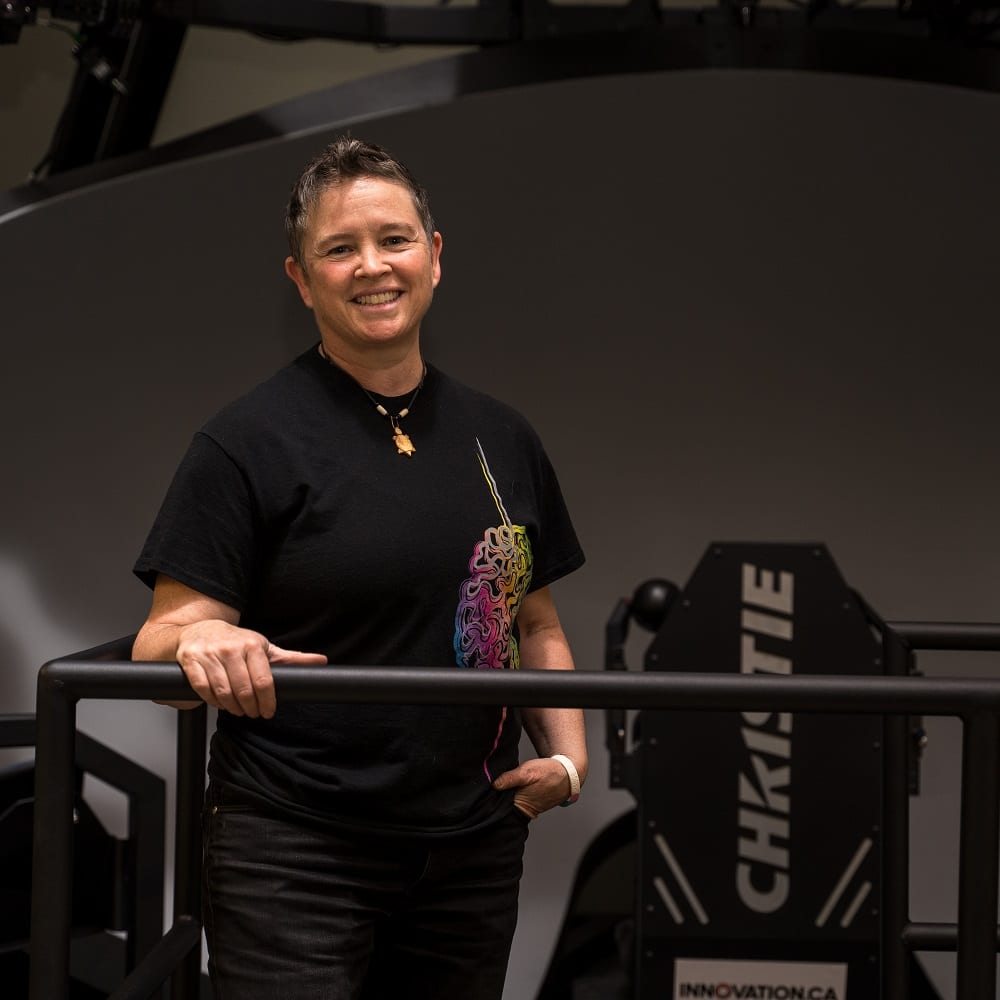
“There are a couple of ways being a queer neuroscientist affects not only my research but my pedagogy. For me, its important to just be out there, capital O out there and be a face for the students.
I teach one of the core courses in Kinesiology, so I teach between 700 – 800 undergraduates a year. I think its really important and useful for those undergrads to see an openly queer neuroscience professor teaching them the basics of neurophysiology, especially with such a diverse student body. I make easy references to my wife during my lectures, I don’t hide it – I’ll say “hey here’s something my wife did the other day” as an example in class. I think just having that representation is essential.
As a professor of neuroscience, I study how the brain controls movement. One of my main research interests is looking at the effects of sex and gender on how the brain works. A lot of the research out there is done by males, for males and therefore it’s quite narrow in focus. There hasn’t been a lot done in sex-related differences and there is almost nothing on gender-related differences. Representation is vital, so just unapologetically being out as a queer professor and as a scientist is important.
I think as long as there continues to be at least a small but vocal group pushing boundaries, then we will not only have better representation of people doing the science but importantly, more representation of the people the science represents. And we’re just not there yet.
Back in the day, we didn’t have pride parades, we had pride marches. We’re still at a point where there are issues and kids still being bullied, and the word gay is still being tossed around as a pejorative term in the school yard. So, I think we still need the spirit of marching to be present in the discussion of Pride Month. The party is fun, but we need to keep the activist messaging going and people need to know that it’s okay to be different.”
Dr. Lauren E Sergio
Professor, Faculty of Health – School of Kinesiology & Health Science
York University
Lauren Sergio, Faculty
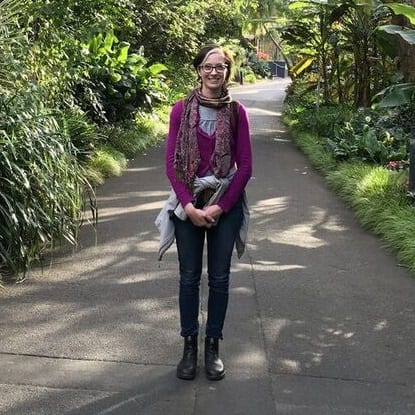
“I grew up in Toronto, right next to High Park. Curious and creative, I gained my deep appreciation for nature spending time at Lake Ontario, riding my bike throughout High Park, making visual art from natural and recycled materials, and spending time in Muskoka, Algonquin Park, and Haliburton. I also grew up riding transit and all the freedom that gave me in my teen years to go to thrift stores and the Goodwill to dress creatively in vintage finds.
For my bachelor degree, I studied chemical engineering at McGill University, and excelled in thermodynamics and calculus that explain rates of change, growth, and material throughput. I was invited to pursue a master’s degree researching thermal plasmas. While my curious side loved the applied physics of an ionized gas, when a visiting researcher exposed me a global estimate of the amount of battery waste to be recycled or disposed of, my heart sank. I couldn’t stop thinking about the sheer volume of waste in the world. Packaging, Styrofoam containers, plastic bags, our single-use, throwaway economy and all of the polluting chemicals that I was trained to produce or clean up that came with it. Thermodynamically, our economy of conspicuous consumption did not make sense to me.
Looking for something different, I found the MES program at York University. There, I discovered ecological economics, where I could apply my thermodynamic and calculus knowledge to understand the economy from the basis of material throughput. I was hired as an intern in an energy company, and I found my passion for transforming energy systems to mitigate climate change.
My curiosity drove me further and I received a PhD in Geography from the University of Waterloo, where I studied the determinants of energy demand and how communities are engaging in a low-carbon energy transition. I was hired as the Alectra Chair in Sustainable Energy Economics at York University, and quickly realized I was one of very few women energy professors. In fact, women make up less than 25% of employees in the energy sector in Canada. I also quickly learned that the transition to a low-carbon economy and climate change mitigation are not possible without a diverse group of people involved in this change, and I went to work. To increase visibility and collaboration, I co-founded a network of Women in Sustainable Energy Research (WISER) as well as the Hoicka Energy Lab, where a diverse group of students are trained with social science methods to examine how citizens, households, organizations, universities, Indigenous communities and people, and municipalities participate in energy activities to influence a low-carbon energy transition.”
Dr. Christina E. Hoicka, B. Eng, MES, PhD (Geography)
Assistant Professor in Sustainable Energy Economics
Faculty of Environmental Studies, York University
Christina E. Hoicka, Faculty
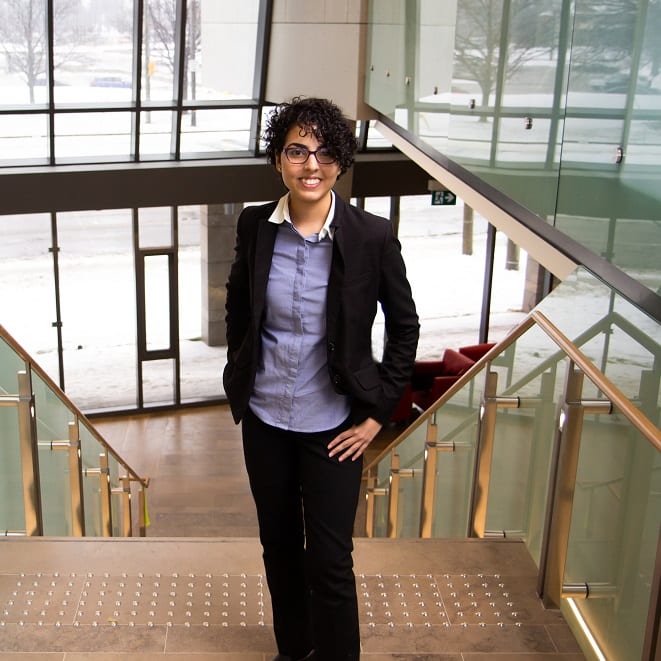
Megan Côté uses Scholarship as a Springboard to Change
York had a chance to catch up with the dynamic Megan Côté, about to graduate with a BBA from the Schulich School of Business. Megan has the distinction of receiving the Yamana Gold First Generation Award for York students with high academic merit, who are also the first member in their family to go to university.
Here’s why it matters.
Once awarded, the generous scholarship is renewed each year for four years. “The Yamana Gold Scholarship changed everything for me,” Megan says. “My mom came to Canada as an immigrant from Guyana. When my parents knew I got into York University, and that I also received the Yamana Gold Scholarship, we were all ecstatic. It was pretty intense.”
Megan told us more, “the CEO of Yamana, Mr. Marrone, is a first-generation university graduate who wants to help students of similar background.”
“It was important for me to meet the person behind this gift, and to say thank you in person. I met Mr. Marrone and we talked about our shared experience of being a first-generation university student. He understood completely how your parents can’t always share your pressures, as they haven’t gone through it themselves. It was great to know that I wasn’t alone in feeling this way.”
The foresight and generosity of the Yamana Gold Award has helped 10 students follow their dreams since its start in 2012. That means the Award has counted towards 40 ‘student years’ of tuition at York!
Peter Marrone (LLB ‘84), chairman and CEO of Yamana Gold spearheaded the creation of the award on behalf of the company. Born to Italian immigrant parents, he feels that the award is important because he is the first in his family to attend university, and now he can give back and improve access to education.
Megan Côté continues, “One thing is for sure, receiving the Yamana Gold Award made clear that we are all connected by generosity. By giving a better life to one person, you also touch their family and their community. One gift can connect you to everything.”
“For example, when you grow up in a low-income family, it can limit so much. There were so many things I couldn’t pursue because they were out of reach. Even school activities and sports, all require extra cash to participate.”
“With the scholarship I could do things that I always wanted. For example, I could join Toastmasters. I’m learning new leadership and communication skills every day and that’s because the Yamana Gold Award opened doors for me. Best of all, I can see my self-confidence growing. Now, I am not afraid to stand up, speak up and speak my mind.”
Megan Côté, Student
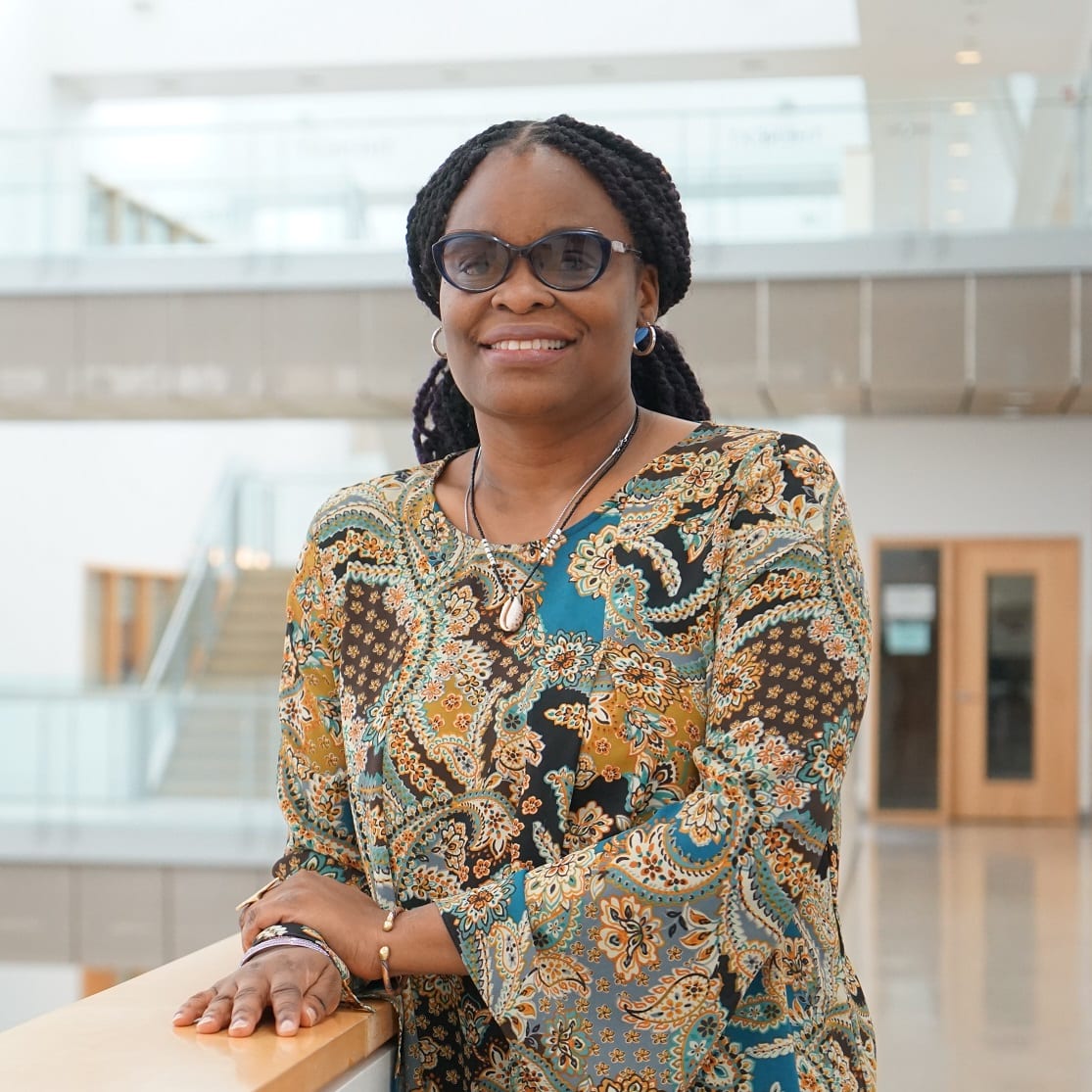
“My entire transnational and transgenerational history and legacy as a descendant of enslaved Africans is one of constantly having to ‘overcome’; ‘come thru’, and ‘break apart/free’. I grew up in working class neighborhoods in Scarborough and was a part of a very vibrant anti-violence women’s community and pan-African activist community from a very young age.
‘Overcoming adversity’ for me is something that is ongoing, challenging, sometimes rewarding, sometimes quite painful, and often requires a great deal of hard work and still might lead to ‘failure’ or unsuccessful results, usually directly related to factors such as anti-black racism, classism, sexism and other forms of intersectional violence. We must resist/fight against and create hope for our communities against adversity to exist and to provide hope for our futures; memories and guidance from our pasts, and survival and thrival in our present.
Black history month (BHM), which we also refer to as “African Liberation Month”(ALM) is a 365-day affair for myself and most African folks in Turtle island (Canada) and transnationally. BHM/ALM is political, it is a gathering for African/Black communities to share our stories, to collectively heal, to laugh and eat good food, see plays, and listen to amazing musicians and poets, read our children amazingly inspired Black writers; and to take a moment and breathe, and strategize how to unapologetically live, work, dream, and resist while being Black 365 days a year, in an anti-black racist world.
I am inspired everyday by African/Black women like my Mommy (how we affectionately call her and often used in African identified homes), who went back to university (York U) at age 40, after leaving school at age 9 and received a double honors degree in Women’s Studies and Sociology, while actively working many jobs in various women abuse (domestic violence) shelters. She passed away at the age of 75 from a heart attack and various complications living with diabetes and kidney failure, and the impact of anti-black racism and other types of intersectional violence on her life is certain. Her fight and struggle to maintain healthy in a world that often did not see her health concerns as valid and her dedication as important, leads me to continue to fight for and research in the areas of anti-Black racism, anti-indigeneity and intersectional violence and their impacts on African/Black, Indigenous, racialized, and marginalized peoples and how they resist – fight to live a healthy/healthier life.
Her legacy and many more whose names may not be well known, inspire me to continue to engage in healing work and health research that creates real change and justice transnationally.”
Professor Roberta Timothy
Assistant Lecturer
Global Health, Ethics and Human Rights
School of Health Policy & Management
Faculty of Health
Roberta Timothy, Faculty
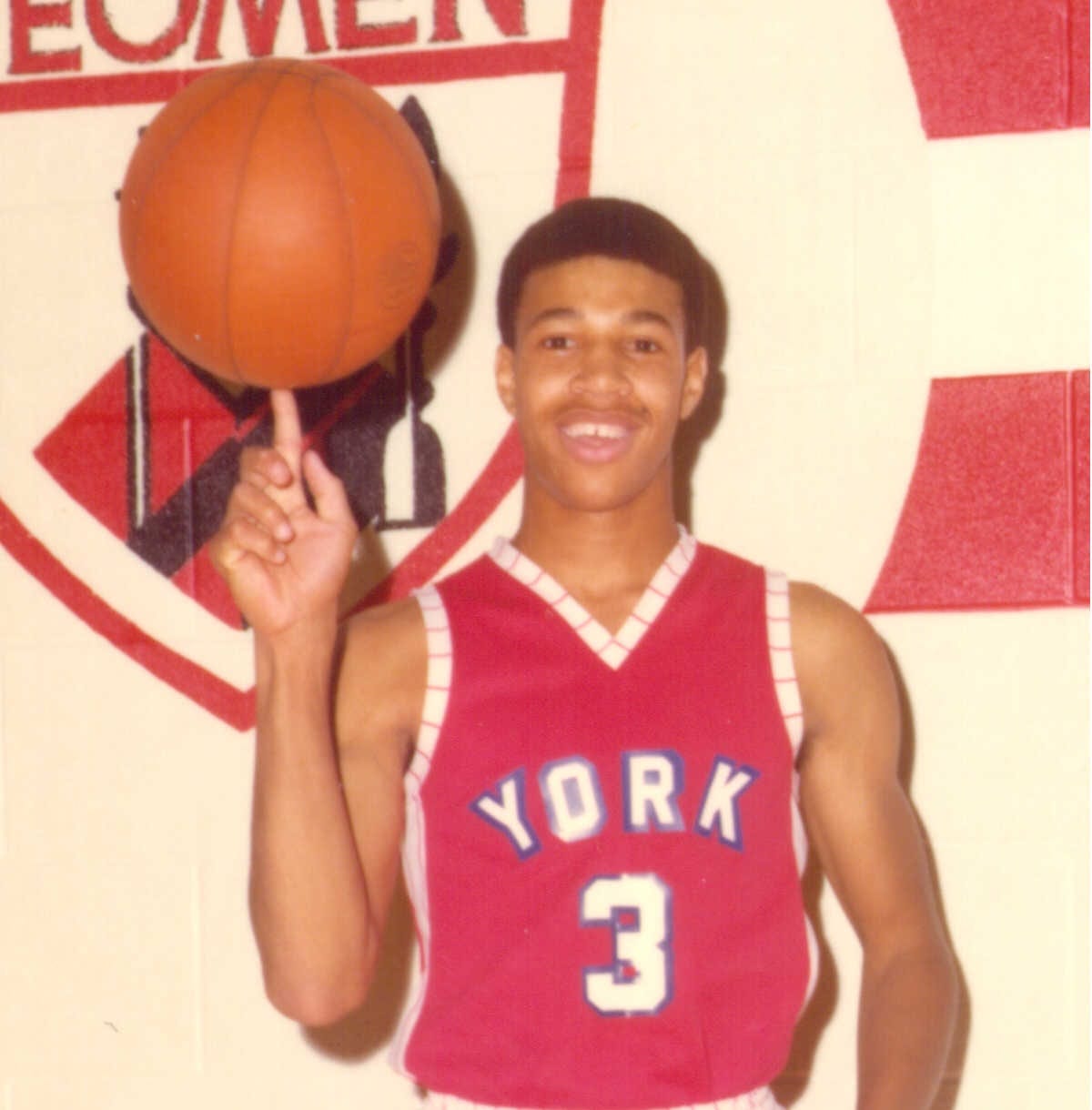
“When I was younger I had skipped a grade, so when I graduated from Oakwood Collegiate Institute in Toronto, I was a year younger than the rest of the graduating class. Not only was I leaving high school at 17-years-old, but I hadn’t hit my growth spurt yet, standing at 5 foot 8. Coming to York University and having not been recruited, I spoke with future Hall-of-Fame Basketball Coach Bob Bain. I shared my interest in trying out for the team. After saying that I played at Oakwood, which had been (and still is) a basketball powerhouse in the city, he replied ‘I saw them play and don’t remember you playing.’ Not shocked by that answer I replied, ‘well that’s because I was a bench player, and occasionally didn’t dress for games.’ Bob, recalling a conversation with the Oakwood coach saying that I would be coming to York, asked ‘what’s your name again, Paul Ford?’ I replied, ‘it’s Paul Jones,’ Bain replied ‘ok, tryouts are Tuesday.’
Coach Bain and I laugh about it now, but that really set the tone for me. I wanted to play basketball and believed I had the skill to play at the next level but had to work extremely hard to earn a spot on the team. When I started playing for the Lions in my second year, I had hit my growth spurt and stood at 6 foot 1. Our team would later go on to win three provincial titles (1977-78, 1979-80 and 1980-81), earned two national championship bronze medals in 1978 and 1979, and I was awarded the Kitch McPherson Trophy as the most valuable player of the Ontario championship game in 1981 as well as earning two provincial all-star honours in 1980 and 1981.
Now in my professional life as a sportscaster for the Raptors, I bring that same athlete mentality from when I was a 17-year-old competing for a spot on the basketball team. As a broadcaster, you must practice, be prepared, take your chances, and control as much within your power. Each game I prepare for over four hours before tipoff, learning names, stats, pronunciations, and other situational information. For example, I want to know with two minutes left, what is the team’s record? Are they going to foul? What are their average free throw attempts? These are all things I look for, and some people think I am crazy or a numbers guy gathering all this information. This industry loses a lot of people who are not willing to grind.
This is why we celebrate black history month, because it gives us a chance to celebrate the success of minorities in the past and inspire today’s youth. In my sense, act as a type of role model where I can say I did not walk into my career or accomplishments, I had to work hard for it. It is fun when you are covering the conference finals, but are you going to bring that same energy and preparedness to a mid-week game against a low seeded team? Or work your way up by carrying the cameraman’s bag, writing the highlight mix or holding the reflector board.
In my personal life, Lisa who’s also a graduate of York, and I have taught our kids that same mentality. My son and daughter are now both enrolled at York and were looking to play volleyball for the Lions, and through hard work have become integral parts of each varsity team. They both were not given anything and had to work for all their success.”
Paul Jones, Alumni
Sportscaster, Toronto Raptors
Paul Jones is a current sportscaster for the Toronto Raptors and a graduate of York University, earning a BSC (Honours), Physical Education in 1980. He is also a member of the York University Athletics Hall of Fame being inducted in 2009.
Paul Jones, Alumni
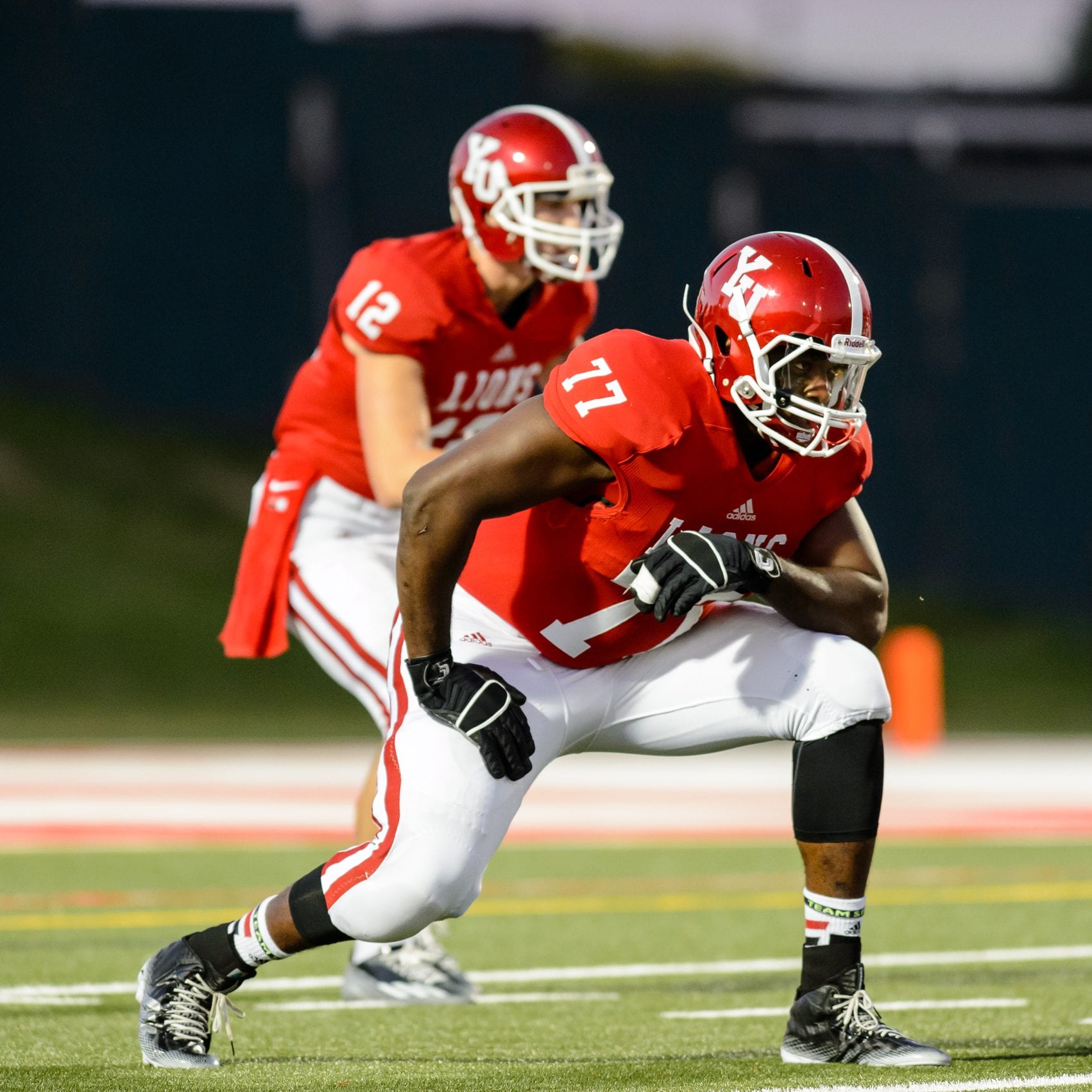
“Giving back to my community has always been important to me; my mom taught us from an early age that we needed to do our part to give back. Toronto drafting me and allowing me to stay in the city just opened the door to allow me to do that on a larger scale. I’m so grateful that I could stay in my community and be the motivation for the kids here.”
Read Jamal Campbell’s full story on the CFL Website
Jamal Campbell
York University Alumni
Former York Lions Football Player
Current Toronto Argonauts Football Player
2017 Grey Cup Champion
Sourced from CFL.ca
Jamal Campbell, Alumni
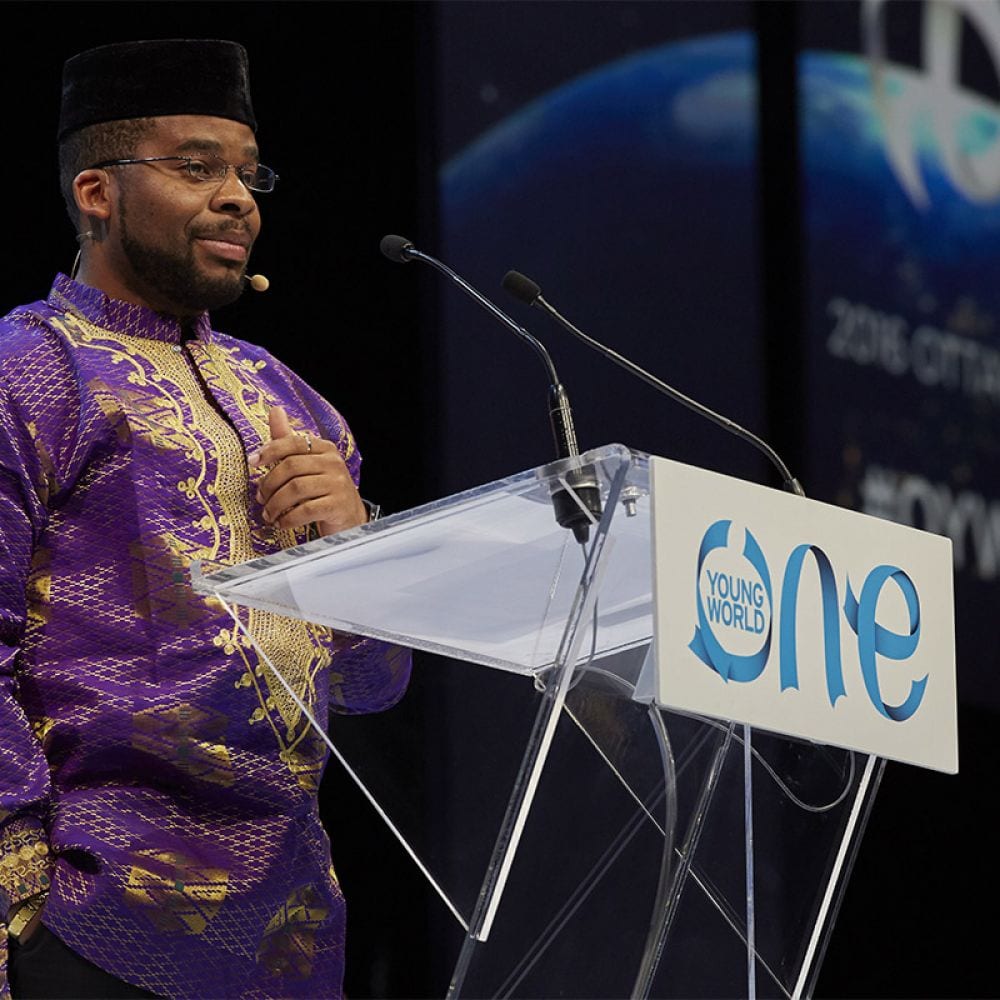
“Because she was a girl, my mum never had the opportunity to finish school, but she did everything she could to ensure that all four of her sons received the best quality education – one she never had. Forever inspired by her, I am a global education youth expert and activist with over 7 years of experience working with governments, Think Tanks, civil society organizations and other youth networks across Africa. My passion is to ensure that every boy or girl completes 12 years of free, quality education in an environment that is safe and allows them to reach their fullest potential.
Going into York U’s Masters program in Leadership and Community Engagement, I wanted to learn more about the different traditional models and theories of leadership and policy and how they have silenced or erased the experiences of and knowledge of the other – most importantly the discussion around diversity and inclusion in the workplace and how this influences the way we lead and serve others.
I have always known a great leader as one who exhibits compassion, empathy and charisma in the way he/she thinks, acts or deliver with a shared agenda. In the same spirit, inspired by my mother, the happenings around me (social injustice, inequality and poverty) led me to take action and speak up about the issues I cared most about. It is common to hear the saying that “great leaders are born not made”; however, for me I do not think I was born a leader. Rather, circumstances in my immediate environment pushed me to become a leader.”
Joannes Yimbesalu, BMLS, MSc, CPH, CID, MLCE
Alumni, Master of Leadership and Community Engagement
Faculty of Education
Twitter: @yimbesalu
LinkedIn: https://www.linkedin.com/in/joannes-paulus-y-01907317
Joannes Yimbesalu, Alumni
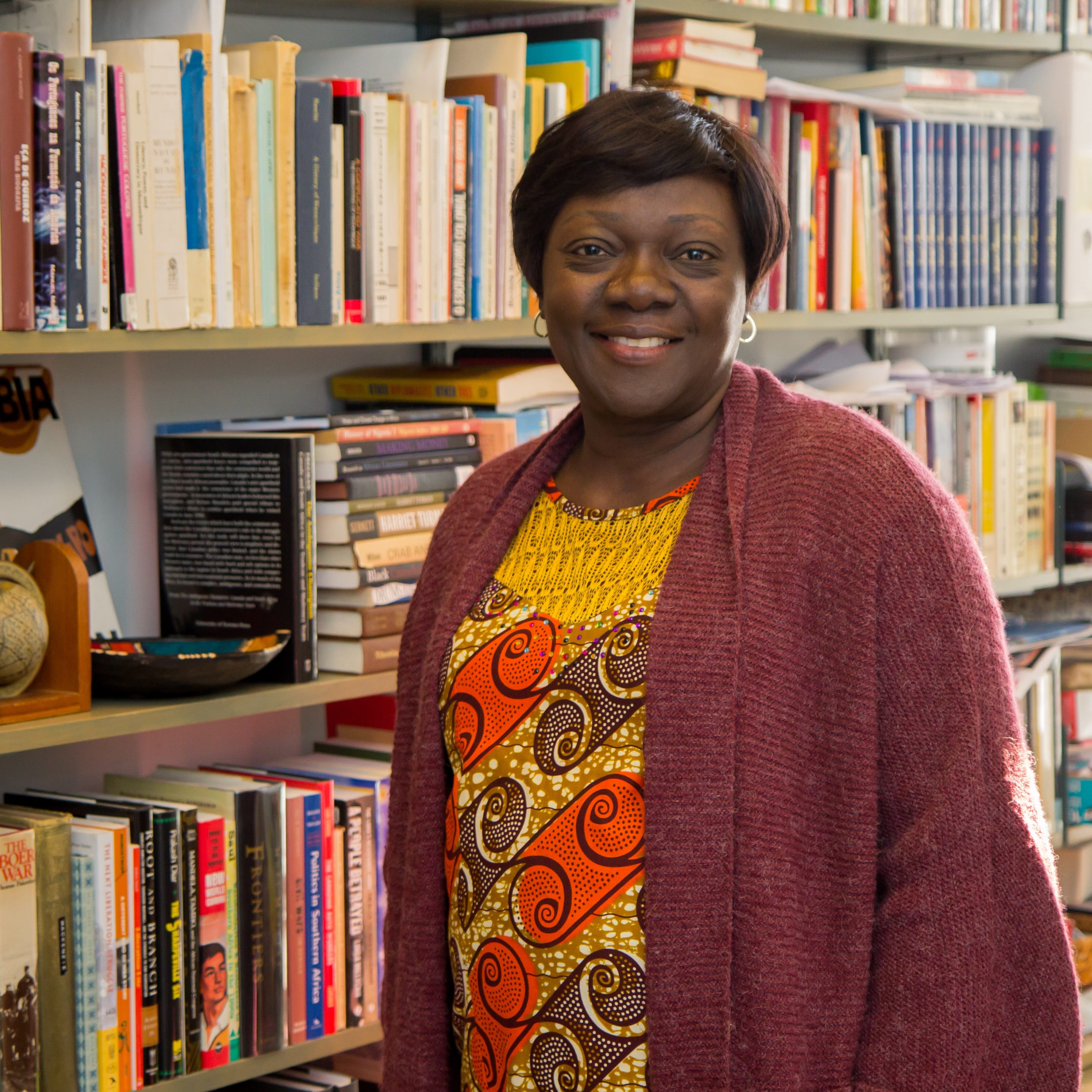
“Roughly 15 years ago I was helping organize a conference with some other academics. We did not know each other personally and we were all located around the world, so were communicating remotely via conference calls. Once we all met in person we made our round table introductions. When it was my turn to speak, I introduced myself. Afterwards one of the co-organizers spoke up in front of all our colleagues and said “oh, you are black? I thought you were from Europe because of your accent.” I was shocked and politely smiled and replied “yes, it is me, I am black.” Despite the polite reply, I was confused why it mattered what the colour of my skin was, or what that had to do with my role in organizing the conference.
It was a small instance, but unfortunately one many black people around the world experience on a regular basis. That is one of many reasons why Black History Month is so important. It is not just acknowledging and remembering the history of those that fought for our liberation but giving us inspiration to continue to change the world like they did. Yes, we need to look in the past, but also what is our present? What is our future? What is our legacy? And how will we inspire the new generation to continue that legacy?
My role at the Harriet Tubman Institute for Research on Africa and its Diasporas at York University is committed to the understanding of the history of slavery and its legacy. It also fosters inter- and multi-disciplinary debate and approaches. In addition to continuing the work the institute has done to fulfil its mission, one of my aspirations is to expand the membership to include francophones belonging to both African and West Indian communities.
The institute is a true testament to York University’s commitment to academic excellence, inclusivity, diversity and social justice. Located in one of the most multi-cultural cities in the world, our resident faculty represent a wide variety of academic disciplines, including history; anthropology; languages and linguistics; business; economics; geography; music; dance; law; philosophy; political science; sender, sexuality and women’s studies; and sociology.”
Gertrude Mianda
Associate Professor of Gender and Women’s Studies/ Professeure agrégée en études des femmes et genre
Director, Harriet Tubman Institute /Directrice, Institut Harriet Tubman.
Glendon-York University
Gertrude Mianda, Faculty
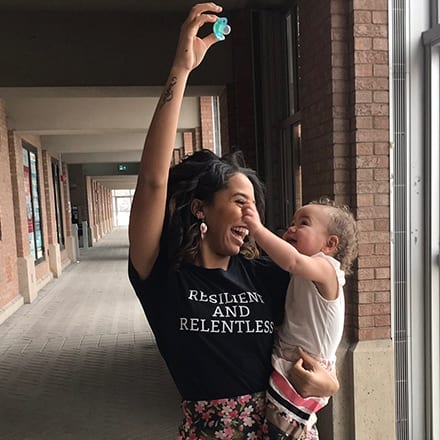
“Mummy and me ribbon skirts: I picked a pattern with Alberta roses – being from Alberta and all – and had such a great time cracking out my sewing machine to design and sew these. Thank you to the Centre for Aboriginal Student Services (CASS) at York; we hold cultural workshops for students at York and I created this in our Ribbon Skirt Workshops!
I work at (CASS) as the Aboriginal Special Initiatives and Projects Coordinator and regularly engage with the services offered there, and in this space I’ve found a community that has changed the trajectory of my life and education. I actually only started going to CASS in my final year at York University, and this had to do with my insecurity of claiming my Indigeneity. Evidently, I don’t “look” Indigenous (whatever that means…); being Black and Indigenous, I was and am alienated by the racism I encounter; my non-representation in media and culture; and the constant need to ‘prove’ my identity. I had always been involved in Indigenous communities, but it was not until this past year when we unearthed documents proving our family’s Metis heritage that I was comfortable institutionally self-identifying as Indigenous, and engaging more with Indigenous spaces and services.
Now that I have allowed myself to reclaim this part of my identity, I have found a deeper sense of purpose and community than I have ever experienced. I am studying my Indigenous language, and gaining traditional knowledge; I am engaging with Indigenous research projects, including one in the LA&PS Dean’s Award for Research Excellence program; and I am advocating more vocally for Indigenous people, through my activism and policy work. What I believe to be most important, however, is that I am creating a home within which my one-year-old daughter feels proud and empowered by her Indigeneity, where she will understand how our predecessors created the space and opportunities we enjoy and where she will with every decision, act with the future seven generations in mind.”
Larissa Crawford, Student
International Development and Communication Studies program
Faculty of Liberal Arts & Professional Studies
Instagram: @larissa_crawford
Twitter: @larissaandzyra
Photo credit: Larissa Crawford, Instagram
Larissa Crawford, Student
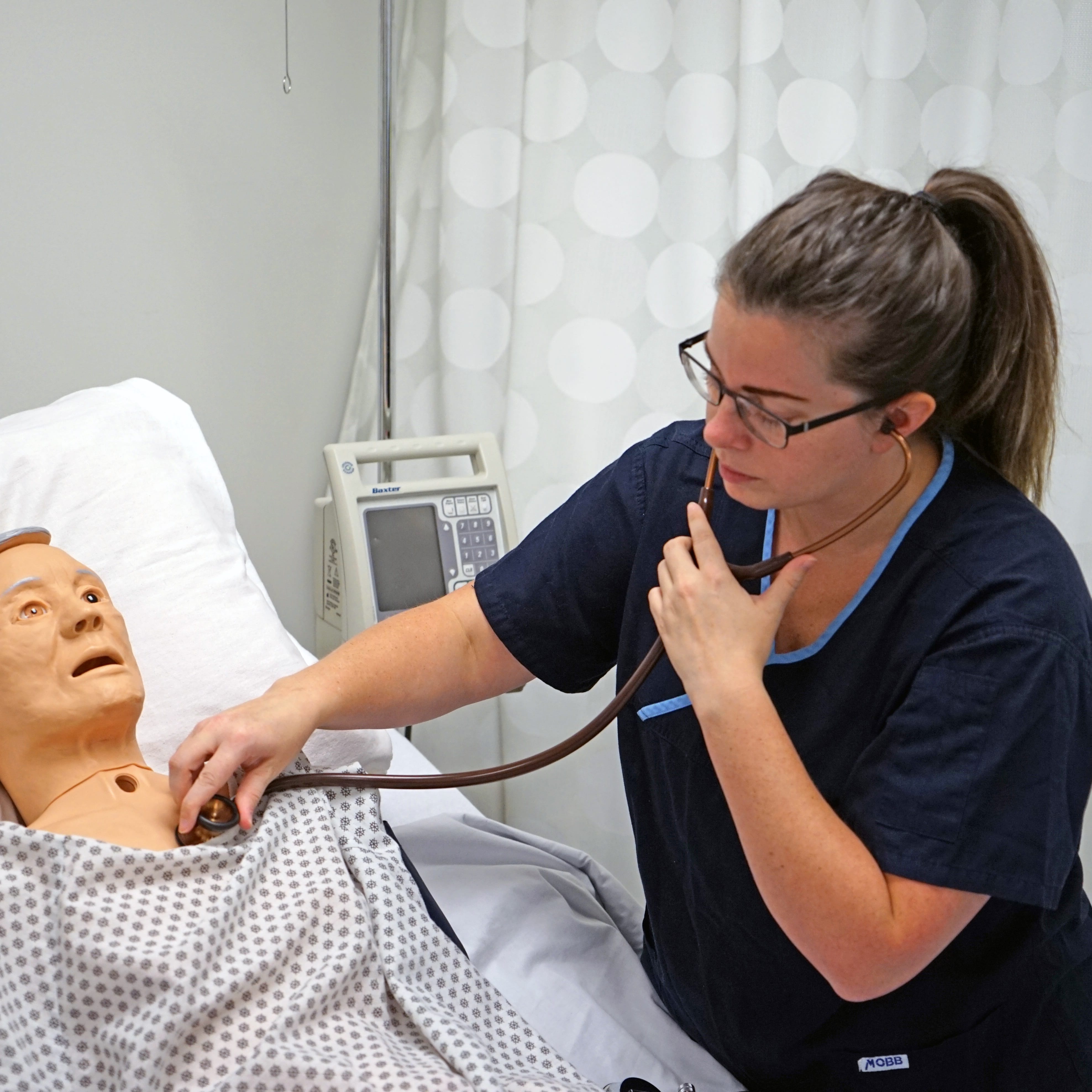
“When I was 13 years old my best friend was diagnosed with a rare type of connective tissue cancer called Ewing’s Sarcoma. We had spent nearly every day together since kindergarten and the news was shocking and hard to process. I learned at an early age how to change bandages, clean PICC lines, and what terms like neutropenic meant. We would travel together with her mother to Sick Kids Hospital and stay in the Ronald McDonald House, and I often accompanied her when she had radiation therapy and treatment procedures. We met nurses often and worked with them daily as part of her care. She fought very hard for nearly two years but succumbed to her condition a little over two weeks before her 15th birthday. Since then I have wanted to help other people and provide care for them.
At York U I am a 4th year collaborative BScN student and a member of the York University Nursing Student Mentorship Program as an executive member. I collaborate with faculty and help facilitate hands-on skills practice sessions in the Nursing Simulation Centre based on the expressed needs of my peers. I also volunteer as a peer tutor in acute care. I believe strongly in collaborating with peer groups to support learning and enjoy practicing my hands-on skills in study groups. Practicing nursing skills helps me gain confidence and improve my abilities with practice in the realistic nursing environment in the NSC. I hope to become an emergency department nurse after writing my NCLEX exam next year, and I have no doubt that diligently practicing skills will help me stand out from the competition.”
Kimberly Bodick
Bachelor of Science in Nursing
Faculty of Health
Kimberly Bodick, Student
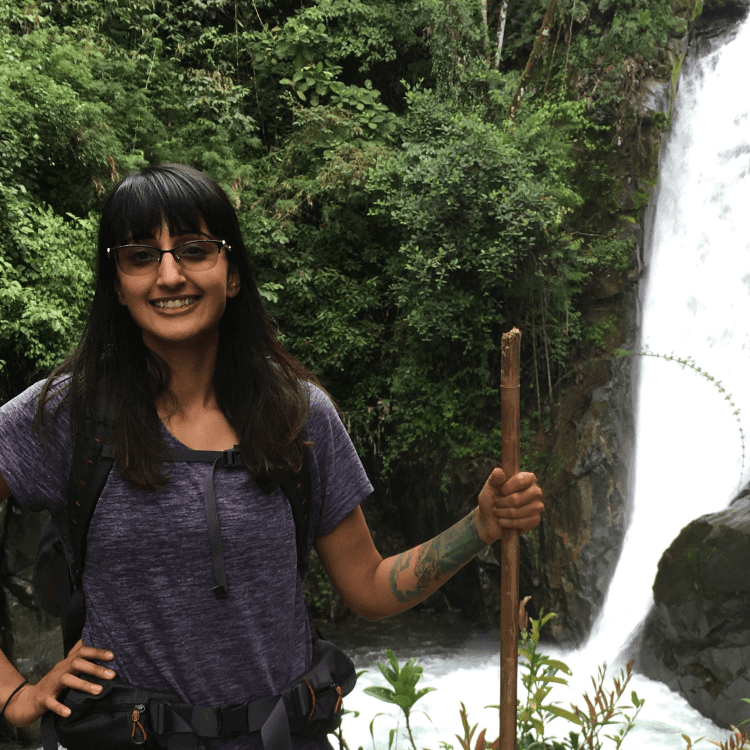
“I was born and raised in Delhi, India and immigrated to Canada 14 years ago. I recently completed my undergrad degree in Environmental Studies: Politics, Justice and the Arts with a certificate in Sustainable Energy. What attracted me to the program was my passion for biodiversity and the opportunity to do Experiential Education in the Costa Rican rainforest at York University’s Eco-Campus. I went to Costa Rica from June 20, 2018 to July 3, 2018.
The first day at the Eco Campus, we spent the day in the outdoors, overlooking the dense rainforest, which we later hiked down to the river. Along the way we are greeted by many different species of animals, such as bees (we even set up an orchid bee scent trap that attracted many bees for a future study), hummingbirds, bats, turkey vultures, falcons, owls, sloths, frogs, snakes, herons, dogs to name a few.
Some experiences that stood out include exploring beautiful beaches and intense hikes in protected parks such as Hacienda Baru, where we saw many kinds of birds, my favorite tree species and learned about the policies that affect the management of areas that overlap between public and private land.
Two other parks that stood out were Cloudbidge, which was a regenerated forest from what used to be only cattle pastures and Las Quebradas because of how they finance watershed protection and regeneration (with tree donations), while also supporting women entrepreneurs.
I am also proud to have finally seen a shade grown coffee farm because I volunteered with the Las Nubes student association and sold that type of coffee, as it is more sustainable. To see locals growing it was fulfilling since we often hear about things being “more sustainable” but cannot decipher what it really means, so it’s reassuring that these practices are verbatim. As well, the money that we raised as a student group from the coffee sales went to build a bridge near the campus.
The whole experience exceeded my expectations, being someone that’s grown up in big cities, I have always been drawn to other possibilities the world has to offer. I am beyond thankful to have experienced the stark different kinds of lifestyles. They all are equally as exciting and vital.”
Sanya Tandon
Bachelor in Environmental Studies
Faculty of Environmental Studies
Sanya Tandon, Alumni
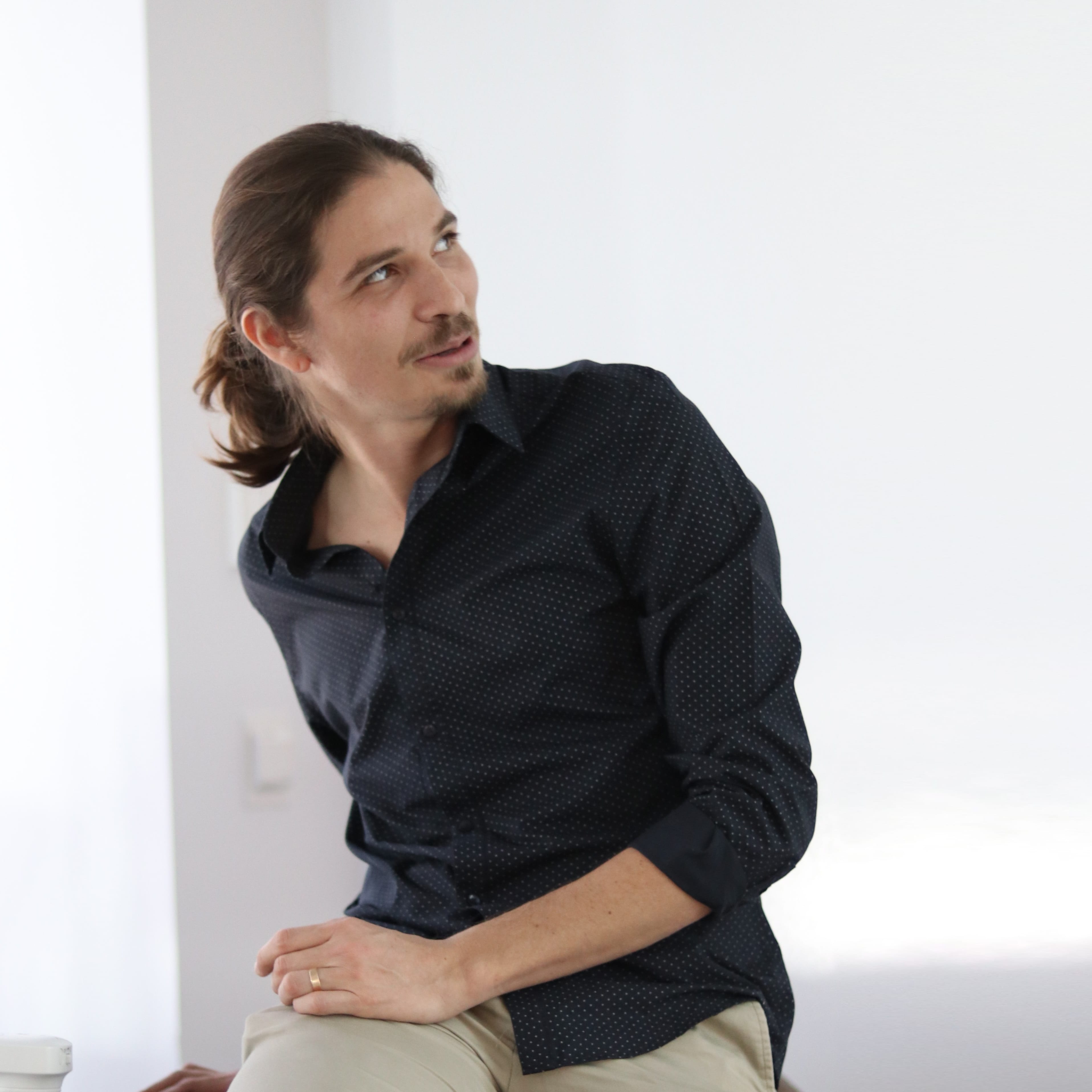
“I finally understood the role I wanted to play in the complex puzzle of conservation and environmental management. I wanted to become a champion in designing and implementing solutions for environmental problems. In order to achieve real change, I realized we must build new models that make others obsolete. My problem was that the ideal place to do this was not my home Costa Rica.
York University was an ideal University for me. Little did I imagine that the biggest challenge would be to find a way financially that my family would not have to be separated.
My wife Carolina and I started a campaign that would lead us to achieve the unthinkable, in 5 months we would get all the financing for two years. We knew it was a risky option, but we were willing to give it our best. We applied for grants, applied for student loans, started a website, opened a Go Fund Me page and sought meetings with potential donors. After hundreds of meetings, knocking on many doors, the support began to arrive. Our dream would now become a reality.
Whilst studying at York, I worked hard with the Faculty of Environmental Studies to create the Ruby Throated Fund. The university officially created the scholarship and adopted it as funding priority. Once the Fund is completed, this program will give Costa Ricans the opportunity to take a Master’s in Environmental Studies at York.
On top of all that, while studying in Costa Rica I re-discovered a new population of frog that was believed to be extinct for 30 years.
Thinking back, if someone were to ask me if I would do it again, I would say yes! Not because it was easy, but because through hard work we are now giving more opportunities for future environmental leaders.”
Andres Jimenez
Master of Environmental Studies
Faculty of Environmental Studies
Class of 2018
Andres Jimenez
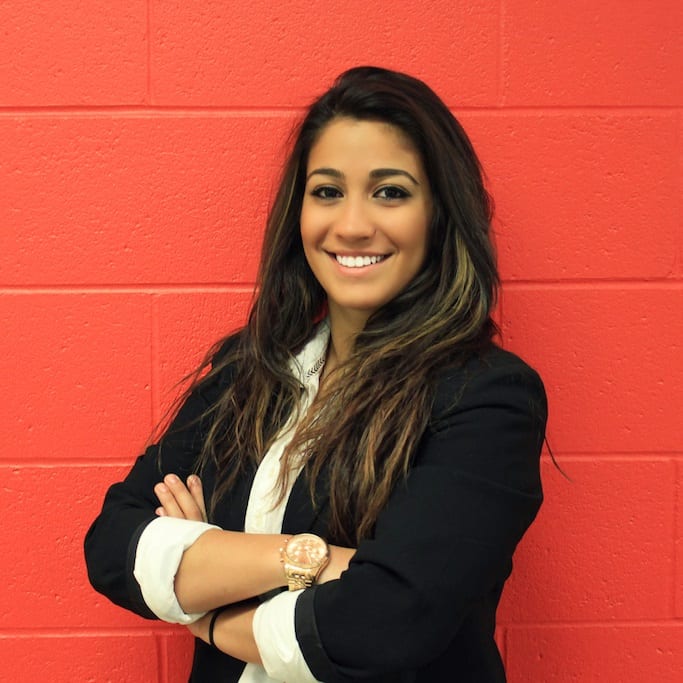
“My family and I were refugees from Iran and I grew up in a single-mother household. We moved to Canada to pursue the education my mother never could and have the freedom she had never tasted. When I was a teenager, my mom was injured at work and became disabled. I had to watch her lose not only her livelihood but her ability to function without pain. This became my motivation to strive for excellence, to repay her for all her sacrifices.
I served as President of the York Model United Nations and won Outstanding Delegate awards at Model UN conferences. I represented York while working internationally in Barbados, in policy development, and was the recipient of the Outstanding Student Leadership Award.
During difficult times throughout my degrees, I would think of all my mom went through to bring me here. This made every obstacle possible to overcome. She gave me the motivation to reach for the stars, and York is where I was able to do it.”
Hasti Almasi
Master of Public and International Affairs
Glendon
Class of 2018
Hasti Almasi
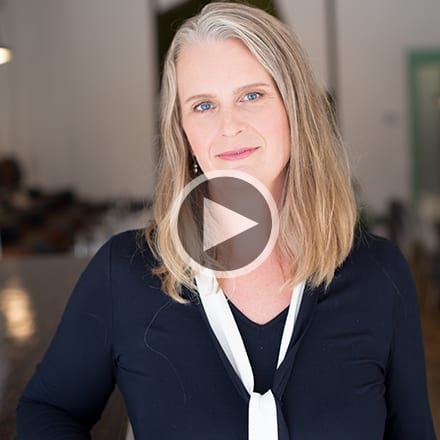
“Animal minds research fits into the department of philosophy because in philosophy we’re interested in the nature of mind and what is the mind. So, how do I know you have a mind? How do I know anyone has a mind? I know I have a mind, I experience it, but I have to kind of guess that you have a mind, or figure it out, or just treat you like you have a mind. And so, we can ask the same questions about cats and dogs and dolphins, and if we’re interacting with our dog and our cat, we just treat them like they have a mind. So, we see their minds the way we see other human minds but how do we justify our belief in their minds? That’s when the philosophy part comes in.
We had a cat who adopted us when I was very small, and we were living in California and the cat just came to our backyard and we started feeding her food, and some food she liked, like tuna; some food she didn’t like, like bananas, and none of us knew anything about cats. I mean, I was four, so I didn’t know anything about keeping cats, and my mom didn’t know anything either.
So, I grew up with this cat who had adopted us and learned about cats and I watched Flipper on T.V. because it was the 1970s and Flipper was an awesome dolphin who, you know, saved the day all the time. And, I thought these animals are so smart and they have these mysterious minds. They obviously have minds, I can see them, but maybe they know things that we don’t know; cats are out at night, dolphins are swimming underwater and echolocating things, they can see through solid objects. They live in these large social groups, so what can we learn from them?
I went to Antioch College and Antioch has no grades; you call your professor by the first name and you spend half the year doing co-ops; and so one of the co-ops that I did was at a dolphin lab in Hawaii. It was Lou Herman’s dolphin lab –the Kewalo Basin Marine Mammal Laboratory and they worked with…they had four bottlenose dolphins at the time: Hiapo, Akeakamai, Phoenix and Elele. These four dolphins had been trained to communicate with humans using a gestural communication system, where the different gestures represent objects, noun, verbs, adjectives and logical connectives. And so I ended up spending almost a year there and graduated from Antioch and decided I wanted to go on and study philosophy. I could have gone in studying psychology after that because everyone around me were all psychology grad students, but I had a mentor at Antioch who invited me to join him as a graduate student at Western Michigan University.
And so, I left Hawaii, sadly, went to Kalamazoo and started writing papers. My very first paper got published; was in a journal called Etica et Animali, Tamale out of Italy, on whether great apes have minds and it was called, “The First Step in the Case for Great Ape Equality”. So, I had this ethical issue associated with it as well, and that was where it started.
For my PhD I went to the University of Minnesota, I was training in the philosophy of science and all my fellow students called me ‘Dolphin Girl’ because I was doing this weird thing.
Philosophers were not engaged in empirical research very much at all, and certainly not research with non-human animals. Maybe humans, but not dolphins and chimpanzee and orangutans.
Studying dolphins was my initial experience, and then I came to York, and at York I went to a talk that York Psychology Professor Anne Russon gave; this was back in 2003 now, and she gave a talk about orangutan cognition because she works with the orangutan in Borneo. And I went up to her after the talk and said, “Oh, you said these interesting things about what orangutan can do, dolphins can do that too”. And she said, “No, they can’t. Not like orangutans. You should come to Borneo and see what the orangutans can do,” And so I said, “OK!”. And that was the first time I went to Borneo. So, I’ve been to there three times and have written papers with Anne and we’ve been collaborating for fifteen years and we found some really amazing things that these orangutans did.
One of Anne’s research assistants had helped a young orangutan named Kikan, who had a stone stuck in her foot and so she pried the stone out with a pencil, and she sealed the wound with some latex from a tree, a leaf of a tree, and Kikan then walked away. Kikan never liked Agnes, the human doctor, but then a couple weeks later, Agnes said that she came over and grabbed her arm to get her attention. So, Agnes looked at her and Kikan held her foot up, showed Agnes that the foot was healed; also took a leaf and poked it on the spot where she’d had the wound. So, Agnes interpreted this as Kikan acting out what had happened to her, showing her that the wound had healed, and thanking her for the work she did.
One thing I also want to say is that I started with really “fancy” animals that everybody sees as super cool: dolphins, orangutan and chimpanzees, but I think that what I really want to focus on now are the kinds of animals people like to kill, like bees. The little tiny things that we don’t think of as fancy and smart and cute; because we’re finding out that they’re really smart, that bees can engage in social learning, they observe what other bees are doing and then mimic what they’re doing, and they can use tools.
So, we need to expand the kinds of different species we’re looking at; I think we need to look at plants. If you look at sped up video of bean plants, they move around a lot; they compete with one another for climbing structures, they’ll move away once they’ve lost the competition. So, there’s a lot of cool stuff that I think we need to find out.
I want to learn about the diversity of kinds of minds on the planet. But, I also want us to think differently about our place among all these other minds on the planet; we’re just one among many. We’re not at the top of any kind of evolutionary hierarchy, we’re just one among the many that exist. And so, we need to rethink our ethical standing in our treatment of these other animals that we share the planet with. And that’s hard, it’s really hard. It’s hard for me, it’s hard for most people I know. But these are conversations we need to start having, so we can see what kind of changes we can make as a society in order to respect the variety of mind and life.”
Kristin Andrews, PhD
York Research Chair in Animal Minds
Associate Professor
Department of Philosophy
Faculty of Liberal Arts & Professional Studies
Twitter: @KristieAndrews3
yorku.ca/andrewsk
Video credit: 4Boake Creative
Kristin Andrews, Professor
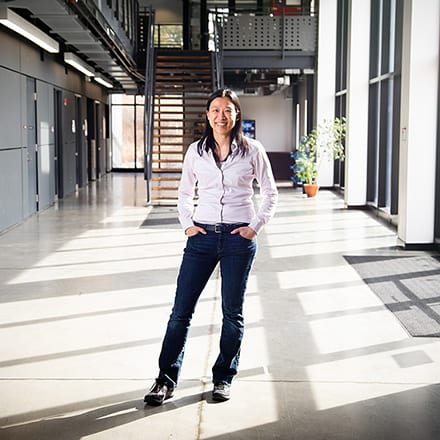
“You do the research then you find out it’s not actually as simple as you thought and I think that that’s the greatest thing about research. All of us think a certain way and are we too proud to see that maybe the truth isn’t what we think? When you look at the roads less travelled, sometimes there are very interesting findings and I think that part of the reason why we have so much obesity stigma and bias and prejudice is because everyone just believes this; it’s simple – you eat too much, you don’t exercise enough and so therefore, you’re fat.
But the more I do research, I see that the world is changing. And I don’t think that it’s as simple as you ate too much and you just didn’t have enough willpower to exercise. I think that there’s a lot more in play in terms of the medications that we take, the environmental pollutants, that we are all exposed to everyday, and our genetic susceptibility in the genes that were passed on to us preferentially because of our parents and their obesity status when they had us. And so I think that having this concept, that everyone can attain, you know, what we call a normal weight and that’s the healthiest weight for you, might be an oversimplification.
I get messages from people who’ve been struggling with weight all their life, and hearing the “thank you” for standing up for the people with no voice. I think that’s really important.
It’s sad because, I mean, I’m a lean person myself. People expect, because my research says that obesity might not be as bad as you think, that I have obesity myself, and they are often shocked to see I’m a lean individual. Because I am lean, I can say this, and someone who is larger cannot.
I think that’s really unfortunate and obesity is not as simple as what people think.”
Jennifer L. Kuk, PhD
Associate Professor, School of Kinesiology and Health Science
Faculty of Health
Photo credit: davidgoldmanphoto.com
Current Research
Characterizing obesity and related health risks (cardiovascular disease and type 2 diabetes) and examining the influence of diet, physical activity using both clinical interventions and epidemiological approaches.
Jennifer Kuk, Professor
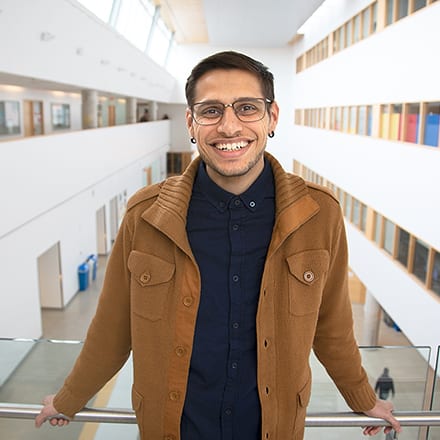
“I was born in India and grew up in Italy. I speak, English, Italian, Hindi, Punjabi, Urdu and Spanish (basics). I moved to Italy at the age of 7 and I lived there for 10 years. I came to Canada in 2015 to pursue my university degree. Since I was a tech enthusiast since childhood, and I was always curious about learning new things (science and technology in particular), taking my interest into consideration I started my degree in Computer Science at the Lassonde School of Engineering.
I still remember when I came to Canada, I had lots of unclear dreams and blurred vision of my life’s purpose. As a new international student in Toronto, it was very challenging for me to settle in the new environment, since English is not my first language I found very hard to develop relationships with people and make friends. During my 1st semester there was a point when I went through depression and I decided to quit my university and go back to Italy. I am very grateful to the York International department, Diana Ning in particular, who helped me as a new international student from my 1st year by providing me the opportunity to work for York International and be a leader for new international students.
When I started my degree I actually didn’t have much interest in Computer Science field, at one point I decided to change my major to Film/Production since I had more passion for it. However in summer 2016 my mentor Shivam gave me a chance to volunteer with his company, Hero Engineering. I worked on a cloud based data warehouse and web application which allow users to visualize their energy consumption data historically. I had very limited experience when I started working on this project. I had the support of my mentor (Shivam) who guided me through the project. Working on this project was perhaps the most enlightening experience for me, as it sparked my interest into coding and in technology overall. I realized, coding is more about creativity, and that developing an interest is a journey, it takes time and efforts, moreover willingness to learn. It was an eye opening experience.
I genuinely believe if these people did not come into my life I would have not found my purpose and my passion. They did not only inspire me to work for what I really like, but also
helped me to learn and grow as an individual.
I had the opportunity to visit Silicon Valley last semester through my Faculty (Lassonde School of Engineering), where I experienced the tech capital’s unique entrepreneurial culture. Being in Silicon Valley was one of the greatest experience I’ve had so far, especially visiting high tech companies like Google, Uber, Twitter and many other startup companies was an eye opening experience. I learned a lot about the tech world specially about Artificial Intelligence how it is changing our lives and will in the future.
This summer I’ll be going to Technion Institute of Technology – Israel for 3-week “boot camp” focused on entrepreneurship. This program is a credit course based on classes and workshops at the Technion campus in Haifa. In addition to the content delivered in Haifa, students will also be making site visits to: incubators, venture capital organizations, startups, research labs and a two-day visit to Tel Aviv University. I am really looking forward for this new adventure and learn more about the entrepreneurial world.
Recently I developed great interest in AI/ML. My dream is graduate and then to specialize in the stream of Artificial Intelligence and work in this field. I also have great interest in entrepreneurship and I am aspiring to develop a social enterprise in the late future in the field of AI.”
Prince Barpaga, student
BA. Hons. Computer Science at Lassonde School of Engineering
Watch his recent TEDx talk
Twitter: @PrinceBarpaga
Instagram: @PrinceBarpaga
Photo credit: davidgoldmanphoto.com
Prince Barpaga, Student
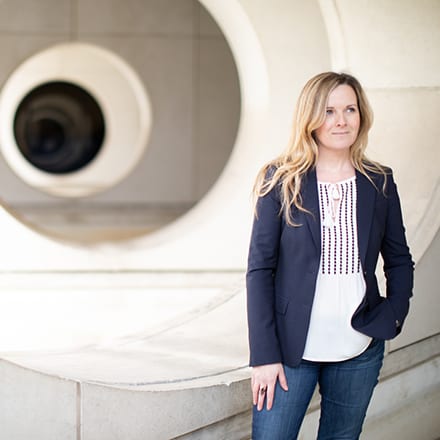
“Looking at my life, I never thought I would be a refugee. In the early ‘90s there was a war in Bosnia. In 1992, I was thirteen and we had to leave the country overnight. The situation was getting really bad and I left with my sister and my niece who was eight months old at the time. We fled to neighbouring Croatia who was taking some refugees of the Bosnian war. We spent about thirteen months there alone while my parents and other four sisters stayed behind in Bosnia. So, we were separated, and it was tough. We had to pick up and leave Bosnia overnight and we went to a foreign country…you’re lost. Especially for somebody who was only thirteen.
After just over a year, because of the political situation between Bosnia and Croatia, we had to leave Croatia. So, that was an issue on top of another issue, because European countries were flooded with Bosnian refugees they were not accepting more. So, the only option we had was to go to Pakistan. There were 360 of us in Croatia; a city called Makarska for those 13 months. But when we had to leave and go to Pakistan, we had no passports so the president of Pakistan sent two airplanes, chartered airplanes for us. We were picked up June of 1993 and I spent 12 ½ months in Rawalpindi (closed to the capital Islamabad) Pakistan.
I was fourteen and a half and by then we were reunited with the rest of my family; my parents were with me, my other three sisters, except one who actually went to Germany and she was a refugee in Germany. She was married, so she left with her husband.
I didn’t even realize what was happening being at that age. I still like to read news from Pakistan and given the world situation that we all are in these days, I always kind of relate myself to them, because they saved our lives.
When we were preparing to leave Pakistan we had the option to go to the United States, Australia or Canada. My parents decided to come to Canada, because they’d done some research and we already had a relative that would connect us to another relative here. There were about twenty-six of us Bosnian refugees that came to Canada at the same time; about five different families that were accepted when we applied.
Canada is my country now, I called it my country because I’ve spent more time here than I had spent in Bosnia, even though I call myself a Bosnian. But I still think this is my country and almost like I feel like I was born here.
Having been a refugee, now I feel like I’m tough. I thought I would live rest of my life in Bosnia, you know? But I didn’t. I don’t know what life is going to bring to my son, but I just want him to be strong, I want him to take anything that comes his way and not dwell on it; take it and move on. I just look at life and I take it and I’m like OK, this is what it is. You face it and you move on. I think it’s shaped me to be a better person, a stronger person going forward. I try to be positive and my colleagues always say, “Elvisa, you always see the positives,” and I’m like, isn’t that the whole point?”
Elvisa Zjakic, Staff
Undergraduate Program Assistant,
Department of Social Science
Faculty of Liberal Arts & Professional Studies
Photo credit: davidgoldmanphoto.com
Elvisa Zjakic, Staff
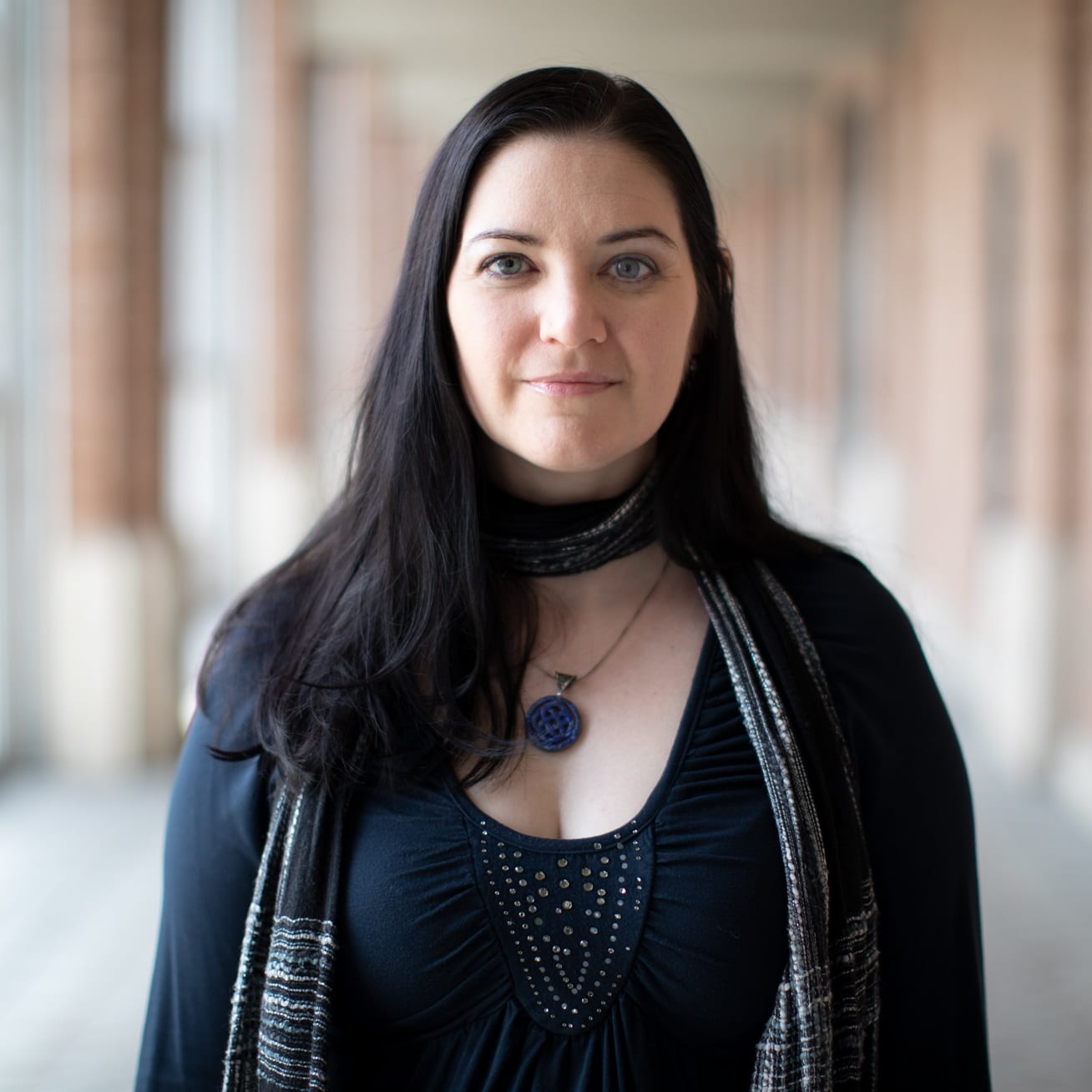
“My family and I lived in a motel when I was 13 years old. I have lived experience with hidden homelessness. I understand poverty. I understand the ways in which poor people are stigmatized, marginalized, and how they are systemically oppressed in ways that financially privileged people aren’t.
My thesis is critiquing the way that news media portrays people who are poor. I examine how the language use and belief systems perpetuate stigma to those who have little to no income. By marrying both academic and lived experience knowledge, I have been able to bring a unique perspective that has motivated me to keep going, despite being distressing at times.
I first attended the homeless memorial in November of 2015. I became quite angry with the knowledge that so many people were dying while homeless. These lives end prematurely and often through brutal ways. No one in our affluent country should ever die violently, alone, or hungry. My hope with creating the online memorial is to provide a digital space for those in the community who are grieving. The space is also there to bring awareness to the crisis of homelessness and to provide ways in which people can help.
What I find the most frustrating about the work is the fact that I must do it in the first place. I wish we didn’t have a homeless memorial. I wish no one had to die while homeless. I wish that front line workers, nurses, doctors, volunteers, didn’t have to fight day in and day out for basic human rights. Homelessness is something we created, we know how to fix it, but we choose to place our priorities elsewhere. Prevention strategies, affordable housing, and social support systems, that’s it. I’ll keep working towards that goal for as long as I possibly can.”
Rayna Slobodian, student
Masters of Education candidate
Faculty of Education
Twitter @raynaelizabeth
Toronto Homeless Memorial Network
Photo credit: davidgoldmanphoto.com
Rayna Slobodian, Student
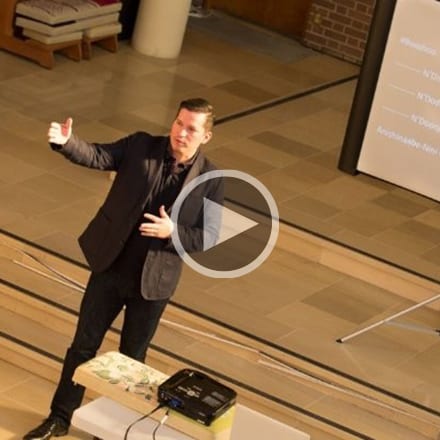
“I’m Anishinaabe and back then it wasn’t within the institutions and academies and school boards that I was getting my education. It was actually directly from the community, from the elders, from the spiritual leaders, from the activists that’s where I was getting my knowledge from. I never went to high school. I was mostly working within the community through the different jobs and contracts they had. How I gained my experience and my knowledge was through reading books that people were suggesting to me; that were already activists. People that were affiliated with the American Indian Movement. People that were affiliated with so many activist groups within Toronto at the time. Those were the people that were giving me books to read and recommending books. And so, that’s kind of where I based my knowledge.
After my first speaking gig, I ended up getting nominated to a Youth Council of Friendships Centre then I became a vice president for National Aboriginal Youths within the National Association of Friendship Centres and I did that right until I was 25 and that’s because I got used to speaking in front of crowds of over 500 people. Also, I had this knowledge base around culture.
How I really utilized my masters was just learning from Dr. Susan Dion and Dr. Celia Haig-Brown and their perspectives on anti-racism and anti-oppression theory practice. Even just the colonization timeline and learning the difference between colonialism, colonization and imperialism. All these things I kind of knew to certain degree, but it was more validated and solidified with my education here [at York]. So, it’s been a long journey and I’ve worked in friendships centres and drop in centres counsellor shelter for all for quite some time. I counsel children in care, Indigenous children in care. I worked for the Toronto STAR for a short time in one of the sections called “Young Street”.
As of recently I’ve been doing more keynotes for conferences but in the past 20 years it’s been mostly about Indigenous ways of knowing. We have to think about Indigenous ways of knowing more in a fuller explanation in terms of indigenous perspective. People more commonly refer to it as Indigenous culture but who are people with culture? And we think about culture it almost gets boxed in with more artistic display or exhibition, song and dance. And sometimes we say “Indigenous culture” sometimes people’s minds go to drums and feathers and beads. So, for us in terms of Indigenous ways of knowing it talks about our pedagogy, our philosophies, our methodology. It talks about our sciences and it talks about even the drums and what they do mean and what is the method behind the drum and why we use the drum? How does the drum take you to the frontal lobes to naturally calm you down? All these kinds of things are implied within our ways of knowing within the language, within this thread that’s coming through everything we talk about.
But within the education systems like this and institutions and academies, it’s very compartmentalized. Music is separate from science and science is separate from education, but for us in terms of our ways of knowing it’s fluid throughout. And so, I’ve been talking about a lot of those things from our perspective in terms of stories, in terms of cultural awareness and cultural perception.
Like, did you know that a pow-wow isn’t really traditionally or culturally or inherently ours? It comes from Buffalo Bill’s Wild West show and it comes from our people being showcased, and the only time they’re able to occupy spaces of privilege is when they’re performing. And so, as a singer and a drummer that started out in that way, I was always tokenized. I did that for a long time and I was noticing that when I was doing those things there was no education following up. And so, after every time we do a performance we get up there and we’d sing, and we’d dance people would ask, “What does that mean? What is that about?”
So, then before I did anything, I would offer two minutes of intro and talk about what we doing, then I start describing the dances and describing the drum. And then from that point, I started introducing history. I start talking about residential schools and I started my own company and then after a while of starting my own company of doing those kinds of things I started wondering if I was perpetuating the stereotypes and misconceptions? Am I one of those people’s that’s contributing to this ongoing misconception of our people that are just being attached to these insiders? And then I stopped.
People get uncomfortable [when I talk about white privilege] and there’s a certain thing that they have to process themselves. Even when I was looking at my own maleness and my own male privilege. I didn’t realize so many things and sometimes people don’t even realize their own privilege. I’ll have those kinds of questions [after I speak]. Mostly argumentative or disputing what I’ve presented, which is fine, but sometimes it’s based on anger because they don’t want to lose or they don’t understand their position within society.
So, when I position that privilege to them or that dominance to them as a racialized person or as an Indigenous or Anishinaabe they get really offended but I’m not supposed to get offended by the thinking that I should be wearing beads and feathers? That I should have darker skin. That I should have long hair and braids. I’m not supposed to get offended by their misconceptions?
[In my lifetime] I would like to see indigenous nations in this country as well as United States have actual governing power within the institutions of government. I would like to see that because we have nationally recognized leaders but they’re in an ex-official capacity. They have no actual voting power within institutions of government unless they’re sitting in those positions So, it’s good to see some of those indigenous people now occupying that space.
We need places like Nunavut. That’s amazing to me in terms of their governance structure. We need to move in that direction as well with languages. I mean there are over 50 Indigenous dialects within Canada. Why are they all not acknowledged? I mean, when I walk through institutions that are promoting equity and diversity and they have languages and readings from all over the world but, yet they don’t have any Indigenous languages of the territory or of across this land. That’s not inclusivity. That’s not being inclusive of the Indigenous voice. And why do I have to ask permission from the system of dominance of whether or not I can pray? Or smudge within a building like this? Why do I have to ask them for permission to engage my own culture? Our own ways of knowing. That tells me that we have a long way to go still.
I would like to see the elevation of the collective consciousness of Canadians because I feel that it’s not fair to that there’s information missing from their education. Huge chunks of history are missing from their knowledge about who we are. So, in terms of the Indigenous here in Canada they might have 5-10% of the story. And how are you going to base a decision and a feeling on 10% of the story? Even recently I was at Algoma University. The reason why I bring that up is because my father went to that residential school and so there was a superintendent of education listening to the presentation and then later after the presentation he said, “Eddy, I use to walk by that school every day and see those children playing in that yard every day but I had no idea what was going on there. I didn’t have any clue of the torture or suffering that was happening to those children. Because I thought they were just playing in the yard. And so, that’s the thing; abuse is hidden, and people aren’t talking about it and they don’t feel safe to talk about it because the environments that we’ve created aren’t safe for Indigenous people. So, how can we create a safe space for them? How can we create safer spaces for this conversation that needs to happen?
People have to understand the privilege and use it to create space for this conversation. This needs to happen, it is happening, it has been happening, but it needs to happen even more on a global scale. Because there’s so many people come into this country and swearing and become citizens but they’re not being told their history. So, they’re coming to this country seeking a better life and when they hear that the Indigenous people here haven’t been treated well and are still not being treated well they get disrupted. How is that possible? Because Canada has been so great to them. How is it possible that they’re still treating their own Indigenous people basically like garbage? They’re still oppressing them. It gives you an understanding of the perceptions of the world when the Pope won’t even apologise for [the Catholic church’s] involvement in residential schools.
My hope is that change will happen with the awareness of the people and stoking that fire within them to want to create change and to want to know the truth. More talk about truth and reconciliation. Truth is the hard part. It’s disruptive and it’s a process that we need to endure in order to move towards reconciliation and understanding what reconciliation actually means to indigenous people. What does that word mean because it’s nothing compared to what it means in the dictionary? It’s a process, it’s a process of healing. It’s a journey of knowledge, it’s a journey of understanding, reflection, actualization. So many elements to reconciliation.”
Eddy Robinson
Masters of Education & graduate diploma in Urban Environments (‘15)
Website: eddyrobinsonmsr.com
Twitter: @EddyRobinsonMSR
LinkedIn: Eddy Robinson
Video credit: 4Boake Creative
Eddy Robinson, Alumni
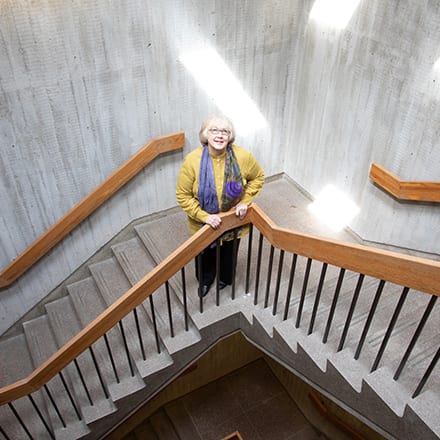
“I grew up in the small town of Bemidji, in northern Minnesota. When I was young I enjoyed and was very engaged in physical activity. At my high school, there were no sports for girls because I attended school before the Supreme Court Title IX ruling which legislated equality for girls’ and women’s sports and boys’ and men’s sports in publicly funded institutions in the United States. But there was a golf course in my hometown so I started playing golf when I was young. I competed in the club system and became successful as a golfer. I knew that I wanted to be a teacher and my interest in physical activity led me to complete a BSc and a BEd with a major in physical education and health at the University of Minnesota. I then completed a MA at the University of Michigan before teaching physical education and health for two years in a high school outside of Chicago.”
In 1970, I was hired by York University as a full-time faculty member in what was then the Department of Physical Education and Athletics and what is now the School of Kinesiology and Health Science. I feel like I’ve had many different careers in my 43 years as a faculty member. Now I am a retired faculty member. In reflecting upon my career I realize how fortunate I was to be a part York during its dynamic evolution. It was amazing to be part of creating what is now the Faculty of Health and the School of Kinesiology and Health Science as well as the programs in Athletics and Recreation. There were so many opportunities to be engaged. I mean, the institution needed everything from governance to new program and curriculum development to advising students and mentoring new colleagues and much more. It was an amazing experience to be a part of creating a new university.
During my early years at York I was developing intramural sports for women, sports clubs and instructional programs. I was also coaching the varsity women’s swim team, and I was teaching a number of practicum courses, including golf, tennis, lifesaving/ lifeguarding, swimming, and emergency care. In addition, I was team teaching health academic courses. I was involved in the college system. It was challenging and fun.
After being at York for many years, including serving a year as Acting Chair in my department in the mid-1990s, I recognized that my commitment to and connection with students in the teaching/ learning process gave me energy and my career meaning and direction. I was fortunate to be able to serve as the Undergraduate Program Director for ten years with Merv Mosher as my Associate Director.
Our priority initiative was to conduct a major curriculum review to internationalize the curriculum; to expand the curriculum beyond the colonial, Eurocentric tradition. We built programs and added courses that represented the demographic make-up of the student population and the city. The curriculum became intentionally more global and inclusive. We also were able to bring in new core courses in emerging areas critical to undergraduate education such as human nutrition, socio-cultural perspectives, and the psychology of physical activity and health. These are two things that were accomplished with the curriculum during my time at York.
It was also important to find ways to recognize student excellence and support students financially. Very early on, working with Steve Dranitsaris, the Director of Alumni Affairs, we developed a Kinesiology and Health Science Awards and Scholarships program which recognizes undergraduate and graduate student academic excellent and leadership- needless to say, this program has grown exponentially over the last three decades. We also created the York University Sport Hall of Fame to recognize outstanding athletes, coaches and builders.
In 2002, I finished another graduate degree in community counselling and created a new academic course titled: “Counselling Skills for Kinesiology and Health Science”. This is a very experiential course and a joy to teach. My community connection with counselling has been as a volunteer bereavement counsellor and a bereavement group co-facilitator at a community hospice for nearly twenty years. This has been a very meaningful experience.
In my retirement, my commitment to inclusivity and diversity remains strong. I’m a product of the 1960s in the [United] States and the issues around civil rights, gender equality, and the peace movement fostered my sense of activism. I came to Toronto and was very engaged in my work at York, but I also became very involved in Amnesty International which led me into refugee sponsorship work. In the early 1990s, I became chair of a refugee sponsorship committee in central Toronto and I continue to be involved in supporting newcomers to Canada in my retirement.
When I heard about the shooting at the Mosque in Quebec City in 2017, I remember grappling with such questions as: “How do I make a difference? How can I do something?” In the short term, I knew that I wanted to hold a vigil and I was able to garner support through my church and from the Arab Community Centre of Toronto. I did not anticipate the “Prayers for Peace“ vigil to be so powerful and unifying an experience for members in my community — we were brought together because of an act of violence but we found peace and hope in our act of gathering.
This sparked for me, in collaboration with Barbara Sheffield and others from Islington United Church, a commitment to explore and create new opportunities for interfaith activities in partnership with the Arab community centre. Since the initial vigil, we have organized numerous events including hosting an Iftar meal during Ramadan. We staged the dinner in our church with the New Canadian Kitchen providing Arabic food! For our next event, we organized a four-day interfaith residential youth camp for Christian and Muslim youth. We followed that with an interfaith service last August, where 55 prayer shawls, knit by community members, were blessed by an Imam and a Christian minister and given to the families of those involved in the Quebec City mosque shooting. Our next major initiative earlier this year was a lecture series on understanding the common Abrahamic roots of Judaism, Christianity and Islam with over 150 people from across the community attending these lectures. This spring we partnered with the Islington Village Business Improvement Association to create and implement a “Ribbons of Peace” campaign. This project involved community members inscribing and tying white ribbons of hope, inclusion and peace along Dundas Street West between Islington and Kipling Avenues.”
Carol Wilson, Professor
Retired Faculty Member & Senior Lecturer
43 years at York University School of Kinesiology and Health Science
Photo credit: davidgoldmanphoto.com
Carol Wilson, Professor
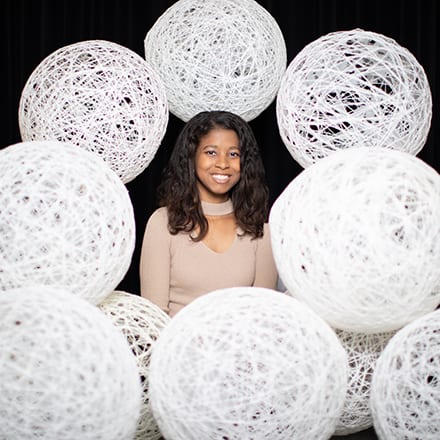
“When I was younger I used to get sick a lot and as a result I would also stay home from school a lot. While I was at home I would spend hours on the computer seeing what I could create. One day when I was about 7 years old I was watching my dad while he was doing some work on his laptop. He was using Microsoft Word to create a document and I saw him using the clipart function to add a picture to the document. That really interested me, being able to type any word and then have multiple pictures related to that word appear. When my dad was finished with his work I asked him if I could use his computer and he let me. I ended up using Microsoft Word to put pictures and shapes together to make many different colourful posters.
Long story short, by the time I got to high school I knew almost everything about all of the Microsoft programs. In my first year of high school I took an information technology course and received a 96% because I had already taught myself everything that was taught in that course. My interest in computers and art started to grow even more so I took other courses such as visual arts, photography, communication technology, graphic design, fashion design, and even baking (to learn cake decorating). Digital art has always been my favourite because I love the things I’m able to create with a computer. All of this led me to want a career involving computers but in a way, that would continue to let me be creative.
As a Digital Media student I have created many projects over the years. Many of these projects involve physical computing and a lot of coding such as MAX/MSP, Processing, Arduino, and Python.
Some of the projects that I’ve created are:
- The Human Brain (MAX/MSP Codes) The Human Brain is a computer based project which includes four virtual worlds that demonstrate the capabilities of the human brain such as thoughts, emotions, body movements, and dreams.
- Genny (Robot – Physical Computing): Genny is a robot that was created to educate participants about the impending growth of technology and the how it has affected Genny`s world in the year 3000. This robot allows the user to ask specific questions about Genny and the future in the year 3000. “She” responds based on the questions the user asks. It’s a robot that moves, sings and dances, based on commands.
- The Great Turtle’s Journey (Physical Computing): This project was based on the mythology story about the Delaware Natives believing that planet earth was created on a turtle’s back. The goal of the project was to create a structure that would be able to test environmental conditions. Our group chose to test water, so we tested the temperature and flow of the Don River. Based on the temperature of the water, the turtle would light up to various colours. The flow sensor detected the rate of flow of the water and the led strips would change to specific colours based on the readings.
Usually when I work on creating projects like these I work with in groups. Everyone in the group always has a role / part they’re in charge of and as a group we always help each other out to get the work done. We try to have fun while creating these projects because when we have fun doing it the results of the projects always end up turning out better.”
Kimberly Davis, student, pictured with one of her installation projects
Specialized Honours Bachelor of Arts Degree in Digital Media
School of Arts, Media, Performance and Design
Photo credit: davidgoldmanphoto.com
Kimberly Davis, Student
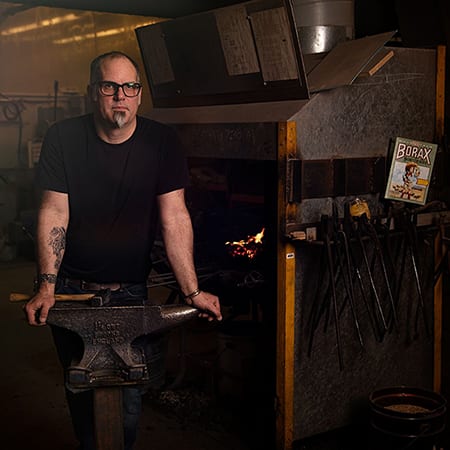
“Students come into my office and kind of poke around all the time, checking out at all the weird stuff I make, which is good. I talk to them about how this or that is done, or this is how you could make this. I like just having cool stuff on hand to show them, physically.
I didn’t learn all the things that I know how to do in a four year degree so I can’t give students everything all at once. I might see three really efficient ways to do something but I also remember what it was like for me – they need to figure out how to do some things themselves. To go through the exercise of coming up with their own solutions. That’s what I love too; that challenge.
I say to people, if they’re doing their Masters [degree] to get someone to guide you who is going to call you to account, you know, critically – someone who’s going to hold you to account on what you’re writing – someone’s who’s going to call you out about what you are making. But also find a cheerleader, too. You know, because we all need that. We all need someone to just to go, “Wow!”. And not just say it, but really mean it.
I also tell students to be really strategic about their education. You have to be an active agent in what you’re doing. You need to find the right teacher. We’re all waiting for someone to give us this whole nice package; the neat package with a little bow on top, but it doesn’t always work that way. Find out who has the skill sets that you want, or who will help you think critically about things, and then go find those people.
I am continually faced with students that are really excited when they learn new things and you remember to remain excited about what we do. I can take for granted, all these really cool things that I can make and the things that I do, or I can choose to know that I am pretty privileged to do what I do.
I’m excited. I have so many former students that have gone on to do some really great things.”
Roch Smith
Foundry/Metal Studio Technician
Dept of Visual Art and Art History, School of the Arts, Media, Performance & Design
Instagram: @rochsmith
Twitter: @_rochsmith
Web: rochsmith.com
Gallery work: oenogallery.com/artists/p-roch-smith/
Photo credit: davidgoldmanphoto.com
Roch Smith, Technician
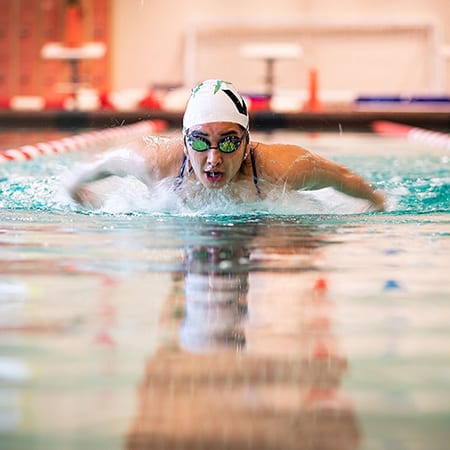
“My mom was thirteen and my uncle was twelve when they escaped Vietnam. My grandma took the two of them and they all escaped by boat. They were refugees in Thailand for a couple of months and then they moved to Canada afterwards. My grandpa on my mom’s side died in the Vietnam war when my mom was only one year old. My grandma was pregnant with my uncle.
My parents happened to immigrate to Canada in the same year, but didn’t know each other. They were part of the young people that escaped the country in 1980. About five or so years after the Vietnam war.
My dad came over with his dad, my grandpa. They were trying to escape because, both my uncle and my dad would have been enlisted in the Vietnamese army as soon as they turned sixteen. My grandma stayed back with his three younger siblings and eventually were sponsored to come over.
They all knew they wanted to leave Vietnam as soon as it fully turned communist. Canada was a fresh start for them.
My parents met in their first year of university. In Edmonton. They both graduated from the University of Alberta. They’re coming upon twenty-four years, this July.
My parents are always there and they’re always my biggest fans and my biggest supporters. Growing up, they definitely had me focused on my studies – number one. But they always told me about how they grew up, just playing sports recreationally. My parents are not the most athletically inclined but they met in their first year of University and their thing to do together was badminton on Friday nights. Like, throughout their whole degree. Friday nights were literally their only break from their seven day study schedule to go play badminton. They found so much joy in that. And then growing up, my mom was always on – she was, like, one sport onto the next. If it wasn’t swimming, “that was okay. It was like, “let’s find something else”, and she was always the one to be, like, “do you want to go on a walk,” or, “Let’s go play badminton”, “let’s go and do this or that”. She was big on always moving. So, I think that had a huge influence on me growing up. It didn’t make sense to not be active.
So now I’m a very active exercise person. Not just for sport, but I just feel like it’s really important in your life to be active and I just wanted to do more with that. Instead of have it as a hobby, I wanted to make it my life. So, I thought kinesiology was the only thing that made sense for me.
University has definitely had its ups and downs. First year was hard just because I am so used to having my parents always there – I didn’t know what it was like to be without them; me here in Toronto and them in Victoria, B.C., but I think that we’ve gotten closer because now if I want to talk to them, I have to call them. So I’m always on the phone with them and they’re always excited to hear about my life here.
But I think it’s really the little moments throughout university that make it – like my personal training clients and working with people and just seeing like how big of a difference I can make in somebody’s life. It’s a bunch of little pushes here and there. I just took a class called Exercise Therapy for Chronic Diseases and it was like – it was that course for me. I was leaning over the table, with my heart was just racing. I didn’t miss a class. It’s just little things like that, that, throughout my degree, that keep pushing me.”
Vienna Nguyen
Personal Trainer, York University Athletics and Recreation
Bachelor of Kinesiology program, graduating Spring 2019
School of Kinesiology
Faculty of Health
Photo credit: davidgoldmanphoto.com
Vienna Nguyen, Student
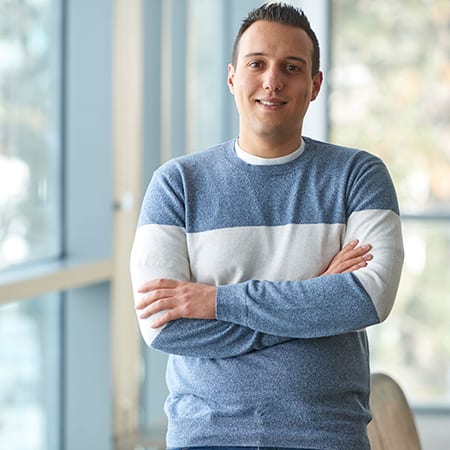
“I have been chosen to be a Supreme Court of Canada clerk in 2018. I am visually impaired student at Osgoode Hall Law School. The condition I have is called retinitis pigmentosa. The vision that I have is very narrow – like looking through a straw – and is very blurry – like a really cloudy day. The condition is genetic, but I was affected by it when I was 19. I am 29 now. Obviously, the change was drastic for me. I didn’t know what was happening to me. I started getting into car accidents. Most people can’t even tell because I don’t use a cane or a guide dog or any other assistive device.
I only go to places that I know well.
I rely on context, sound and memory to maneuver around.
Law school should be accessible even before you get into it and ideally the law school would be designed in a way that accommodations are not required. You have to accommodate people with disabilities, right? But from my perspective… would it not make more sense to remove a lot of barriers before people are affected by them?
Because, when you think about it philosophically, there are two ways you can organize universities in the context of students with disabilities.
One is a centralized system, the other is a decentralized system. A centralized system encompasses having one centre at York University for all students with disabilities.
The other end of the spectrum is the decentralized system. Let’s say, for example, at Osgoode. Osgoode is responsible for everything. You register with Osgoode as a student with a disability. All of your exams are at Osgoode and each of the students is dealt with by Osgoode.
York has blended the two. When I came up here in the summer, I had to register with the York University Centre for Students with Disabilities. Then I came to Osgoode and some stuff was provided here by Osgoode, but other stuff like reading you have to deal with York.
When you have this blended form – two systems – they start clashing with each other. In my opinion, they should pick one. I prefer a decentralized system because it’s more efficient, you can deal with issues proactively, and different faculties on campus will have different needs. Dealing with students with disabilities in a law faculty is hugely different from medicine, for example, or biology. Providing accommodations for a person in a lab is different from a law school that is not dependent on physical things like lab work and microscopes.
When every faculty has its own system, they can adapt more and they can be more proactive.
The more people with disabilities that we have at Osgoode, the more we learn from their own experiences, the more we can expand our imaginations of barriers that can affect someone.”
Abdalla Barqawi
JD Candidate (2018)
Osgoode Hall Law School
——————————————————
The above text is excerpted from an interview done for an article entitled The Winds of change are blowing: Osgoode strives to address the challenges faced by persons with disabilities, Fall 2017 Osgoode Brief alumni newsletter written by Virginia Corner.
Photo credit: Ian Crysler
Abdalla Barqawi, Student
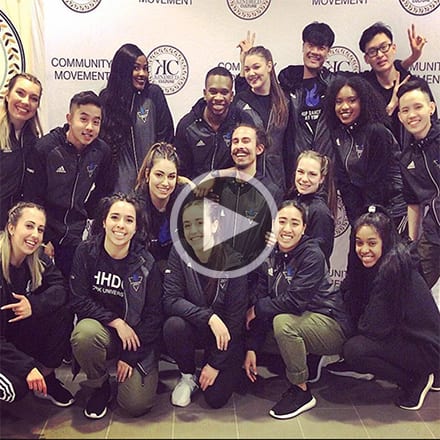
“Our whole team spiel/motto is just taking different dance styles under the umbrella of hip-hop and putting them together to create a set that is, you know, very different and multi-talented and multi-styled. The whole name, the whole point of our team is bringing together different styles and making something greater and that’s also the same thing we do with this team. We are different people who come search completely different backgrounds and different walks of life, but when you pull us all together, it’s something just really amazing and special and just really cool to see what happens when you bring such different things together.”
Integrated Entity
York University student Hip Hop dance crew
Instagram: @hhdcyork
Facebook: Hip Hop Dance Club at York
Youtube: Hip Hop Dance Club at York
*1st at Bring Your Own Beat (BYOB) Toronto Urban Dance Competition (2018)
*2nd at the Ontario Universities Competition for Hip Hop (2018)
Video credit: 4Boake Creative
Featured in this video: (L-R) James Gibbs, Jose Miguel, Tori-Lee Thompson, Samantha Hansel, Serena Finlayson, and Jopang Simakajornboon
Read Integrated Entity, York University student Hip Hop dance crew's full story
Integrated Entity, York University student Hip Hop dance crew



